


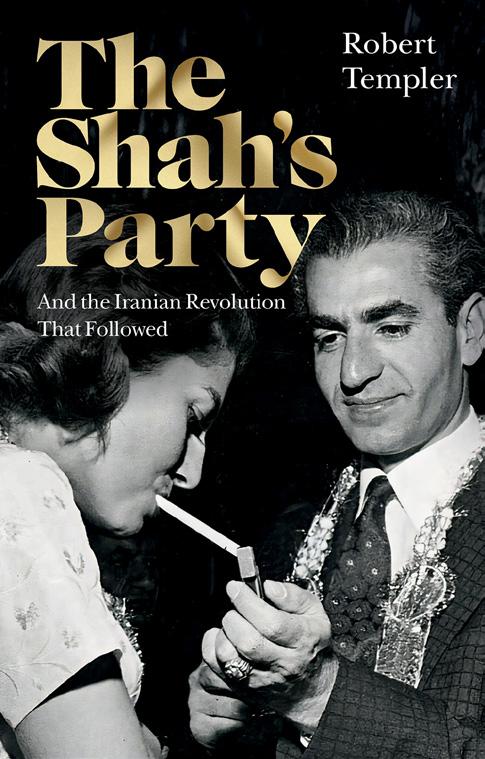





Welcome to the Hurst 2025 Frankfurt Book Fair rights list. From among our new, forthcoming and recent titles I wish to draw your attention to:
* UNBROKEN CHAINS: A 5,000 Year History of African Enslavement (Martin Plaut)
* THE BAGPIPES: A Cultural History (Richard McClauchlan)
* ORANGE SKY, RISING WATER: The Remarkable Past and Uncertain Future of the Netherlands (Nicholas Walton)
* AMERICA’S MIDDLE EAST: The Ruination of a Region (Marc Lynch)
* RETHINKING OURSELVES: Justice, Reform and Ignorance in Postnormal Times (Anwar Ibrahim, Prime Minister of Malaysia)
I also thought this was a good opportunity to mention our bestselling foreign rights titles of the last few years.
HOW TO FIGHT A WAR (Mike Martin) German, Complex Chinese, South African rights South Asian, Audio and Portuguese SHRIMP TO WHALE: South Korea from the Forgotten War to K-Pop (Ramon Pachedo) Portuguese, Italian, Korean and Turkish LITHIUM: The Global Race for Battery Dominance and the New Energy Revolution (Lukasz Bednarski), Polish, Korean, Spanish and Chinese Simplified THE STORY OF YOGA: From Ancient India to the Modern West (Alistair Shearer) Spanish, Chinese, Audiobook and South Asia
AFRICAN EUROPEANS: An Untold History (Olivette Otele) German, Portuguese, Italian, Catalan, French, Dutch, Spanish SO YOU WANT TO OWN GREENLAND? Lessons from the Vikings to Trump (Liz Buchanan), French, US (Melville House)
Please direct all Foreign Language, English and Audio rights enquiries to me in the first instance: michael@hurstpub.co.uk
Best wishes, and thanks for your support over the years.
Michael Dwyer
Publisher, Hurst
JOHN KEANE
We live in troubled times, marked by a sinister trend gaining the upper hand everywhere: a new despotism for the twenty-first century.
John Keane’s latest book rings out boldly with a powerful warning: the keyword for understanding the new threats to democracy is despotism. This peril arises not only from regimes as different as Russia, Iran, Saudi Arabia and Turkey, but also from popularly elected demagogues opposed to power-sharing, from Orbán’s Hungary and Sheinbaum’s Mexico to Netanyahu’s Israel and Trump’s America.
Keane shows why this new despotism defies the laws of political gravity. More than fear or raw force, it pursues a strange, pseudo-democratic type of government, led by rulers skilled in winning public loyalty through election-rigging, legal trickery, weaponised lying and talk of enemies. What’s more, alarmingly, these leaders hunt in packs.
But what’s so good about democracy? In prose humming with energy, Keane shows that it’s much more than popular self-government based on free and fair elections. Democracy is a collective insistence that unaccountable power is always dangerous—and it’s the best way to stop demagogues and despots from ruining life on our planet.
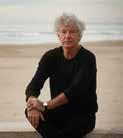
John Keane, Professor of Politics at the University of Sydney, is renowned globally for his creative thinking about politics, history, media and democracy. His books include The Shortest History of Democracy; The Life and Death of Democracy; the bestselling Tom Paine: A Political Life; and the acclaimed biography Václav Havel.
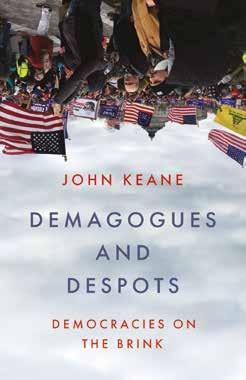
May 2026
9781805265221
190mm x 126mm
312pp
£15.99 Hardback
Politics / Current Affairs World rights
Democracy and despotism live closer together than you’d expect—in this briskly astute book, a leading political thinker reveals why that should alarm us all.
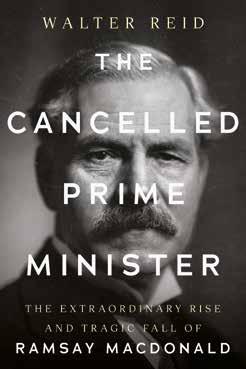
February 2026
9781805265306
234mm x 156mm
368pp, 24 b&w illus
£25.00 Hardback
Biography / Politics / History World rights
How the first workingclass politician to reach Britain’s highest office was brought down, and his legacy disparaged.
Ramsay MacDonald was born and raised an illegitimate child in Moray county, north-east Scotland. When he left school at fourteen, he seemed bound to follow in his ploughman father’s footsteps. Instead he would be UK Prime Minister—the first Labour Prime Minister, a friend of George V, and a star on the world stage. How did he get there from his Highland bothy? Why has he been erased from political memory? And how did this man of the left end up leading a Conservative-dominated National Government?
MacDonald’s was an elusive, Celtic personality; it has been easier to criticise him than to understand him. The Cancelled Prime Minister demystifies this fascinating politician, dismissing the common charge of treacherous ambition and tracing MacDonald’s personal odyssey—including half a life spent in undying grief for his wife Margaret, a remarkable feminist and social reformer lost young to blood poisoning.
History has been unkind to MacDonald, and most often written with politically hostile pens. Drawing extensively on his private diaries, this biography restores a towering figure to the record of his century, and reveals the full essence of a complex man—one not without faults, but able and honourable, with deep and widespread interests.
By the same author:
9781805260509
£25.00 hb Available now


Walter Reid is an historian educated at the Universities of Oxford and Edinburgh, a fellow of the Royal Historical Society, and the author of acclaimed books on British politics and history, including Fighting Retreat (also published by Hurst). He raises sheep and cattle in Scotland and grows olives in France.
Iconoclasm is in the air. Bitter debates rage on social media, in the press and on the streets over the proper fate of statues commemorating controversial figures, whether slave traders, imperialists or Confederate generals. It is an important question—but it cannot truly be answered if we look exclusively at this final, shameful chapter in a monument’s life.
Paul Brummell argues that statues can only be understood by exploring their changing roles throughout an entire, often complex, lifetime. Why do sponsors and sculptors choose to create figurative representations of human subjects? Does the way individuals interact with icons change their significance? What is the impact of the passing of time, as durable images outlive the worldviews of their originators, becoming relics of past regimes? Why do some people believe that rubbing intimate bronze body parts can bring luck? Can statues move, talk—or even kill? And what should we really do with those statues we no longer want?
From a colossal golden Buddha in China to a centrally heated Swedish actress, Brummell tells the vibrant story of the world’s most intriguing public monuments, from ancient times to the present.

March 2026
9781805265245
234mm x 156mm
320pp, 32 b&w illus
£25.00 Hardback
History
World rights
From sculptors to worshippers, patrons to vandals, an era-spanning, globe-trotting exploration of our complex relationship with statues.

Paul Brummell is the UK High Commissioner to Mauritius. Previously Ambassador to Latvia, Romania, Turkmenistan, and Kazakhstan and Kyrgyzstan, he was also UK High Commissioner to Barbados and the Eastern Caribbean. His books include Diplomatic Gifts: A History in Fifty Presents (also published by Hurst) and four travel guides.
By the same author:

9781787386457
£25.00 hb
Available now
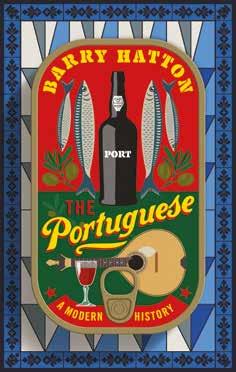
March 2026
9781805265641
216mm x 138mm
280pp, 39 b&w illus
£14.99 Paperback History
World rights excluding North America & Portuguese language
An intimate portrait of this fascinating country, capturing its contradictions and charms.
BARRY HATTON
NEW EDITION
‘Hatton clearly loves Portugal … engaging, often delightful.’ — Publishers Weekly
‘A must-read for first-timers … [and] a constant delight for those already well-versed in a fascinating nation.’ — Iberosphere
Though a founding member of NATO and the euro, Portugal is often overlooked, a small country on Europe’s southwestern edge. In The Portuguese, veteran journalist Barry Hatton blends historical insight with personal anecdotes to explore this enigmatic nation.
During the 1400s and 1500s, Portuguese explorers led Europe into the Atlantic and helped connect Asia with Europe, creating a vast four-continent empire. This legacy still resonates today, particularly through the Portuguese language, spoken by over 220 million people worldwide. Hatton examines Portugal’s vibrant yet turbulent past—from the 1755 Lisbon earthquake, which shook European thinking and began a long decline, through António Salazar’s dictatorship, to its end in the 1974 Carnation Revolution, briefly thrusting Portugal into Cold War geopolitics. Hatton also explores the country’s complex ties with neighbouring Spain, and its oldest ally, England.
By the same author:
9781849049979
£16.99 pb
Available now

With diverse landscapes, rich cultural heritage, a love of food, an easy-going lifestyle and a rebellious streak, the Portuguese are uniquely compelling. Hatton’s portrait is intimate and revealing, capturing the charms and contradictions of a fascinating country.
Barry Hatton is a British foreign correspondent in Lisbon, where he has lived for over three decades. He is the author of Queen of the Sea: A History of Lisbon (also published by Hurst).
Foreword by SIR DAVID ATTENBOROUGH
‘Delightful ... written with humour and beguiling gusto.’ — The Times Literary Supplement
‘The best travel book I have ever read.’ — The Motor
Why not? No-one had ever done it: one of the longest of all overland journeys, from the English Channel to Singapore. Several expeditions had tried. Some had reached the Persian deserts; a few, the Indian plains. But none had gone further: over the jungleclad Assamese mountains, across northern Burma, to Thailand and Malaya. It was 1955. For the final 3,000 miles, it seemed, there were ‘too many rivers and too few roads’. But no-one really knew...
They were undergraduates with no money, no cars— no nothing, except cool audacity. They wheedled and cajoled, coaxing the BBC into supplying film for a possible series; ‘persuading’ Rover to lend them two factory-fresh off-road vehicles; sweet-talking a book publisher into offering an advance. By the time they set off, their eighty-plus sponsors ranged from whiskey distillers to collapsible bucket–makers. Seven months and 12,000 miles later, two weary, police-escorted Land Rovers rolled into Singapore to flash-bulbs and champagne. Now, fifty years on, their bestseller is republished, with a foreword by Sir David Attenborough. He had given them that film, after all.

March 2026
9781805265634
198mm x 129mm
304pp, 28 b&w illus
£12.99 Paperback
Travel
World rights
Tim Slessor is a British filmmaker, presenter, traveller and author. He made documentaries for the BBC for nearly fifty years and won a prestigious Peabody Award for his journalism. He is also the author of More Than Cowboys: Travels Through the History of the American West.
Across the World , six friends made the epic journey from London to Singapore and back in two Land Rovers.

July 2026
9781805265665
216mm x 138mm
528pp, 10 b&w illus
£30.00 Hardback
Biography / Islamic Studies / History World rights
JAMIE GILHAM
Since his death in 1936, Marmaduke Pickthall’s reputation has rested on his popular English translation of the Qur’an. Drawing on a wide range of original sources, including unpublished letters and newly discovered archives, Jamie Gilham unpacks Pickthall’s eventful life and significant contributions as a British Muslim writer, scholar and campaigner.
A Great English Muslim traces Pickthall’s extraordinary journey to Islam and considers its profound impact on his life and work. Pickthall negotiated his British and Muslim identities to defend and explain Islam in the West and, later, globally. Gilham explores how Pickthall’s AngloMuslim worldview, and his complex attitudes about imperialism, race and ethnicity, fuelled his writing and campaigning—not least in his defence of the Ottoman Empire during the First World War; his denunciation of Western interference in the Middle East, including Palestine, after the Armistice; his alliance with Gandhi and support for Non-Cooperation and the Khilafat Movement in 1920s India; and his efforts to establish the Indian State of Hyderabad as the centre of Sunni Islam and seat of the Caliphate in the 1930s.
The definitive biography of British Muslim
Marmaduke Pickthall: the first person to translate the Qur’an into English, and an ardent campaigner for the Ottoman cause.
This is a fresh and comprehensive biography of an important Western convert to Islam, whose concerns, struggles and sacrifices resonate for Muslims and non-Muslims today.
Jamie Gilham is a historian of Western Islam, based in Taiwan and the UK. His books include Muslim Women in Britain, 1850–1950 (co-edited with Sariya Cheruvallil-Contractor) and Loyal Enemies: British Converts to Islam, 1850–1950, both published by Hurst; and The British Muslim Convert Lord Headley, 1855–1935.
‘A captivating blend of personal memoir and political history across time and place, by a jurist of the greatest integrity, courage and humanity. Read this to weep and to hope.’ — Philippe Sands
When the Second World War began, Theodor Meron was a Jewish-born boy of just nine. He survived ghettos, camps and unimaginable atrocities, but lost most of his family, finding sanctuary in British Palestine after the Holocaust. Now, more than eight decades later, Judge Meron is a recognised world leader in both the scholarship and practice of international criminal justice—having served as the president of three UN tribunals, delivering landmark decisions on genocide and war crimes.
This extraordinary memoir revisits Meron’s time as a legal adviser to governments, often swimming against the tide; as a restless diplomat, a boundarypushing scholar and ultimately a ground-breaking international judge. Meron has given his life to the service of justice. He is famous for his 1967 opinion finding Jewish settlements in the occupied West Bank to be illegal under international law, an opinion he issued as a legal adviser to Israel’s Ministry of Foreign Affairs. More recently, he has advised the International Criminal Court on potential crimes in the Russia–Ukraine war, and in Israel and Gaza since 2023.
The founding institutions of international justice today face unprecedented threats. Meron’s life story could not be a better timed reminder of the importance of accountability.

January 2026
9781805265238
216mm x 138mm
256pp, 16 b&w illus
£25.00 Hardback
Politics
World rights
Judge Theodor Meron CMG was born in Poland. As a child, he survived the Holocaust, but lost his home, most of his family, and years of freedom. In 1945 he emigrated to Mandatory Palestine. He holds law degrees from the Hebrew University of Jerusalem, Harvard University and the University of Cambridge.
An astonishing memoir from the Holocaust survivor who oversaw the world’s first genocide trials and has advised the ICC on crimes in Israel and Gaza.
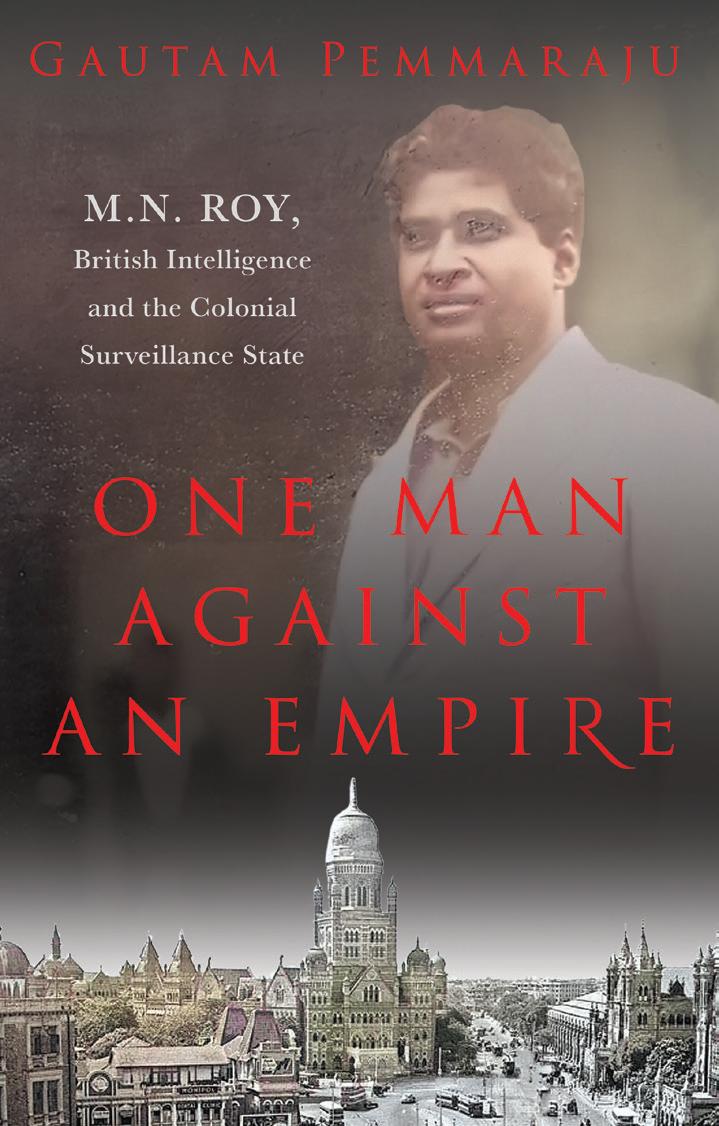
November 2026
9781805265672
216mm x 138mm
360pp, 16 b&w illus
£24.99 Paperback
Biography / History
World rights excluding South Asia
M.N. Roy, British Intelligence and the Colonial Surveillance State
The compelling story of the hunt for one enigmatic foe of the British, birthing an entire colonial surveillance network and an Empire-wide intelligence strategy.
Manabendra Nath Roy was the prime focus of British paranoia in the 1920s and ’30s. For the colonial establishment and its intelligence services, there was no greater covert threat than this charismatic revolutionary and Communist activist. From the moment he left India in 1915, seeking arms to launch a full-scale revolution against the subcontinent’s colonial overlords, he was doggedly tracked; his every move surveilled and reported. Everyone he met came under the scanner. His collaborators were harassed, coerced and bribed. His lovers were followed and harangued. There were even suggestions of early attempts to eliminate him.
Roy played a significant role in the Communist Party of Great Britain during its early years, and his influence in the imperial capital was seen as greatly inimical. Lenin and the Comintern, who bankrolled Roy handsomely in the 1920s, hoped he would galvanise the Indian proletariat and strike a mortal blow against the British Empire.
This compelling book narrates the untold story of M.N. Roy’s persistent clandestine attempts to undermine British authority through a network of agents, and the massive security establishment that thwarted his efforts in response.
Gautam Pemmaraju is a Mumbai-based writer, researcher and filmmaker, and creative consultant. He is the co-author of an authorised biography of His Holiness the Dalai Lama (with Tenzin Geyche Tethong); and editor of A Life In Shadow: The Secret Story of ACN Nambiar, A Forgotten AntiColonial Warrior by Vappala Balachandran.
The Shah’s Party captures Iran’s oil-rich boom years, before the Islamic Revolution. In 1971, eight years before the imperial dynasty fell, Shah Mohammad Reza Pahlavi and his glamorous wife, Farah Diba, hosted one of the largest ever gatherings of world leaders, celebrating the 2,500 th anniversary of the Persian monarchy. But this stranger-than-fiction event, staged in a tented city by the ancient ruins of Persepolis, triggered a rise in leftist agitation and a turn towards Islam.
Ruhollah Khomeini, then an obscure mullah living in Parisian exile, began a relentless campaign against the imperial family. A skilled populist, Khomeini tapped into growing inequalities and resentments to push his theocratic vision, particularly among those who had left the countryside in search of work. The Shah’s autocratic style played poorly in a world increasingly concerned with human rights. The Persepolis party became a symbol of Iran’s regime—not only brutally repressive, but out of touch with ordinary people’s struggles.
This is a tale of extravagance, hubris and tragedy; of a king desperate to drag his country into the modern world, yet trapped in nostalgic dreams of personal glory; and of how Iranian society’s trickle of dissent built, within a decade, into a revolutionary torrent.
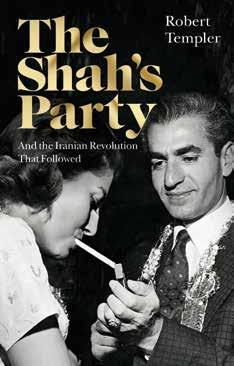
March 2026
9781805265696
216mm x 138mm
392pp
£19.99 Paperback History / Middle East Studies
World rights
Robert Templer is a journalist, writer, lecturer, and former professor and director of policy research at Central European University. As director of the International Crisis Group’s Asia programme (2001–12), he visited Iran on many occasions. His books include the acclaimed Shadows and Wind: A View of Modern Vietnam.
Colourfully narrates a bizarre three-day extravaganza thrown by Iran’s phoney dynasty, which cost $700 million and helped to precipitate the Shah’s downfall.
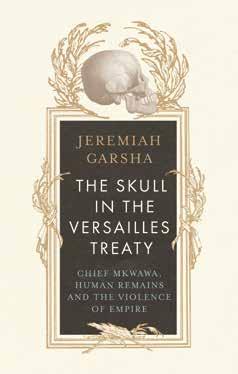
May 2026
9781805265689
216mm x 138mm
352pp, 16 b&w illus
£24.99 Paperback History
World rights
In 1891, Tanzanian Chief Mkwawa began an epic war of resistance against German colonialism. After defeating in battle the largest European force in Africa, he became the single greatest threat to Imperial Germany. When his rebellion eventually collapsed in 1898, his severed head was taken as a bounty. But his story was far from over.
In this fascinating book, Jeremiah Garsha traces Mkwawa’s life, death and afterlife through the strange history of his skull. Collected as a colonial administrator’s personal trophy, it became a German museum specimen, disappearing into the vast collections of body parts taken from across the empire. After Germany lost World War One, Mkwawa’s skull was claimed by the British, becoming the only named human remains in the 1919 Versailles Treaty. But it was never found.
How the looted skull of Tanzanian Chief Mkwawa became a tool to justify colonial power and silence anticolonial resistance.
During the decolonisation struggles of the 1950s, Britain resurrected Mkwawa’s story, bringing an anonymous skull from Germany to Tanzania to bolster its own fading empire. Today, that skull remains on display in a Tanzanian museum, a totem of anticolonial resistance. Weaving a broad tapestry of colonial violence and indigenous resistance, ‘scientific’ racism and stolen culture, Garsha’s history reveals how such ‘exhibits’ are intimately tied to legacies of empire.
Jeremiah Garsha is Assistant Professor of Modern Global History at University College Dublin, where he researches and teaches the entangled global histories of colonial violence. He is a leading expert on the colonial collection, display and return of human remains. He holds a PhD from the University of Cambridge.
This nimble tour through North Korea’s history revisits sixteen knife-edge moments when collapse, reform or war nearly shattered the Kim dynasty. Structured in four acts—from the peninsula’s partition in 1945 to Kim Jong-un’s 2020 health scare—each chapter reconstructs a crisis and asks, what if?
Regime change has come within reach far more often than we realise: defeat in the Korean War, leadership challenges in 1956, aborted coups, unrest during a currency crisis—even an armed clash with the US in the 1990s. Kim Il-sung’s acclaimed biographer, Fyodor Tertitskiy, guides readers through these events, and explores why change failed to materialise on each occasion. His narrative blends the twists and turns of palace intrigue and battlefield drama with crystal-clear dissections of ideology, institutions and greatpower competition.
Drawing on Korean, Russian, Chinese and Japanese sources, Tertitskiy offers nuance without special pleading. By tracing the decisions, miscalculations and foreign interventions that locked the peninsula into stalemate, Pyongyang on the Brink offers a swift, fresh look at deterrence, engagement and the future of millions living under the Kims’ yoke. Is North Korea truly doomed to never-ending tyranny?
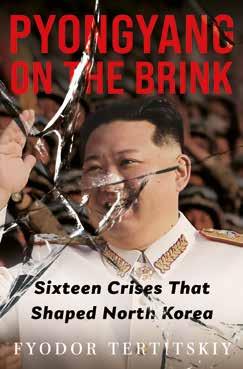
March 2026
9781805266082
190mm x 126mm
192pp
£19.99 Hardback History / Politics World rights excluding the Korean & Russian languages
Fyodor Tertitskiy researches North Korean political, social and military history from South Korea, where he has been living for more than a decade. He has authored several books in English and Korean, including Accidental Tyrant: The Life of Kim Il-sung (also published by Hurst), and The North Korean Army.
A briskly written primer on the North Korean decisions, foreign interventions and accidents of fate which have both threatened and, ultimately, preserved the country’s dictatorship.
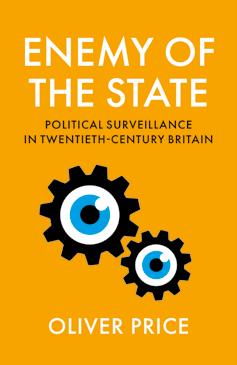
February 2026
9781805265290
216mm x 138mm 352pp
£19.99 Paperback History World rights
For much of the twentieth century, relations between Britain and the Soviet Union were defined by mutual hostility and distrust. From the Bolshevik Revolution until the end of the Cold War, the British establishment was deeply concerned about Soviet-inspired subversion, and secretly monitored thousands of its own citizens due to their real or perceived links to communism, the Soviet Union or both.
E nemy of the State reveals how Britain’s intelligence services carried out mass spying operations on the grounds of protecting democracy. Using phone taps, hidden microphones, mail interception and covert break-ins, they investigated trade unionists, scientists, politicians, actors, anti-nuclear and antiapartheid protesters, and more. But the culture of secrecy permeating British institutions has meant that the extent of these activities is little known. Drawing on recently declassified files from the British government and MI5, Oliver Price argues that while communism gained little traction in domestic politics, fear of left-wing radicalism led to the widespread monitoring of individuals and political groups—many of whom posed no threat to the British state.
Shows how state surveillance of left-wing individuals and groups was normalised in Cold War Britain, under the guise of upholding democracy.
Britain was long considered a country in which ‘political policing’ was resisted. But Price shows how the tumultuous events of the last century reshaped official attitudes and normalised surveillance.
Oliver Price is a historian of modern Britain. He completed his PhD in 2024 and has had work featured in publications including Contemporary British History; Modern British History and History Today. This is his first book.
The spiralling climate crisis demands a rapid shift away from fossil fuels. But most current approaches to decarbonisation rely on a dramatic expansion of resource extraction—exacerbating environmental degradation and deepening global inequalities. This is the paradox of the so-called green transition.
Philippe Le Billon offers a critical examination of the material and political underpinnings of climate change mitigation. Drawing on insights from political ecology, critical geography and environmental justice, he interrogates the rise of ‘climate extractivism’: the opening up of new resource frontiers and the construction of infrastructure megaprojects in the name of sustainability. From artisanal cobalt mining in the DRC to rare-earth geopolitics, and from biofuel plantations to deep-sea and space mining, he reveals how green growth agendas frequently reproduce colonial structures, social injustice and patterns of dispossession.
Scrutinising proposed solutions such as geoengineering, carbon offsets, circular economy schemes and degrowth, Le Billon shows that many climate adaptation strategies remain tethered to considerations of economic growth and geopolitical competition. Rather than rejecting the urgency of climate transition, The Great Green Grab calls for a fairer, post-extractive future— one that wholly reshapes how we produce and consume energy, and fosters a more democratic, cooperative relationship with the earth.

April 2026
9781805265719
216mm x 138mm
280pp
£25.00 Hardback Current Affairs / Environment World rights
Philippe Le Billon is Professor at the University of British Columbia. A political ecologist, he works on the linkages between environment, development and security. He is the author of Wars of Plunder: Conflicts, Profits and the Politics of Resources (also from Hurst); co-author of Oil ; and co-editor of Environmental Defenders.
A powerful critique of the Global North’s resource-hungry ‘green transition’, calling for a fundamental overhaul of our profit-driven, exploitative world order.

June 2026
9781805265726
216mm x 138mm 232pp
£35.00 Hardback
Economics / Current Affairs / Middle East Studies World rights
CHRISTOPHER M. DAVIDSON
The Biggest Company You’ve Never Even Heard Of
Bigger than McDonald’s? Yes. Toyota? Yes. Chevron? Almost. Coca-Cola? Soon. From humble beginnings as an Abu Dhabi fish farm operator to becoming one of the world’s most powerful investment giants, the International Holding Company’s meteoric rise reads like a modern business fairytale. This compelling book chronicles the breathtaking 42,000 per cent growth that catapulted the IHC from regional obscurity to global prominence under the visionary leadership of its enigmatic chairman, Sheikh Tahnun bin Zayed Al-Nahyan.
Abu Dhabi’s IHC unveils the strategic masterstrokes, ambitious acquisitions and bold partnerships that built this diversified empire. From Indian corporate alliances and Chinese tech deals to pioneering sustainability initiatives and Microsoft partnerships, readers discover how the IHC became instrumental in Abu Dhabi’s ambitious economic diversification agenda, successfully navigating complex geopolitical tensions and market volatility.
A revealing account of the power and ingenuity behind the new Gulf capitalism, through the story of its most successful company.
This remarkable narrative of modern Arab capitalism spotlights the intersection of royal influence, strategic vision and unprecedented growth ambitions. Through detailed analysis of leadership dynamics, financial performance and future strategic planning, Gulf politics expert Christopher M. Davidson reveals how this cornerstone of the UAE’s metamorphosis is poised to dominate the world stage. His book is essential reading for business leaders, prospective investors—and anyone fascinated by the Middle East’s new economics.
Christopher M. Davidson is an academic and consultant specialising in Arab Gulf states. He formerly taught at Zayed University, United Arab Emirates, and Durham University, and held visiting positions at Leiden and Kyoto Universities. His books with Hurst include the Saudi–Emirati comparative study From Sheikhs to Sultanism.
Even the most elite hackers use common technologies to steal state secrets, which help intelligence agencies to catch them. Are these hackers simply reckless, or do their operations reveal something deeper about their nation-state patrons?
Over a globally interconnected Internet, nations must constantly toe the delicate line of maintaining stability—developing shared tech protocols that they themselves must also break, in order to spy. This is the paradox at the heart of cyber espionage: states need to cooperate if they are to compete. As the US and China vie for strategic advantage through a new form of statecraft in cyber space, an intensifying cat-and-mouse game makes cyber security more difficult, more expensive and more unpredictable for us all.
Full Stack Spies examines the dynamic, interdependent relationships that hackers, cyber defenders, tech giants and nation-states forge, leverage and exploit to amass cyber power against a wide range of targets in geopolitics, global trade and finance, the armed forces, and critical infrastructure. But this jostling for cyber dominance makes spying online harder—and, more crucially, undermines long-term trust in cyber space, destabilising the foundations of digital societies.
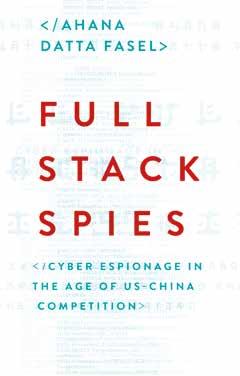
April 2026
9781805265740
216mm x 138mm
264pp
£24.99 Paperback Politics World rights
Ahana Datta Fasel is Honorary Senior Research Fellow at the Institute for Security Science and Technology, Imperial College London. A trustee at Privacy International, she previously worked in the UK’s Ministry of Justice, and advises governments and companies globally. She has written for the Financial Times and Columbia Journalism Review.
Examines how the oftencontradictory relationships between states, hackers and tech companies can undermine trust in cyber space, and complicate government spying operations.

March 2026
9781805265733
216mm x 138mm 348pp
£19.99 Paperback History / Politics World rights
Why do some former colonies fail, staggering from crisis to crisis, while others recover? Why did so many succumb to dictatorship, corruption, civil war and instability after independence?
A compelling social and political balance-sheet of empire, revealing how former colonies worldwide are still shackled by the legacies of colonial oppression.
Amal Chatterjee argues that these ‘failures’ are underpinned by persistent, robust colonial structures which preserve and reproduce the oppressive, exploitative systems of the past. From land ownership to mining, transport networks to education provision, morality to law, many post-colonial institutions function almost exactly as they did under foreign rule, with power still concentrated in the hands of elites, and inequalities baked in. Drawing on a wide range of contemporary and historical material, including memoirs, economic data and administrative documents, Chatterjee explains how empire not only made its colonies into places of extraction and exploitation, but keeps them there today. Offering a truly global account—from the British Empire to the Belgian, from Mexico to Mozambique, from the Sahel to Sri Lanka—he shows how extractive capitalism and colonialism are intertwined, and how human rights and development are hostage to the imperatives of profit-making.
The world built by empire can still be challenged and changed—but to design a new, equitable future for all, we must first understand the legacies of the past.
Amal Chatterjee is a fellow of the Royal Historical Society and teaches Creative Writing at the University of Oxford. His work includes plays; a Crossword Book Award–nominated novel; and a historical study, Representations of India. His writing has also appeared in Prospect, the Huffington Post, The Independent and others.
Located on Europe’s periphery, at the edge of Asia, Tbilisi has always been a crossroads of culture, peoples and politics. From architecture to art, protest to religion, nationalism to language, this book offers a pen portrait of the modern Georgian capital—a city where old and new live side by side in restless harmony.
Tbilisi has played an outsize role in modern global politics. Beginning in 1989, Maximilian Hess shows how the city’s experiences over the last four decades shed light on the historical, political and cultural forces shaping the world today. Momentous events in Tbilisi helped drive the collapse of the Soviet Union, and this was where the neoliberal era of the early 2000s found its firmest foothold. The city’s post-Soviet years also foreshadowed the devastation that Russian interference and aggression have now brought to Ukraine, while the rise and subsequent dominance of a Georgian billionaire-turnedpolitician have clear echoes across the Atlantic.
Delving into Tbilisi’s remarkably great influence on contemporary music and the arts, Hess showcases the intriguing capital’s entrepôt nature, and its turbulent recent history. This is a place which blurs the lines between the real and the imagined; between past and present, East and West.
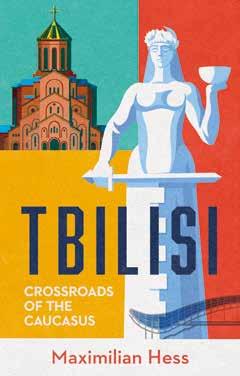
May 2026
9781805265764
216mm x 138mm
352pp
£18.99 Paperback
History
World rights
Maximilian Hess founded the political risk consultancy Enmetena Advisory, and has written for Al Jazeera, The New Statesman, the Financial Times and others. His first book, Economic War: Ukraine and the Global Conflict Between Russia and the West (also published by Hurst), won the Fletcher US–Russia Relations Book Prize.
A kaleidoscopic portrait of Georgia’s capital city since 1989.

July 2026
9781805265771
216mm x 138mm
280pp
£24.99 Paperback Politics
World English rights
In the series
NEW PERSPECTIVES ON EASTERN EUROPE & EURASIA
Edited by Dr Ben Noble

How did Putin co-opt Russia’s political and economic elites, ensuring no more than fitful resistance to the regime’s war on Ukraine?
When Moscow launched its full-scale invasion of Ukraine, the West slapped crushing sanctions on Russia. Many expected the country’s elite— prominent liberals and global businessmen—to defend their assets and cosmopolitan lifestyles by forcing Putin to stop the war. Instead, liberalminded officials rewired the economy for war; corporations obeyed new rules; and only a handful resigned or spoke out. Why?
Built on dozens of candid conversations with top Russian officials and businessmen since the mid2010s, this book dissects their moral reasoning, and how their boundaries of ethical acceptability expanded over time, in line with the expectations of their superiors. Though the Russian upper class retained formal attributes of power, in reality it lost its agency, essentially becoming a mere instrument of governance.
Alexandra Prokopenko illuminates the war’s pivotal moments: Western sanctions, mass mobilisation, the annexation of four Ukrainian regions, and Yevgeny Prigozhin’s aborted mutiny in 2023. She traces meticulously how competing factions, from technocrats to hawks, rationalised each shock and recalibrated their loyalties. And she sets this process within an inside history of Putin’s regime, analysing the transformation of mindset at individual and sociological levels. These people will continue influencing global politics; we must understand how they think and act.
Alexandra Prokopenko is a fellow at the Carnegie Russia Eurasia Center in Berlin, and has written for the Financial Times. Before the full-scale invasion of Ukraine, she was an adviser at Russia’s central bank (2019–22) and a Russian government press corps journalist, reporting from the Kremlin (2008–17).
Fourteen years before Putin launched a full-scale war against Ukraine, he waged a brief five-day war with Georgia. For Moscow, the 2008 war was an opportunity to punish its neighbour—for pursuing European and Euro-Atlantic aspirations—as well as to send a signal to Ukraine. Once the dust of war settled, international focus shifted away from Georgia. Yet, Putin’s aims remained firm, and the conflict turned into a silent war, with Russian intervention persisting below the threshold of military escalation.
From independence to the present day, Natia Seskuria examines how conflict with Russia has shaped modern Georgian politics and foreign policy, and considers what ‘war by other means’ entails in Georgia’s case. Drawing on sources in Georgian, Russian and English, as well as interviews with politicians and senior decisionmakers both Georgian and Western, she explores the country’s dilemma: pursuing its foreign policy ambitions while constrained by geographic proximity to Russia.
This comprehensive analysis of political developments in post-independence Georgia traces the evolution of Georgian statehood and the growing sophistication of Russia’s coercive strategy. Seskuria’s nuanced and probing account centres Georgian agency, and exposes the mechanisms of Russian interference and influence.
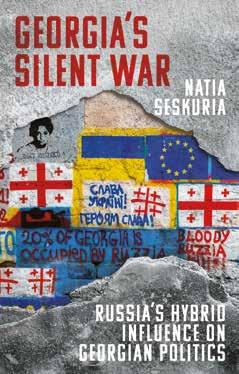
June 2026
9781805265788
216mm x 138mm
312pp
£30.00 Paperback Politics
World rights
In the series NEW PERSPECTIVES ON EASTERN EUROPE & EURASIA
Edited by Dr Ben Noble

Natia Seskuria is Associate Fellow at London’s Royal United Services Institute; Visiting Fellow at Harvard University; and the founder of a Tbilisi-based thinktank, the Regional Institute for Security Studies. She advises various governments on international security issues, regularly appears on the BBC and CNN, and writes for Foreign Policy.
From the Rose Revolution to Ukraine today, an indepth analysis of Russia’s strategy toward Georgia— and the story of a war that never truly ended.
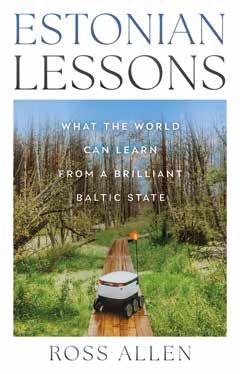
May 2026
9781805265757
216mm x 138mm
256pp, 32 colour illus
£20.00 Hardback
Politics / International Relations World rights
Near the top of most international league tables comes a surprising name: Estonia. This small country has many brilliant achievements to its name which can and should inspire the rest of the world: top globally in both environmental performance and human rights; the biggest per capita supporter of Ukraine; second globally in digital government; home to more tech unicorns per capita than any other state; and boasting the best exam results in Europe. Estonia has the best tax system (seven years in a row!) and the world’s most performed living classical composer. All underpinned by a deep commitment to freedom.
Ross Allen, UK Ambassador in Tallinn and a fluent Estonian-speaker, explores how this country has come to excel in so many fields, and what the rest of the world could learn from it. He offers insights from his diplomatic work, but also shares his embrace of local culture, from song festivals to smoke saunas. Having travelled across Estonia’s towns, villages, islands and bogs, his understanding of and enthusiasm for this relatively obscure country shine through.
An intimate portrait of Estonia and all things Estonian from the UK’s ambassador, as entertaining as it is informative.
With elements of travel, history, geography and international politics, this highly enjoyable book will make you see Estonia and the Baltics in a new light.
Ross Allen is a career diplomat who has been UK Ambassador to Estonia since June 2021. He formerly held posts in New York, Washington DC and Jerusalem; in the UK Cabinet Office and Foreign Office; and in the banking sector. He holds a Theology degree from the University of Cambridge.
How did a simple boy from the Hungarian countryside end up leading political life in his country for decades? How, as Prime Minister of a small Central European state, did he become one of the most influential illiberal rulers in the world? How and why did Hungary turn into a neoauthoritarian laboratory? And what geopolitical game is Viktor Orbán playing between continental alliances and global powers?
This book is a political biography of Orbán, but also offers first-hand historical analysis of Hungary post-1989. What started as an imperfect, albeit fully-fledged, democracy has been replaced by a new constitutional system. Orbán’s Hungary is a constantly radicalising electoral autocracy, with two intertwined role models: Putin’s Russia and Trump’s new America.
The Orbán Enigma explains how Hungarian democratic backsliding has become a hot-button issue for the Western political community; and charts how, over the course of fifteen years, the Orbán regime has ushered in illiberal rule while maintaining Hungary’s global connections via the EU and NATO. Stefano Bottoni’s timely study reminds us that democracy dies if it loses its spirit and civic commitment.
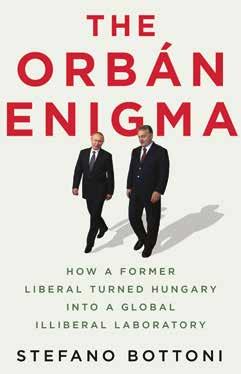
July 2026
9781805265801
216mm x 138mm
352pp
£25.00 Paperback
Politics
World English rights
Stefano Bottoni is a senior fellow at the Institute of History, HUN-REN Research Centre for the Humanities, within the Hungarian Academy of Sciences; a former senior fellow at the Institut Montaigne; and author of Long Awaited West: Eastern Europe since 1944. He holds a PhD from the University of Bologna.
Exposes the inner workings of Orbán’s Hungary and assesses how his style of politics has affected states and electorates worldwide.

July 2026
9781805265795
216mm x 138mm 280pp
£35.00 Paperback Politics World rights
In the series
NEW PERSPECTIVES ON EASTERN EUROPE & EURASIA
Edited by Dr Ben Noble

Almost a million Russians went into exile after the 2022 invasion of Ukraine. This study reveals how dissident activism continues in the face of repression.
This book captures the largest post-Soviet exodus in Russian history, triggered by the 2014 annexation of Crimea and the full-scale invasion of Ukraine in 2022. Through hundreds of interviews, the authors trace the journeys of those who fled Russia—crossing the steppes of Kazakhstan, the mountains of Armenia and Georgia, and even the Atlantic—in search of safety, belonging and peace.
Rejected by their homeland and confronted by global suspicion, these wartime exiles face the challenge of defining what it means to be Russian in an era of war and authoritarian retrenchment. Many turn to action as a path forward: mutual aid, support for Ukraine, anti-war activism. For others, survival is the priority.
Set against the backdrop of a shifting global order—renewed Great Power politics, tightening borders and migrant fatigue— Sudden Departures gives voice to a diaspora in motion. These stories offer a rare ground-level lens on exile, resistance and the high personal costs of standing against Putin’s regime.
Margarita Zavadskaya is a senior research fellow at the Finnish Institute of International Affairs. Andrei Semenov is Assistant Professor of Political Science and International Relations at Nazarbayev University. Regina Smyth is Professor of Political Science at Indiana University.
Indigenous to Central Asia, Karakul sheep can thrive in the region’s arid environment. For centuries, men across Muslim Asia and Russia wore hats made from the sheep’s fur, which often symbolised status and masculine power. In the late nineteenth century, the thirst for furs among fashionable women in Europe and America saw millions of Karakul lambskins change hands annually, in Leipzig, London and New York. In the early twentieth century, the Russian Revolution led shepherds and merchants to flee Central Asia for Afghanistan; over the following decades, the trade in Karakul lambskins—initially referred to in the West as ‘Persian Lamb’ or ‘Astrakhan fur’—became a central element of Afghanistan’s economy.
In this unique book, Magnus Marsden illuminates Karakul’s role in the region’s globalisation, drawing on rich archives, three decades of research in Afghanistan, Pakistan and Central Asia, and interviews with fur traders and their families. He discovers that Jewish and Muslim Central Asian merchants played a pivotal role in the trade’s international expansion, demonstrating remarkable resilience in an environment growing ever more hostile to the long-distance commercial networks which they formed.

May 2026
9781805265825
216mm x 138mm
364pp, 24 b&w illus
£35.00 Hardback
History
World rights
Magnus Marsden is Professor of Social Anthropology and Director of the Asia Centre, University of Sussex. He has conducted decades of research in Afghanistan, Pakistan and Central Asia. His books include Trading Worlds: Afghan Merchants Across Modern Frontiers, and Beyond Swat (co-edited with Benjamin D. Hopkins)— both published by Hurst.
A history of the fur trade originating on the Karakul sheep–raising steppe, and of the merchants who took the pelts to markets worldwide.

May 2026
9781805265818
216mm x 138mm 336pp
£30.00 Paperback History World rights
These days, it’s rare for news items to come out of Turkmenistan. It can be easy for us to assume that the country was always isolated, quirky or even irrelevant. But its real history paints a wildly different picture.
Turkmenistan’s desert-dominated landscape has been an unheralded flashpoint at many key moments in history, whether as an integral but misunderstood part of the Soviet Empire, or as a major strategic prize in the brutal invasions of Genghis Khan. Sat exactly where East met West, yet often aloof from both, Turkmenistan was a key crossroads on the Silk Road, and once hosted the largest city on Earth, which doubled up as one of the world’s great seats of learning. It lays claim to conjuring up the world’s first monotheistic religion, and it may well have been one of the major players in that elusive turning point of history, the birth of civilisation—up there with Mesopotamia, Egypt and the Indus Valley.
No other nation can claim all of this, yet Turkmenistan’s past has long remained hidden from our understanding. This is the extraordinary story of a starkly beautiful land, its unique culture, and the wonderful people who now call it home.
Reclaiming Turkmenistan from the margins of global attention, Hein offers a lively history of the ‘Mother of the World’ and its people.
Olivier Hein is a Mauritian-British author, whose books include Star and Key: The Historical Adventure of Mauritius and Borneo: The History of an Enigma (both published by Hurst). Formerly a UN, UK and OSCE diplomat posted to New York, Paris, Ashgabat and Pristina, he is now based in the Cotswolds.
ROBERT
As the armies of the East India Company were busy transforming Britain into a territorial and ruling power, laying the foundations for the imperial Raj, an artistic ‘Scramble for India’ was taking place.
Art, Ambition and Empire tells the story of the remarkable but little-known artistic encounter between Britain and India in the closing decades of the eighteenth century. Between 1769 and the early 1800s, more than sixty British-based artists made the long voyage east. Among them were some of the finest painters of the Golden Age of British art: the portrait painters Tilly Kettle and Johan Zoffany, the landscape artist William Hodges, and the miniaturist Ozias Humphry. Between them, this quartet would produce an extraordinary record of Indian life and landscapes, of Company merchants and military men, and of the courtly world of princely India. The rewards were spectacular, but, as they soon discovered, there was also a personal and a professional price to be paid.
Why did these four artists go to India? How did they respond to the place and represent it in their work? And what role did they play in shaping perceptions of the subcontinent, during one of the most controversial periods of British imperial expansion?

April 2026
9781805265276
234mm x 156mm
448pp, 64 colour illus
£30.00 Hardback
History / Culture / Art World rights
Robert Baxter was born and educated in the United Kingdom, where he read history at the University of Exeter. He has lived and worked in Asia for almost forty years, mostly in Hong Kong. A frequent traveller in the region, he has wide-ranging interests in art, history and crosscultural encounters.
Following the lives of four artists, a beautifully illustrated account of Britain’s artistic interactions with India at the height of the Raj.

February 2026
9781805265283
216mm x 138mm
288pp, 8 b&w illus
£19.99 Paperback History
World rights
Between 1857 and 1947, over 28 million Indians left the subcontinent to live, work and study elsewhere. Today, India has the largest diaspora in the world, with approximately 18 million Indians living overseas. Though often absent from historical narratives, migrant children were instrumental during the time of the British Empire in the development not only of Indian national and diasporic identities, but of British identity too. These children were marginalised by their political status, their race and their age; yet they were fundamental to historical change, from the 1830s through to independence in 1947.
From the Victorian era to Partition, Mukherjee uncovers the unique experiences of the very youngest South Asian migrants to Britain.
Imperial Footprints vividly charts this history of emigration from British India to the imperial heartland, through the eyes of its youngest participants. From pupils sent to English boarding schools and runaway servants, to sailor children and refugees of war or Partition, Sumita Mukherjee reveals that these child migrants were crucial players in founding Indian communities abroad. Drawing on archival records and firsthand accounts, she offers a portrait of migration to Britain that pre-dated the larger waves of arrivals post-war.
Imperial Footprints challenges the assumptions of the historical voices we often foreground; reflects on post-colonial legacies; and offers a fascinating new perspective on migration and empire.
Sumita Mukherjee is Professor of Modern History at the University of Bristol. A fellow of the Royal Historical Society, she is an expert on the histories of South Asian migration and has written widely on this topic. Her books include Indian Suffragettes: Female Identities and Transnational Networks.
While Britain’s empire decolonised after the Second World War, one more colony was created, in secret and against international law: the British Indian Ocean Territory (BIOT). This founding, in 1965, dismembered sixty Indian Ocean islands within the then British colonies of Mauritius and Seychelles. The entire population of these islands was forcibly displaced to make way for AngloAmerican military facilities.
Ostensibly, the new territory was first created to house a communications station on Diego Garcia. But BIOT’s utility went far beyond this specific purpose: it facilitated the transfer of strategic power from the UK to the US in the new Cold War world. Samuel Bashfield’s eye-opening account illuminates how British and American defence strategies each shaped BIOT’s militarisation, with the territory used both by London—to slow its withdrawal ‘East of Suez’—and by Washington, to entrench its own power in the Indian Ocean and the Middle East.
Diego Garcia did not become one of the West’s critical overseas bases by chance. It was painstakingly honed as a linchpin of Western predominance. Drawing on declassified archives, Bashfield reveals how BIOT was selected, militarised, transacted and defended, from its illegal creation through to the end of the Cold War.
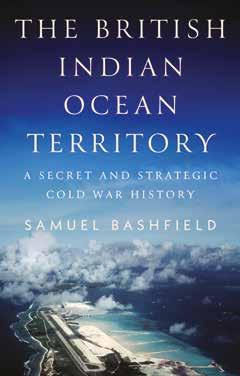
May 2026
9781805265849
216mm x 138mm
352pp
£35.00 Paperback
History
World rights
Samuel Bashfield PhD is an Australian-based consultant, historian, and defence and national security researcher. He is currently a research fellow specialised in security and geopolitics at the Australia India Institute, University of Melbourne.
A vital investigation into the mysterious events behind the surreptitious, illegal creation of a British colony in 1965—just as the United Kingdom decolonised elsewhere.
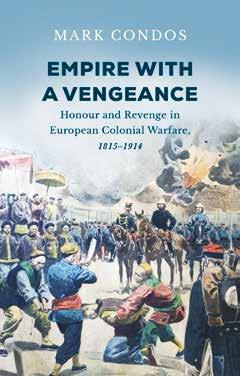
April 2026
9781805265832
216mm x 138mm
448pp, 16 b&w illus
£35.00 Paperback History World rights
Today, the use of military force to punish enemies is strictly prohibited under international law. It is also a widely accepted principle that acts of vengeance and reprisal have almost no legitimate place in warfare.
Throughout much of Western history, however, punishment and retaliation were not only important aspects of conflict, but were key justifications for waging war in the first place—particularly when it came to the defence of national honour. European empires were no exception to this rule. Throughout the nineteenth and early twentieth centuries, two of the world’s most formidable powers, France and Britain, regularly framed wars of conquest and counterinsurgency using the language of justice and revenge. Whether to avenge alleged insults, punish perceived transgressions, or exact retribution for ‘crimes’ committed against the dignity and authority of Europeans, ‘honour’ was used as a legal, religious and moral rationale for violent expansion, consolidation and policing.
An absorbing new history of European colonialism, showing how ideas of retribution and revenge were used to justify violent conquest and rule.
Based on extensive archival research in multiple languages, Empire with a Vengeance is the first comparative examination of honour and revenge in colonial policy. Showing the central importance of these seemingly archaic concepts, it offers crucial insight into the brutal dynamics of empire’s ‘civilising mission’.
Mark Condos is Senior Lecturer in Imperial and Global History at King’s College London, where he researches and teaches the history of the British and French Empires. He is the author of The Insecurity State: Punjab and the Making of Colonial Power in British India.
(eds)
Lebanon is in freefall. Poverty is rising exponentially, healthcare is at breaking point, corruption is rampant, and educated professionals are leaving the country in droves. How did this happen?
Lebanon: Anatomy of a Collapse explores the unravelling of the Lebanese state. Bringing together industry experts and academics, this timely collection analyses the complex and interconnected crises that have driven Lebanon into the abyss, whether political or social, financial or legal. With a clear and compelling narrative, the contributors highlight the economic mismanagement, infrastructure devastation, and government, educational and media breakdowns that have left the country in ruins. From the financial collapse of 2019 to the 2020 Beirut port explosion, and from the latest Israel–Lebanon war to the disastrous repercussions of the Syrian refugee crisis, this volume reveals the compounding effects of systemic failures, historical fractures and political ineptitude. It also examines the struggles of Lebanese society to maintain a semblance of institutional life and functionality, despite widespread disruption and chronic uncertainty.
This is an urgent and nuanced perspective on Lebanon’s tumultuous recent years, offering crucial insights for readers seeking to understand and learn from the calamitous implications of state failure. Can Lebanon recover from the traumas of its past?
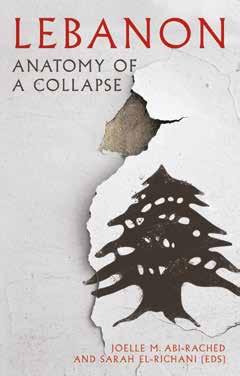
June 2026
9781805265863
216mm x 138mm
320pp
£25.00 Paperback Middle East Studies World rights
Joelle M. Abi-Rached is Associate Professor of Medicine at the American University of Beirut, and author of ʿAṣfūriyyeh: A History of Madness, Modernity, and War in the Middle East. Sarah El-Richani is Visiting Fellow at Freie Universität Berlin’s Institute for Media and Communication Studies, and author of The Lebanese Media.
From leading experts on Lebanese politics and society, a comprehensive account of the country’s descent into chaos since 2019.

June 2026
9781805265856
234mm x 156mm
320pp
£40.00 Hardback
History / Middle East Studies World rights
EAMONN GEARON (ed.)
Foreword by EUGENE ROGAN
In December 1916, a modest Arabic-language book rolled off the presses in Cairo—one that could challenge everything we thought we knew about British intelligence and Arab nationalism. Thawrat al-Arab, the longest piece of British propaganda from the First World War, has been hiding in plain sight for over a century.
The first English translation of this revolutionary 1916 text, an unlikely collaboration between Arab intellectuals and British wartime intelligence.
This first English translation reveals an extraordinary collaboration—between Arab intellectuals and British Military Intelligence— which revolutionised wartime information operations. Commissioned by the legendary Arab Bureau and written by Lebanese journalist As‘ad Daghir, this early work of Arab nationalism masterfully weaves together history, political analysis and emotional appeals for independence from Ottoman rule. Although its publication advanced British strategic interests, Thawrat alArab was far more than simple propaganda: it allowed authentic Arab voices to speak to Arab audiences. Between its dedication to the ‘martyrs’ hanged by Ottoman authorities and its sweeping vision of Arab greatness, this remarkable text shaped the narrative of the Arab Revolt.
A compelling companion to Gearon’s The Arab Bureau, which offers a fresh look at Lawrence of Arabia’s intelligence unit in light of Thawrat al-Arab, this new book brings a crucial historical document to English-language readers for the first time.
Eamonn Gearon is a global historian, specialising in the Middle East and North Africa and the history of intelligence, whose books include The Arab Bureau (also published by Hurst). His doctoral research uncovered previously unknown Arabic documents which shed new light on British intelligence work in the region.
Today’s global security environment is characterised by great power contests. As we know from previous histories of strategic competition between states, such heightened rivalry routinely manifests in violence perpetrated by proxy forces—a dynamic intended either to avoid war, or to assist in its prosecution.
This book explores the use of proxies in arenas of international strategic competition characterised by force. It looks at why, where and when proxy warfare is waged, examining how states seek to employ proxies, to cajole them to act on their behalf, and then to ensure their compliance. Today, states wishing to avoid war, yet still to pursue competition, often turn to proxy warfare as an attractive low-cost option. This policy response is informed by history, from Europe’s Napoleonic-era competition and the Great Game during the age of empire, to interwar competition in East Asia and, later in the twentieth century, the global Cold War.
Proxy warfare is not the preserve of major powers, but a tool of statecraft available to all. Andrew P.Maher illuminates current trends, deriving a strategic logic to the proxy wars that will continue to influence today’s geopolitical competitions— and tomorrow’s.

June 2026
9781805265894
216mm x 138mm
352pp
£35.00 Paperback War Studies World rights
Andrew P. Maher PhD is Senior Lecturer at UNSW Canberra, specialising in irregular warfare and special operations, particularly proxy warfare. A twenty-year veteran of the Australian Defence Force, who served extensively in Iraq and Afghanistan, he has taught at Arizona State, Joint Special Operations and NATO Special Operations Universities.
A novel examination of interstate competition, considering how and why states employ proxies to perpetrate violence on their behalf.

November 2025
9781805264989
216mm x 138mm
312pp
£14.99 Paperback
Current Affairs / International Relations / War Studies World rights excluding the Finnish language
A Financial Times Politics Book of the Year
‘A blistering account of our defence shortcomings.’ — Edward Lucas, The Times
‘Richly documented and persuasively argued.’
— The Spectator World
‘A powerful warning.’ — iNews
‘Elegantly weaves together isolationism in the United States, failures of Europe’s leadership, and the collective naivete of the West in understanding the imperialist threat of Putin’s Russia.’ — Foreign Policy
‘Timely and excellent.’ — The Australian Financial Review
‘A powerful and urgent analysis of Europe’s looming security challenges—this book is a wake-up call for anyone who cares about the future of the continent.’
— Eliot Higgins, Director and Founder, Bellingcat
Russia is intent on attacking beyond Ukraine. Can Europe defend itself?
‘Giles has been warning us for many years of Russia’s determination to … rebuild an empire. Now he offers a stark warning for Europe and the world: the only alternative to planning for a war is planning to lose it.’ — Anne Applebaum

Keir Giles has advised governments worldwide on the Russian threat. A senior fellow with Chatham House’s Russia programme, and Director of the Conflict Studies Research Centre, he is a regular commentator for the BBC and international media. His prescient books include What Deters Russia and Moscow Rules.
Foreword by SATHNAM SANGHERA
‘An essential contribution to scholarship on the British Empire. This is an important book for our times.’ — Kavita Puri
‘The Truth About Empire is for those wanting more, and something approaching the definitive response to those arguing for a sympathetic view of the empire.’ — The Journal of Imperial and Commonwealth History
‘In a time of harmful, government-backed mythmaking about the past, The Truth About Empire offers important assurance of the value of and need for … expertise and dialogue … historians patiently, and devastatingly, prove the scholarly malpractice behind recent ideologically motivated attempts to whitewash the past. A lesson in the follies of peddling, and trusting, bogus history.’ — Priya Satia
‘A masterclass in historical scholarship.’ — Australian Book Review

Alan Lester is Professor of Historical Geography at the University of Sussex and Adjunct Professor of History at La Trobe University. He has written eleven books on British colonialism, most recently Ruling the World: Freedom, Civilisation and Liberalism in the Nineteenth-Century British Empire; and Deny and Disavow: The British Empire in the Culture War (co-authored; 2nd edition).

July 2026
9781805265900
198mm x 129mm
400pp
£15.99 Paperback History World rights
Sharp, authoritative essays on the dark realities of Empire and the true historian’s importance for democracy, amid history’s appropriation by apologists, racists and culture warriors.
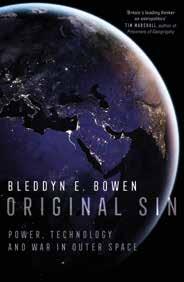
June 2026 • 9781805266075
216mm x 138mm • 424pp
£16.99 Paperback War Studies
World rights excluding the Simplified Chinese and Polish languages
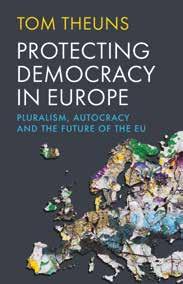
May 2026 • 9781805266020
216mm x 138mm • 272pp
£18.99 Paperback Politics / Europe World rights
‘A comprehensive and thorough account of the particular “fall” of developing space-related technologies with military uses.’ — Lawrence Freedman, Foreign Affairs
‘Convincing.’ — New Scientist
‘Britain’s leading thinker on astropolitics.’ — Tim Marshall
Bleddyn E. Bowen is Associate Professor in Astropolitics at Durham University. The internationally recognised author of War in Space, he has advised on space policy for institutions including the UK Parliament, the UK Ministry of Defence, the European Space Agency, the Japanese Ministry of Defense, and the Pentagon.
‘By far the best work on the EU’s “rule of law crisis”. Theuns puts the focus where it should be, on how to restore democracy.’ — Prof. Kim Lane Scheppele, Princeton University
‘The cancer of far-right nationalism is destroying Europe. Theuns delivers a bracing diagnosis … His course of treatment is bold and bitter, but indispensable.’ — Paul Magnette, President of the Socialist Party, Belgium
Tom Theuns is Senior Assistant Professor of Political Theory and European Politics at Leiden University’s Institute of Political Science, and Associate Researcher at Sciences Po in Paris. He has published widely, including in American Political Science Review, the Journal of Common Market Studies and the Journal of European Integration.
‘Much illuminating detail … Read [this] book—you may learn a lot.’ — Tony Barber, Financial Times
‘Masterly … detailed and thorough … a rigorous account of how Orbán bent an initially liberal party to his will, and how he and his acolytes have subverted institution after institution.’ — The Times Literary Supplement
‘Detailed and authoritative.’ — London Review of Books
Zsuzsanna Szelényi is a Hungarian politician and foreign policy specialist. In the 1990s, she was an activist and MP for Fidesz, then a liberal anti-Communist party. After working at the Council of Europe for fifteen years, she returned to politics in 2012, representing the liberal opposition in Parliament.
Afterword by CHRISTOPHER COKER
‘A welcome antidote to [the] myopia [of US security discourse].’ — Joint Force Quarterly
‘A remarkable achievement … provides sound perspectives, solid insights, and credible scenarios in the much broader field of security and strategic studies.’ — European Review of International Studies
‘The best edited volume on war … this century.’ — H.R. McMaster

March 2026 • 9781805265931
216mm x 138mm • 472pp
£16.99 Paperback
Politics / Europe
World rights excluding the Hungarian language

March 2026 • 9781805265993
216mm x 138mm • 472pp
£19.99 Paperback
War Studies
Tim Sweijs PhD is the Director of Research at The Hague Centre for Strategic Studies. Jeffrey H. Michaels PhD is the IEN Senior Fellow in American Foreign Policy and International Security at the Institut Barcelona d’Estudis Internacionals.
World rights excluding the Traditional Chinese language

July 2026 • 9781805265986
216mm x 138mm • 288pp
£16.99 Paperback
Politics / Middle East Studies
World rights
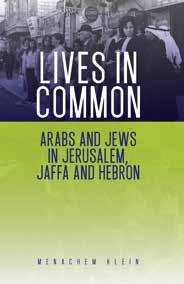
February 2026 • 9781805266037
216mm x 138mm • 360pp
£19.99 Paperback
Politics / Middle East Studies
World rights excluding the German & Hebrew languages
MICHAEL A. HOROWITZ
NEW EDITION
‘A sober and fair-minded analysis of a country at a critical juncture … well worth reading, even for the most implacable of Israel’s critics.’ — The Irish Times
‘Informative … written dispassionately and anchored in serious analysis.’ — The Jewish Voice
‘Masterly.’ — The Church Times
Michael A. Horowitz is a renowned geopolitical expert, focussing on the Middle East. Since serving in the IDF, he has held positions in consultancies in Israel and the Gulf, advising local and foreign governments, NGOs and global corporations. He writes commentary and analysis for both regional and international media.
MENACHEM KLEIN
NEW EDITION
A New Republic Book of the Year
‘A work of deeply humane scholarship … Klein is neither a hopeless romantic nor an ivory tower academic … a remarkable example of open-minded commitment to a common good.’ — The Guardian
‘Capture[s] the image of [a] lost world … sows the possibility of a different Middle East.’ — History Today
Menachem Klein is Professor Emeritus in Political Science at Bar-Ilan University. He has been a fellow at Leiden University, the European University Institute and St Antony’s College, Oxford; a visiting professor at MIT; and a visiting research fellow at King’s College London. His books with Hurst include Arafat and Abbas.
ELIZABETH PEARSON
‘Fascinating … presents nearly a decade’s worth of research into Britain’s radical right.’ — Security Women
‘A key source of empirical data and analysis … should intrigue scholars and practitioners across various disciplines, including critical race or gender studies, critical studies on men and masculinities, terrorism studies, and critical terrorism studies.’ — Behavioural Sciences of Terrorism and Political Aggression
Elizabeth Pearson PhD, formerly a BBC radio journalist, is Lecturer in Criminology with the Conflict, Violence and Terrorism Research Centre at Royal Holloway, University of London, and an associate fellow with the Royal United Services Institute and the International Centre for CounterTerrorism. She co-authored Countering Violent Extremism: Making Gender Matter.
MICHAEL LLEWELLYN-SMITH
Preface by RODERICK BEATON
‘Among a large pack of guides-cum-histories for [Athens], this should take the gold.’ — The Independent
‘Popular history at its best, absorbing, witty and challenging … a warm fondness for Athens, in all its complexity, suffuses every page.’ — The Times Literary Supplement
Exploring Athens’ streets and squares, the author reveals layers of Ancient Greek, Roman and Byzantine history; elegant neoclassical Bavarian buildings; and a modern city of concrete and glass, metro and tram.
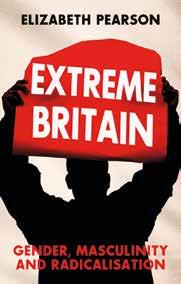
July 2026 • 9781805266013
216mm x 138mm
424pp, 7 colour illus
£16.99 Paperback
Politics / Gender Studies
World rights

July 2026 • 9781805265658
216mm x 138mm • 256pp
£19.99 Paperback
Travel World rights
Michael Llewellyn-Smith was British Ambassador in Athens in the 1990s. He has written books on Greece in Asia Minor (1919–22), the first modern Olympic Games in Athens in 1896, and the life of Eleftherios Venizelos.
Slavery has torn apart African societies since at least 2,500 BCE, from Egypt to the Cape; from Mauritania to Somalia. Yet most writing covers just one fraction of this history: the horrors of the trans-Atlantic slave trade. Historians and commentators long neglected the equally sizeable, far more protracted phenomenon of Indian Ocean slavery, and all but passed over Africa’s internal practices—from Ethiopian kingdoms enslaving conquered peoples, to the Sokoto Caliphate capturing non-Muslims on a scale matching that of the US plantations.
Yet overlooked stories of enslavement matter. In 1794, Congress authorised construction of the US Navy’s first six ships—in response to civilian vessels being seized by North Africa’s Barbary corsairs, who raided as far as Britain and the Caribbean, enslaving hundreds of thousands of Europeans. And, since abolition of the transAtlantic trade, international concern has moved from traditional to ‘modern’ forms of slavery, leaving Africans enslaved as chattel today with few champions abroad. The UN and African Union are too embarrassed to confront the African leaders still permitting this practice.
Unbroken Chains offers readers a full, accessible history of the myriad bondage systems that have devastated African communities over the millennia. It is a haunting, sensitive, powerful read.

Martin Plaut, the BBC World Service’s former Africa editor, has published extensively on African affairs. An adviser to the Foreign Office and the US State Department, he is Senior Researcher at the Institute of Commonwealth Studies.


August 2025
9781805264026
234mm x 156mm
320pp, 10 colour illus
£25.00 Hardback
History / Africa World rights
A groundbreaking new history that illuminates the full story of slavery in Africa, from Ancient Egypt to the present.
By the same author:
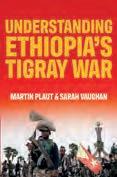

9781787388116
£25.00 pb Available now


9781787382046
£19.99 pb Available now
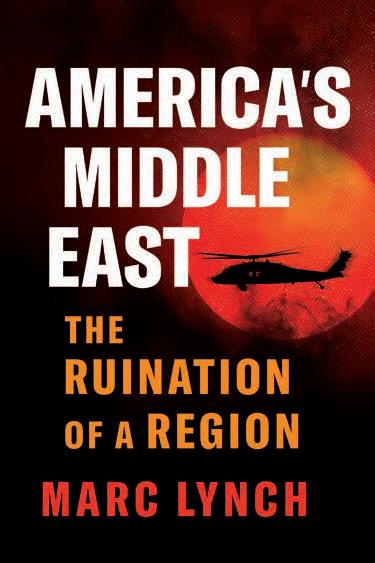

9781805264019
£25.00 Hardback Current Affairs / Geopolitics / Middle East World rights
After Hamas’ shocking attack on 7 October 2023, the United States stood firmly behind Israel’s neargenocidal war on Gaza and escalating conflicts with Lebanon and Iran—despite international and domestic moral outrage, and significant damage to its broader global agenda. How and why has Gaza become only the latest such paradox in thirty-five years of Middle East policy? What does its destruction mean for America’s place in the world?
America’s Middle East charts the United States’ disastrously failed approach to the Middle East since the end of the Cold War, as aspirations for US leadership in a calm region have instead produced political instability, armed conflict and humanitarian catastrophe. Marc Lynch exposes policymakers’ refusal to learn from repeated calamities; the failure of each president’s efforts to transform the Middle East in America’s image; Washington’s inability to pivot away from the region; its unwillingness to take seriously the views of Middle Easterners; and its consistently mistaken belief in the possibility of forging a regional order which ignores the Palestinian issue.
From the Gulf War to Gaza, a compelling analysis of how and why Washington ensnared itself in the Middle East, benefiting no one.
Marc Lynch is Professor of Political Science and Director of Middle East Studies at The George Washington University, founder of the Abu Aardvark blog, and author of The Arab Uprising: The Unfinished Revolutions of the New Middle East and The New Arab Wars: Anarchy and Uprising in the Middle East. October 2025
Moving between American politics and Middle Eastern realities, this incisive account explains why US policy has not changed despite its horrifying human costs, from Iraq and Syria to Yemen and Libya.

Few had predicted that Hayat Tahrir al-Sham (HTS), a former al-Qaeda affiliate collaborating with other rebels, could topple Syria’s Assad regime with such swiftness and determination. In this gripping chronicle, Patrick Haenni and Jerome Drevon unravel the dramatic transformation of HTS, from a besieged insurgent enclave in Idlib to architects of a new government in Damascus. Drawing on interviews with HTS leaders—including ministers, civil society figures and Ahmad al-Sharaa himself— the authors reveal the group’s pragmatic evolution. Through firsthand observation, they uncover how HTS approached religious minorities, redefined its understanding of Islamic law, navigated relations with Syria’s neighbours and confronted both alQaeda and Islamic State.
From 2019 onwards, global and local constraints prompted HTS to reshape its identity—allying with Turkey, a NATO member and secular state; coexisting with a non-radical conservative society; and embracing the lower clergy’s popular, mosquebased Islam. It also adopted a bold ‘Thermidorian’ strategy, betting on the silent majority to marginalise die-hard radicals.
This book offers a glimpse into HTS’s alternative governance model in northwest Syria, blending frontline narratives with sharp analysis to account for the group’s success as it outmanoeuvred the Assadist regime and mapped its own path to power in a war-torn society.


July 2025
9781805264101
216mm x 138mm
320pp
£19.99 Hardback
Current Affairs / Geopolitics / Middle East World rights
Patrick Haenni PhD specialises in social movements and the state in the Middle East. Jerome Drevon PhD is Senior Analyst in Jihad and Modern Conflict at the International Crisis Group and a research associate at the Geneva Graduate Institute. Both have spent many years carrying out on-the-ground research in Syria.
A
revelatory account of a reformed Islamist movement’s role in toppling the Assad regime.


January 2026
9781805264170
234mm x 156mm
256pp, 75 b&w figs
£25.00 Hardback
History / India
World rights excluding South Asia
A shrewd, unsentimental inspection of the archives, laying bare the charge-sheet against the British and their economic policy in India: the numbers don’t lie.
With colonialism debates raging worldwide, when it comes to India, a whole spectrum of Empiredefenders—apologists, cheerleaders and full-blown racial supremacists—face off against outlandish claims of trillions owed and obsessions with stolen precious artefacts. Yet where is the complete and rigorous economic case against Britain?
This book offers a comprehensive account detailing the real cost of British rule on the subcontinent: the catastrophic, centuries-long stagnation of Indian living standards. In 1947, at independence, about 400 million people in undivided India lived on less than $1,000 per year—a third of the global average income, and just an eleventh of the UK average. To reach British income levels, India would have needed to add an economy equivalent in size to half the world.
The Cost of Colonialism combines historical narratives and characters with hard data from the archives, explaining how and why India fell so staggeringly far behind during the British era, and why the British failed so spectacularly in growing the economy, when a more prosperous India would have been in their interests. Assessing what life had been like previously, under the Mughals, and how living standards improved after independence, Samir Patil delivers a damning indictment of the Empire.
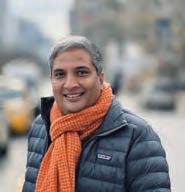
Samir Patil is the founder of Scroll.in, one of India’s most widely read and respected independent news outlets. A former associate partner at McKinsey & Company in New York, he holds a Masters in Engineering and Management from the Massachusetts Institute of Technology.
West Africa is at a crossroads. Boasting tremendous natural wealth, its inhabitants are among the world’s poorest. Despite ostensible multi-party democracy, it has suffered coups, conflict and corruption since independence. Where can it go from here?
Journeying along the coast and across the Sahel, from Ghana to Guinea-Bissau, Sierra Leone to Senegal, British-Nigerian writer Adéwálé MájàPearce uncovers a restless region on the verge of great change. Visiting fourteen countries—and seeking out the Nigerian diaspora communities in each—he reflects on the dramatic transformations that have shaken these societies since the late 1980s, when he first travelled their roads. From refusing IMF loans to rejecting Western-imposed currencies, West Africa’s diverse, expanding and overwhelmingly young population is conducting a quiet revolution, discarding its European-dominated past and seizing control of its own future. In Nigeria, anti–police brutality demonstrations have challenged an aging elite sustained by colonial enablers who never truly left. And in Côte d’Ivoire, Burkina Faso, Mali and Niger, popular resentment has forced the withdrawal of long-present French troops.
Speaking with local journalists and dissident academics, street hawkers and immigration officers, Májà-Pearce brings to life the compelling story of a region at breaking point—as told by West Africans themselves.

Born in London, Adéwálé Májà-Pearce grew up in Lagos. The author of The House My Father Built and This Fiction Called Nigeria, he holds an MA from SOAS University of London. Previously an Africa researcher for the Index on Censorship, he has written for The New York Times and Granta.
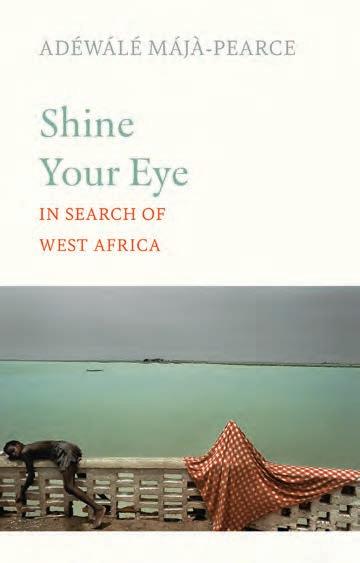

January 2026
9781805264125
216mm x 138mm
264pp
£14.99 Paperback
Travel / Africa World rights
A prominent BritishNigerian writer’s odyssey through a West Africa now starkly different from that of his youth.
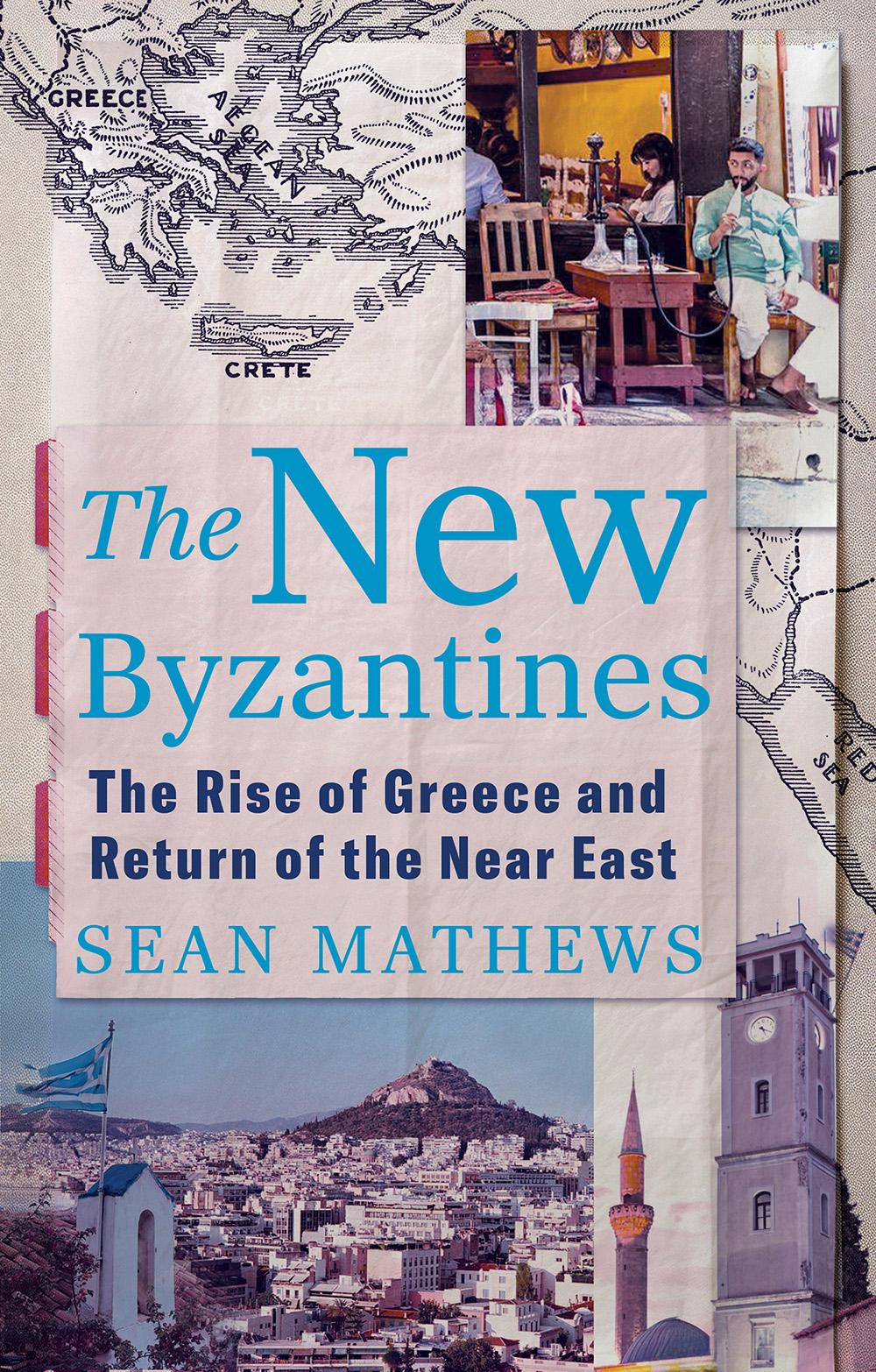

December 2025
9781805264187
216mm x 138mm
304pp, 4 b&w illus
£20.00 Hardback
Geopolitics / Reportage / History
World rights
Greece lies in a geopolitical fault-zone. Popularly considered the birthplace of Western civilisation, it is a Christian Orthodox country on the edge of the Islamic world. Politically allied to NATO and the EU, its closest cultural relatives reside to its east.
Sean Mathews reveals how Greece is being reabsorbed into the Near East. As Western Europe stagnates, Greece has emerged as a pivotal player in the Eastern Mediterranean, its economic boom fuelled by tourism and property investment— much of this from the Middle East. New pipelines are being built in its borderlands, where Turkey vies for influence. Old Mediterranean trade routes are being revived to link Europe and Asia again. Meanwhile, global conflicts are driving mass migration into this frontier state.
A fresh take on Greece’s forgotten Near Eastern past—and its enduring cultural, political and economic ties with its eastern neighbours today.
Travelling across the region, Mathews brings to life the story of a cosmopolitan melting-pot. He meets Istanbul’s surviving Greeks, insightful witnesses to Turkey’s break with the West; in Jerusalem, he explores the budding alliance between Greece and Israel; and in a faded Ottoman port, he encounters football hooligans loyal to a Russian oligarch.
This bold reappraisal of Greece’s position as a Near Eastern state shows how its Byzantine and Ottoman past can help it succeed in today’s chaotic world.

Sean Mathews is a Greek-American journalist who has covered a wide swath of the Middle East. He is a correspondent with Middle East Eye, and has also written for The Economist and AlMonitor, among others. He calls Athens home and travels often in the region. This is his first book.
Greenland is no ordinary island. From its discovery by Norsemen to its contemporary strategic significance, it has been a frontier for human exploration and empire, today emerging as a facilitator of geoeconomic competition. This book delves into the rich history and complex politics of Greenland, revealing how this icy expanse has shaped—and been shaped by—the world.
This short history begins with the Vikings, whose mysterious disappearance from Greenland in the 1400s remains one of history’s great puzzles. It then explores the island’s gradual transformation from a Danish possession to an autonomous territory, charting its role during the World Wars and its strategic importance during the Cold War.
Greenland finds itself at the centre of a renewed ‘great game’, balancing transatlantic ties, rising Chinese influence, and mounting domestic pressures for independence. And that’s before President Trump’s agenda is factored in.
Starting from Trump’s plan to purchase Greenland, Elizabeth Buchanan dissects the island’s contemporary role and poses four provocative scenarios for its future—from full independence to an icy geopolitical standoff with Denmark. So You Want to Own Greenland? is an essential read for anyone curious about the future of this frozen frontier and its place on the global stage.

Elizabeth Buchanan PhD is a senior fellow with the Australian Strategic Policy Institute. She cofounded the polar warfare programme at West Point and was head of research for the Royal Australian Navy. Her previous books are Russian Energy Strategy in the Asia-Pacific and Red Arctic: Russian Arctic Strategy under Putin.
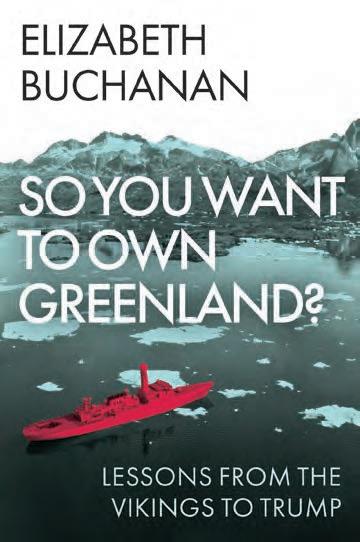

August 2025
9781805264521
190mm x 126mm
312pp
£15.99 Hardback
Current Affairs / Geopolitics
World rights
An indispensable guide to Greenland—why it matters, who covets it and why this wilderness of 56,000 inhabitants could become the next global flashpoint.
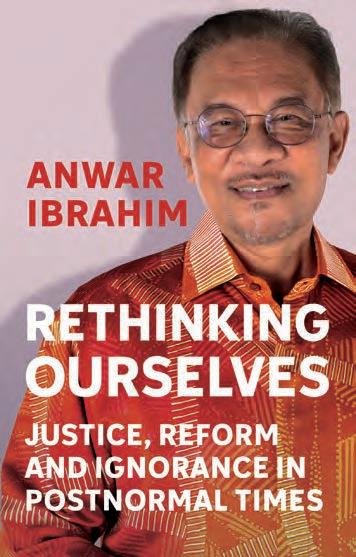

ANWAR IBRAHIM
Change has run amok! Technological advancement measures its frequency in minutes. Much of what we think we know about the world is fading in front of our eyes. How we are, how we know, and how we live our daily lives—all changing quicker than we can cope with. We find ourselves in a confusing, uncertain and volatile age.
Anwar Ibrahim, Malaysia’s tenth Prime Minister, asks how we might rethink ourselves to adjust to accelerating change, and to shape more just and sustainable futures. His passion for truth and justice is rooted in his own experience: he spent, in total, over a decade behind bars through three separate miscarriages of justice, from his days as a student activist to his time as Leader of the Opposition.
A groundbreaking exploration of justice, democracy and Islamophobia, inviting us to rethink what we know to create a more equitable future for all.
Woven through the reflections on his time in prison are critical investigations into justice, postcolonialism, Islamophobia, democracy and world order. Anwar brings together the ideas of scholars and other thinkers from the East and West, North and South, to explore how we can create a new inclusive synthesis—one that genuinely promotes good society and a just and sustainable world order. Vividly told, expertly dissected, this is a timely book for our turbulent age.

Anwar Ibrahim, Malaysia’s Prime Minister, is a public intellectual and founder of the People’s Justice Party. He endured a decade of imprisonment for his staunch anticorruption and reformist politics. Formerly based at the University of Oxford, and Georgetown and Johns Hopkins Universities, he is the author of The Asian Renaissance.
Almost everything you didn’t know you needed to know about Atlantic herrings can be found in this book. (Pacific and Baltic herrings are in there too.) Yes, they changed the world—everything changes everything—but herrings make the world bigger. With spawnings seen from space, a trillion individuals make this one of the tastiest and most abundant vertebrates on Earth.
Between ‘A Beginning’ and ‘Zuiderzee’, count the wars fought over herrings; don’t forget Scotland vs the Holy Roman Empire. The herring’s high-pitched farts were logged as Soviet submarines and received an Ig Nobel Prize. One herring joke featured in four Shakespeare plays; a Jonson; the glorious, suppressed fantasia Nashes Lenten Stuffe; and one suppressed and lost play. And what of Van Gogh’s ear? Herrings also laugh at taxonomists; physically change with sea temperature and salinity; stuff predators full to bursting, then swim away. (Well, it worked for 100,000,000 years.)
The Great Sardine Litigation? The true history of kippers? Bloaters? Reds? Chopped herring? Shuba? All this and more. Between the Herring Industry Board’s ‘Eat more herrings!’, sixteenth-century Bavaria’s ‘Herrings, herrings, stinking herrings’ and sustainable fishery genetics, every entry is a story, a comic journey, an adventure. Some even come with recipes.

Graeme Rigby’s encyclopaedia grew out of a BBC Radio 4 series on preserved fish, Rigby’s Red Herrings, and the blogs and podcasts website herripedia.com. Part of Amber Film & Photography Collective for nearly twenty years, his allotment documentary book Peaceable Kingdoms was a collaboration with photographer Peter Fryer.


September 2025
9781805264163
234mm x 156mm
400pp, 32 colour illus
£25.00 Hardback
Cultural History / Food & Drink
World rights
An all-in-one deep dive into the fascinating story of the Atlantic herring and its far-reaching dominions.
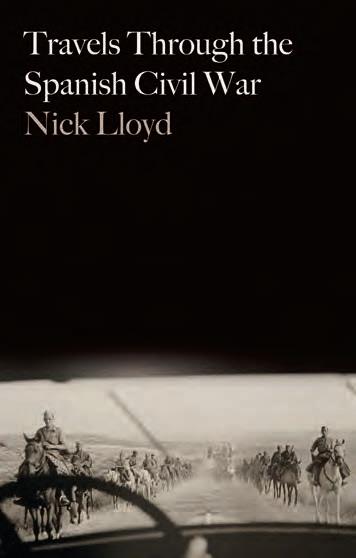

November 2025
9781805264149
216mm x 138mm
352pp, 30 colour illus
£17.99 Paperback
History / Travel / Europe World rights
NICK LLOYD
The Spanish Civil War was one of the twentieth century’s most momentous conflicts.
Nick Lloyd explores its causes and consequences through various road trips across Spain and into the rest of Europe. Setting off from Barcelona, he journeys around Catalonia and Aragón, among the last regions to fall to Franco. Visiting battle sites, museums, memorials and more, he reveals how the scars of violence still criss-cross Spain’s rural and urban landscapes. Along the way, he encounters historians, writers and descendants of Republican fighters, who bring to life the experiences of combatants and civilians alike. He tells the story of Francesc Boix, a photographer born metres from the author’s home, whose short but eventful life took him from the Catalan front to the Nuremberg witness box. In Huesca, he meets a dogged journalist working to unearth local history, while amid the rubble of Belchite, he describes the brutal street combat that destroyed the town. And on the Franco-Spanish border, he traces the journey of the refugees who fled fascism, only to be incarcerated in French concentration camps.
A revelatory journey into the physical and visual legacies of the Spanish Civil War, investigating how a brutal conflict is memorialised, and obscured, today.
As debates over ‘historical memory’ reopen deep rifts in Spanish society, Lloyd powerfully chronicles how war is remembered—or not—in Spain and beyond.

Nick Lloyd runs an acclaimed Spanish Civil War tour in Barcelona. His previous book, Forgotten Places, is an in-depth look at the conflict in that city. In addition to modern Spanish history, he has a strong interest in Iberian wildlife. He lives with his partner and children in Poble-sec, Barcelona.
WALTON
From deeply unpromising marshy beginnings, the Netherlands grew into a naval, imperial, artistic, cultural, economic, scientific, agricultural and footballing superpower. How did it get there?
Journalist Nicholas Walton paints a vivid portrait of one of the world’s most remarkable places. Drawing on interviews and his own years living in the Netherlands, as well as Dutch history and popular culture, he tells a story of floods and riots, engineering brilliance and wartime treachery. Through ten walks around their towns and cities, fields and beaches, he reveals how the Dutch built a system that organised politics and tamed the water. But now, the country faces an unpredictable future: sea levels are rising, and extreme weather is swelling the rivers that cut across this flat land. At the same time, farmers are protesting with their tractors on the streets and voters are voicing their discontent over everything from immigration and inequality to a dysfunctional housing market.
Amid the existential challenges of the twentyfirst century, Orange Sky, Rising Water asks whether the extraordinary Dutch success story can continue—or will the country, its people and its way of life be swept away?

Nicholas Walton is a journalist and hiker based in Genoa. He has worked as a BBC correspondent in Sarajevo, Warsaw and Moscow, and for think tanks including the European Council on Foreign Relations and the World Resources Institute. His previous books with Hurst are Singapore, Singapura and Genoa, ‘La Superba’.


September 2025
9781805264156
216mm x 138mm
256pp, 12 b&w illus
£18.99 Hardback
Current Affairs / Europe / Travel World rights
From climate change to far-right politics, a captivating look at the Netherlands’ modern challenges—and a homage to the timeless ingenuity of the Dutch.
By the same author:
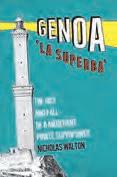





October 2025
9781805264217
216mm x 138mm
424pp
£22.00 Hardback
Smart Thinking
World rights excluding the Greek language
KOLIOPOULOS
From politicians seeking re-election, to statespeople craving spheres of influence, to business executives, military generals and sports coaches, we all employ strategy in our day-to-day activities. Strategic treatises on the art of war, politics or leadership have a long history, including those by Thucydides, Xenophon, Kautilya, Machiavelli and Clausewitz; yet, while recent decades have seen the proliferation of books on business strategy, there has still been no single volume, ancient or modern, combining all strands of the human strategic experience— until now.
The Art of Strategy encapsulates and conveys the logic of strategy in easily accessible prose, and applies it to virtually every form of human endeavour. It builds upon the existing strategic wisdom produced by the great masters to present a holistic theory of strategy that is relevant to practice: a sprightly yet sober analysis of fifty maxims, drawing on examples from chess to psychology.
Drawing on examples from sport, diplomacy, business and more, the authors explore how strategic thinking can guide clearsighted decision-making.
Platias and Koliopoulos offer the reader a guide to strategic behaviour in all areas of life, while at the same time building a comprehensive theory of victory. They provide a framework that helps the reader to understand the nature of strategy, to think strategically, and to act strategically—and successfully.
Athanasios Platias is Professor of Strategy at the University of Piraeus, the President of the Council for International Relations, Greece, and a coordinator at the Mackinder Forum. Constantinos Koliopoulos is Professor of International Relations and Strategic Studies at the University of Piraeus, and a former Fulbright scholar.
Comparing a map of Europe from 1936 with one from 1946, all the countries are there, albeit with some shifts in borders, except for three: Estonia, Latvia and Lithuania. These states disappeared during the Second World War, despite never declaring war or having war declared on them.
This book describes the theft of the Baltic states. Despite hoping to ride out the war in neutrality, like Sweden, the three countries suffered a triple occupation. A nasty and brutish, but short, Soviet occupation was displaced by a three-year Nazi occupation that was nasty and brutish in different ways. A barbarous genocide of Jews and Roma ensued. The Soviets returned in 1944 and did not leave for decades, calling into question exactly when the war really ended for the Baltic states.
All three occupations used local collaborators and achieved some degree of cooperation, but there was also a wide variety of resistance. Thousands of Baltic people fought for the Soviet Union; thousands more fought for the Nazi occupiers. The majority were conscripts or had joined under duress, but there were some willing Quislings. Kaszeta offers the reader a sober and nuanced exploration of the under-reported 1939–45 period in the Baltic states.
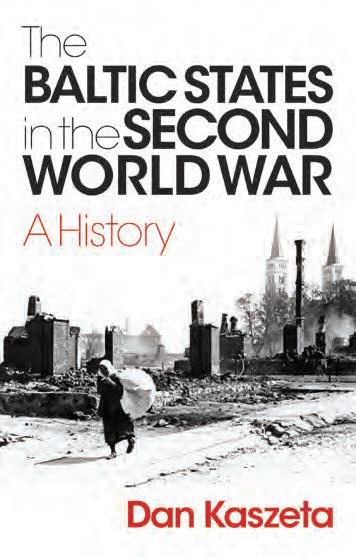

September 2025
9781805264200
216mm x 138mm
424pp
£25.00 Hardback
History / Eastern Europe
World rights
Dan Kaszeta is a specialist defence and security consultant of Lithuanian ancestry, who has long studied Baltic history. A Royal Historical Society fellow, and author of The Forest Brotherhood and Toxic (both published by Hurst), he has held positions in the US Secret Service and the White House Military Office.
This new history reveals that the Baltic States were as fiercely contested between the Germans and Russians as any flashpoint of the Second World War.


October 2025
9781805264231
216mm x 138mm
344pp, 32 colour illus
£22.00 Hardback
History / South East Asia World rights
The world’s third-largest island, and the only one administered by three different sovereign nations, Borneo is something of a mystery. Home to an incredibly diverse indigenous population, once infamous for headhunting; a hotbed of military activity during World War II; a poster child for the ecological movement even as its rainforest is destroyed; and the host of Indonesia’s planned new capital city, Nusantara—Borneo’s past, present and future are nothing if not eclectic.
But hidden under its enigmatic façade is an extraordinary island at the centre of world affairs in ancient times, yet often aloof from them. From early visitors bringing new religions to the island, to a fluctuating relationship with China, to a time when piracy ruled, Olivier Hein’s sweeping tale uncovers the little-known events that shaped not only Borneo but the whole Malay Archipelago.
Linking Indonesian, Malaysian and Bruneian history, Hein brings together, for the first time, all the elements that make this island so unique. With Borneo sitting uncomfortably in the firing line of today’s great global power shift from TransAtlantic to Trans-Pacific, and now attracting millions of visitors a year, the story of this rich and complex island has never been more relevant.
A fun and fascinating history of an island best known for tropical rainforests and captivating wildlife—but with a much bigger story to tell.
Olivier Hein is a Mauritian-British author, whose books include Star and Key: The Historical Adventure of Mauritius (also from Hurst). Formerly a UN, UK and OSCE diplomat, posted to New York, Paris, Kosovo and Turkmenistan, he also contributes to The Chap magazine. He lives with his family in the Cotswolds.
IMRAN MULLA
Abdulmecid II was a talented painter, music enthusiast and Francophile. He was also the last Ottoman Caliph, expelled from Istanbul in March 1924 when Turkey abolished the 1,300-year-old Caliphate.
From his villa on the French Riviera, Abdulmecid launched a plan to resurrect the institution and transform world history. Indian politician Shaukat Ali brokered a marital alliance between the Ottomans and the Nizam of Hyderabad, the world’s richest prince, who governed a state the size of Italy in the Indian subcontinent.
This saw the union of Islam’s two greatest houses, and of the Islamic west and east. It cemented Hyderabad’s status as a global Muslim capital, and left Abdulmecid’s grandson, the Ottoman prince and the designated Nizam-in-waiting, perfectly placed to claim the Caliphate. But Partition in 1947 and the annexation of Hyderabad the following year spelled the end of this prospect.
Exploring the lives, cultures and sensibilities of an amazing cast of players, The Indian Caliphate details this extraordinary history, which for decades has been consigned to near oblivion. This story of the downfall of two Muslim dynasties reveals a forgotten fact: that India was, in many ways, the very epicentre of the Islamic world in the early twentieth century.
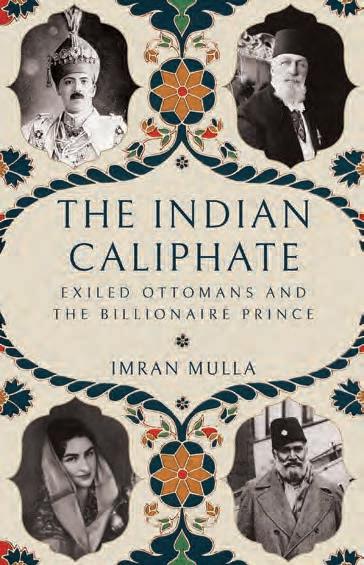

December 2025
9781805264248
234mm x 156mm
280pp
£25.00 Hardback
World History
World rights
Imran Mulla is a journalist at Middle East Eye in London, before which he studied history at the University of Cambridge. This is his first book.
The remarkable story of the last Ottoman Caliph, exiled by Atatürk, who tried to recreate the Caliphate in the Indian princely state of Hyderabad.


October 2025
9781805264224
216mm x 138mm
440pp
£22.00 Hardback
History / South Asia World rights
In February 1948, following centuries of colonial rule—by the Portuguese, Dutch and British successively—Sri Lanka (then Ceylon) gained its independence. Unlike neighbouring India, it did so peacefully; indeed, at the time, many considered it a model for emerging post-independence states, with every prospect of a prosperous and successful future. Yet, within ten years, the island nation was already experiencing its first serious open ethnic tensions, revolving around the relationship between the majority Sinhalese and minority Tamil populations.
Events like the anti-Tamil riots of 1958 both shook the nation and prefigured the wider civil war that erupted in 1983 bet ween government forces and the insurgent Liberation Tigers of Tamil Eelam (LTTE), led by Velupillai Prabhakaran—a hugely destructive conflict that raged for twenty-six years until the Tigers’ final demise in May 2009.
An indispensable political history of independent Sri Lanka, from the post-war years to the 2022 uprising.
Starting from independence and continuing up to the spring 2022 Aragalaya (Uprising)—which eventually toppled wartime Defence Secretary–turned-President Gotabhaya Rajapaksa, following hapless economic misgovernment—this book examines major events, recurring themes and underlying trends in Sri Lanka’s often fraught, contested history. While the ethnic conflict may be over, Mark Salter suggests, many of the issues that gave rise to it are yet to be fully addressed.
Mark Salter is a journalist, analyst and writer, and the author of To End a Civil War: Norway’s Peace Engagement in Sri Lanka (also published by Hurst). A former BBC radio journalist, he first visited Sri Lanka in 2002, and has lived on the island since 2019.
In the midst of the First World War, an extraordinary intelligence unit operated from Cairo’s Savoy Hotel, combining the skills of archaeologists, academics and soldiers to revolutionise how Britain gathered information and shaped events in the Middle East. Overshadowed by Lawrence of Arabia, the Arab Bureau’s true significance has remained hidden in plain sight ever since.
This fascinating study uncovers the Bureau’s remarkable story through newly discovered Arabic documents and previously overlooked archives. At its heart lies an astonishing find: Thawrat al-Arab, an ambitious Arabic-language book and the longest piece of British propaganda produced during the war. From the Arab Bulletin’s secret intelligence reports to sophisticated propaganda campaigns, the Bureau was decades ahead of its time. The team—including archaeologists fresh from desert digs and scholars fluent in local dialects— developed new methods of cultural intelligence that would influence future generations.
Eamonn Gearon’s compelling narrative reveals how this unique organisation navigated the complexities of Arab politics, tribal rivalries and Ottoman intelligence, while developing techniques that resonate with today’s challenges in intelligence-gathering. Essential reading for anyone interested in intelligence history, the Middle East or how innovation occurs in wartime, this book transforms our understanding of a crucial moment in world history.


November 2025
9781805264255 234mm x 156mm
344pp
£25.00 Hardback
History / Middle East World rights
Eamonn Gearon is an historian whose bestselling series for The Great Courses chronicle 1,400 years of Middle Eastern history; and author of The Sahara: A Cultural History, among others. He created and runs MENA area studie s training for the U.S. State Department and the UK Foreign, Commonwealth & Development Office.
A fascinating study of the British Empire’s Middle Eastern intelligence section during the First World War, drawing on government files and secret publications.
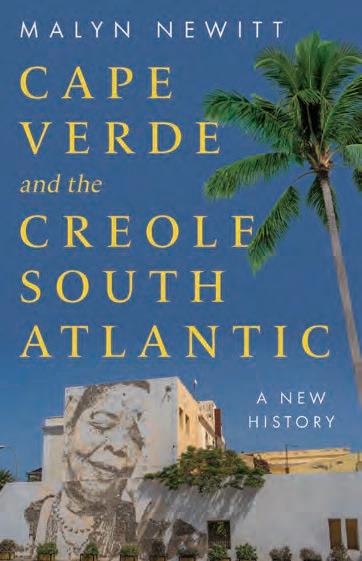

November 2025
9781805264293
216mm x 138mm 296pp
£30.00 Hardback History
World rights
The Cape Verde Islands are now a popular tourist destination but, guide books apart, there is little in print in English that covers their history and culture. This book offers a readable account not only of the islands’ past, but also of their place in the wider story of the South Atlantic’s Portuguese-speaking communities.
First settled in the fifteenth century, the inhabitants of Cape Verde were of diverse origins. Some came from Portugal, others arrived as slaves from mainland Africa, and a third element comprised Jewish exiles from the Iberian Peninsula. From the earliest days, the islanders developed a mixed Creole culture with its own Creole Portuguese language. They had close relations with people of the upper Guinea coast, where many of them settled, and with the Guinea islands. Meanwhile the archipelago became a hub of the Atlantic slave trade.
The first general history of the archipelago available in English, set within a broader regional, oceanic and global tapestry.
Cape Verde has also had a strategic importance— its history has to be seen in a global context, broader than simply that of the Portuguese imperial story. Malyn Newitt also fills a major gap in the bibliography of Atlantic history, slavery and the history of the African diaspora in the Atlantic.
Malyn Newitt, the first Charles Boxer Chair in the History Department of King’s College London, has authored more than twenty books on African and Portuguese colonial history, including A Short History of Mozambique and The Zambezi: A History, both published by Hurst.
Despite years of attempts to improve its military capabilities, Russia’s full-scale invasion of Ukraine in 2022 revealed a crippling lack of skill, discipline and equipment. Non-material factors, in particular the power struggle between military and civilian leaderships, have hindered reform of its armed forces: with officers dominating defence policy, the Kremlin has struggled to implement the necessary changes.
Kirill Shamiev explores the political reasons behind Russia’s poor military preparedness for the war in Ukraine. He demonstrates how a seemingly obedient military has frequently blocked civilian reforms, taking advantage of weak oversight mechanisms. The Kremlin’s efforts to centralise control and make the armed forces personally accountable to President Vladimir Putin harmed institutional learning, cementing a conservative civil–military status quo. While this protected the military from civil society interference and ensured Putin’s autocratic rule, it ultimately limited the pace and scope of change.
Analysing three cases of reform between 2000 and 2021, Imperfect Equilibrium offers critical insights into the relationship between civilian control and military effectiveness in Russia. Drawing on extensive qualitative and quantitative evidence—including interviews, parliamentary speeches, media reports and surveys—it shows how unchecked autonomy can undermine military development, even in authoritarian contexts.
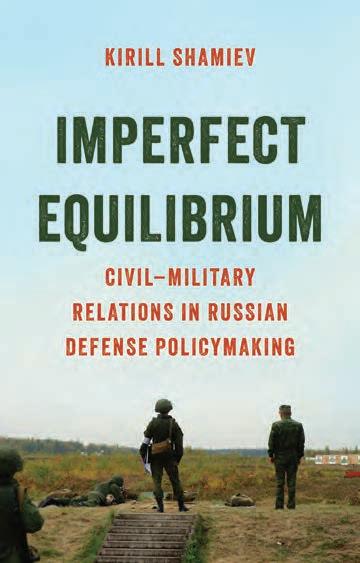

December 2025
9781805264279 216mm x 138mm
280pp
£25.00 Paperback Geopolitics / War & Conflict / Russia World rights
Kirill Shamiev is a Russian political scientist with a PhD from Central European University. A visiting research fellow at the European Council on Foreign Relations and a senior researcher at Verian, he specialises in civil–military relations, Russian domestic politics and defence affairs. He speaks Russian, English and German.
In the series
NEW PERSPECTIVES ON EASTERN EUROPE & EURASIA
Edited by Dr Ben Noble


Why has Russia’s military struggled to adapt to the challenges of contemporary warfare?
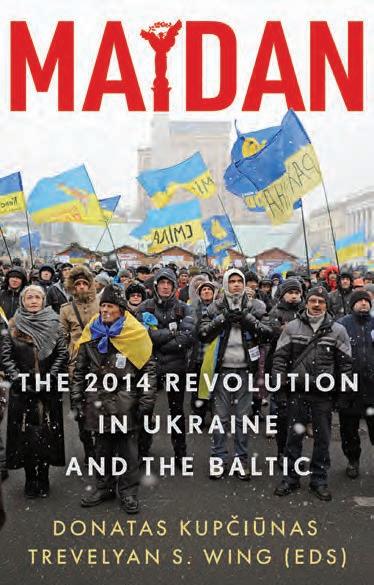

November 2025
9781805264330
216mm x 138mm
312pp
£25.00 Paperback
Geopolitics / Eastern Europe World rights
TREVELYAN S. WING (eds)
2024 marked the tenth anniversary of Ukraine’s Maidan Revolution—a landmark event in the evolution of the post–Cold War global order. What had started in late 2013 as a diplomatic showdown between Kyiv, Brussels and Moscow over Ukraine’s Association Agreement with the EU culminated in Europe’s deadliest conflict since the Second World War.
Kyiv’s bold shift towards the West in 2014 had been closely connected with the Baltic—both evolving in light of, and contributing to, policy developments in the greater region. Russia’s annexation of Crimea and invasion of Donbas triggered a rethink of security policy across this part of the continent, including defence planning, military spending, troop deployment and the region’s positioning within the Euro-Atlantic security architecture.
Explains how Ukraine’s 2014 turn to the West was intertwined with events in the Baltic states —which influenced, and were affected by, developments in Kyiv.
Maidan also reopened questions of Ukraine’s membership in, and Russia’s relationship with, NATO. Kyiv’s geopolitical reorientation further rekindled historical memory of Ukraine’s association with the wider Baltic, and inspired new thinking around a future geopolitical bloc comprising the so-called ‘lands in between’.
This volume brings together leading experts of the history, theory and practice of international relations to examine the greater Baltic’s role in, and responses to, Maidan and its aftermath— consequential developments that continue to reshape Europe today.
Donatas Kupčiūnas is Research Associate at the Centre for Geopolitics, University of Cambridge, researching NATO expansion in the Baltic during the 2000s. Trevelyan S. Wing is Baltic Fellow at the Centre for Geopolitics, University of Cambridge, researching security and defence in Northern Europe, the Baltic Sea and the High North.
PAUL LENDVAI
‘Putin has obviously deceived everyone.’ These were the words of Manuela Schwesig, First Minister of the German state MecklenburgWestern Pomerania, after the 2022 full-scale invasion of Ukraine. She was trying to explain why her federal government had been so closely implicated in Russia’s controversial completion of the Nord Stream 2 gas pipeline. Why have other German, Austrian and European politicians and commentators so often got it so very wrong in their assessments of Moscow policy? Why has the EU been so slow to recognise the danger posed to its liberal values by nationalist autocrats such as Viktor Orbán of Hungary? And why have lessons from past blunders in Western policy—particularly in the Balkans—and the example of German Ostpolitik gone ignored, until it was too late?
Paul Lendvai, a veteran reporter on the continent’s centre and east, exposes the role of double standards embraced, blind eyes turned and human and political weakness overlooked in policies of appeasement towards Europe’s authoritarian regimes, past and present. Combining analysis of new developments with decades of personal experience as a correspondent, he provides fascinating political profiles in deceit, sketching both the victims and the perpetrators of political fraud in Central and Eastern Europe.
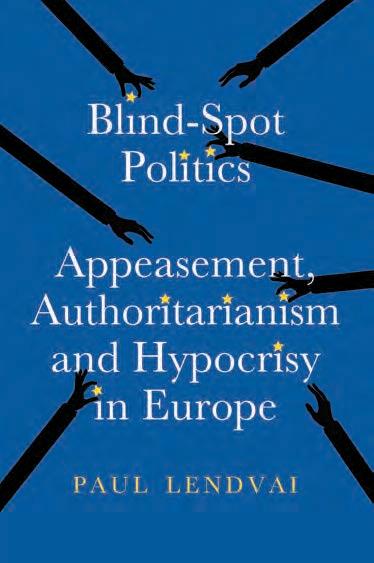

September 2025
9781805264286
190mm x 126mm
272pp
£18.99 Hardback
Current Affairs / Europe / Politics
World rights excluding the German & Hungarian languages
Paul Lendvai, a Hungarian-born Austrian journalist and author, was the Vienna correspondent for the Financial Times for over twenty years. His most recent books, all published by Hurst, are Austria Behind the Mask; The Hungarians (second edition); and Orbán: Europe’s New Strongman, which won the Prix du Livre Européen.
A leading Central European journalist investigates how political and intellectual elites in Europe’s democracies underestimate and enable the continent’s authoritarians—from the Cold War onwards.


Hardback
Security / East Asia World rights
BRAD GLOSSERMAN & DAVID S. LEE
The world is at an inflection point. In an era marked by intense geopolitical competition and rapid technological advancements, understanding and navigating the complex interplay of business, politics, security and technology has never been more essential.
Global in scope and evidence-based, Tech-Gemony illuminates how national security has been redefined in the digital age. Unique in approach, the authors combine deep policy expertise with extensive business experience to introduce a transformative concept: the ‘new national security economy’. Within this framework, the economic battlefield is the central arena of competition, in which mastery of emerging technologies will shape the future of world diplomacy and power dynamics—and, ultimately, our collective future.
Argues for a reconceptualisation of global—particularly East Asian—security, to recognise its new forms and dimensions as global power is itself being redefined.
Companies are unprepared for this new world, despite being increasingly vital participants in geopolitics. There is a need to recognise and adapt to new risks; to develop expertise, and rethink traditional approaches to risk management. This book provides practical, actionable strategies for leaders and organisations struggling with this emerging reality.
The new national security economy is a defining feature of our evolving world. Tech-Gemony provides essential guidance for individuals, businesses and governments to help them navigate this perilous moment.
Brad Glosserman is Professor at the Center for Rule-Making Strategies, Tama University, and author of Peak Japan: The End of Grand Ambitions. David S. Lee is a professor at the University of Hong Kong. He writes for the Harvard Business Review and Nikkei Asia, and previously worked at Goldman Sachs.
This book probes the phenomenon of Tunisian women recruited for jihad, post–Arab Spring. In the aftermath of the Jasmine Revolution, Tunisia—which is often deemed to have been the most successful country in its democratic transition, and which has a long history of relative gender equality—has nevertheless played host to the mass enlistment of hundreds of women as jihadists. What explains this paradox?
While much has been written about the notable presence of Tunisian female fighters in conflict zones such as Syria, we know very little about these women’s backgrounds or what drove them to join up. Through the biographies of thirty jihadist militants, Leila Ben Mcharek shines a light on the back-stories of such Tunisian women, and analyses their motivations, recruitment patterns and roles within jihadist organisations, both within and outside Tunisia.
Given the country’s transition after the Arab Spring, and the various challenges this has posed, Ben Mcharek also provides an overview of the broader political and social context of these mobilisations. Her study is an indispensable contribution to our understanding of the processes by which women, and especially Tunisian women, may become members of violent and radical Islamist groups.


January 2026
9781805264323
216mm x 138mm
312pp
£35.00 Paperback War & Conflict / Gender Studies World rights
Leila Ben Mcharek is a social scientist and consultant with a PhD from Université SorbonneNouvelle; a former researcher at the Woodrow Wilson Center, and the University of Western Australia’s Centre for Muslim States and Societies; and a former analyst for the UK’s Tunis embassy and the UN human rights office.
Why has Tunisia, widely considered an Arab Spring ‘success story’, seen such an explosion in violent Islamism among its women?
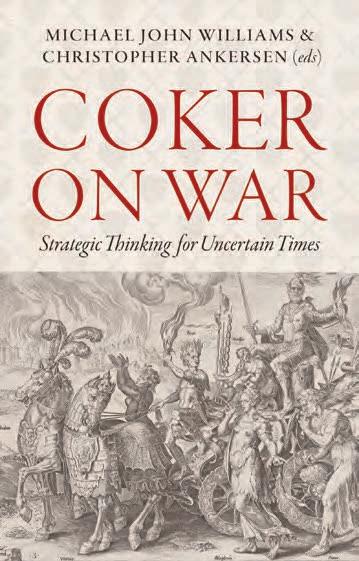

September 2025
9781805264347
216mm x 138mm 312pp
£27.50 Paperback War & Conflict World rights
MICHAEL JOHN WILLIAMS & CHRISTOPHER ANKERSEN (eds)
From the collapse of the Soviet Union and the ‘end of history’ to the rise of Islamist terrorism and the onset of the ‘war on terror’, and now finally a return to great power politics—the last thirty years have been some of the most unsettled in a generation or two. Through it all, Professor Christopher Coker’s thinking on war and strategy was among the most original and insightful. His impact on the contemporary understanding of conflict cannot be overstated.
Through his twenty-seven books, Coker’s ideas— and his captivating writing—have influenced politicians, generals and generations of scholars. This volume is an extended examination of the man and his oeuvre, written by those who worked with him, learned from him, and were intellectually inspired by him.
A homage to the late, great scholar of war, exploring his considerable legacy and engaging with questions of conflict and strategy in the same spirit.
Leading scholars will examine the implications of emerging technology in warfare; the challenges of war in an era of terrorism; the humanitarian dimension of war; and notions of war as risk management. In a homage to Coker’s engagement with literature and philosophy, additional chapters will explore how we write about war, the role or meaning of human nature in war, and the tragic in war.
Michael John Williams PhD is Associate Professor of International Affairs at the Maxwell School of Citizenship and Public Affairs, Syracuse University. Christopher Ankersen PhD is a Clinical Professor of Global Affairs at New York University. They wrote their doctorates at the London School of Economics under Christopher Coker’s supervision.
This timely monograph chronicles how Qatar transformed itself into a broker of peace in some of the world’s most intractable conflicts. In the early 2000s, Qatar made its mark by mediating an array of disputes in the Middle East. By the 2020s, it was again on the global radar for its role in highprofile ceasefires and landmark peace agreements, notably the US–Taliban deal and negotiations during the 2023–5 Gaza war.
Milton and Elkahlout offer a wide-ranging conceptual and on-the-ground analysis of Qatar’s emergence, retreat and reemergence in the international arena, tracing its evolving mediation strategies in conflicts across Lebanon, Darfur, Afghanistan and the Gaza Strip. Drawing on a unique qualitative dataset assembled through a major documentation project, the study illuminates how Qatar leveraged its diplomatic, political and economic resources to position itself as an influential third-party mediator. In doing so, it reveals both the motivations behind Qatar’s peacemaking initiatives and the broader implications of its rising profile for the changing global landscape of conflict mediation.
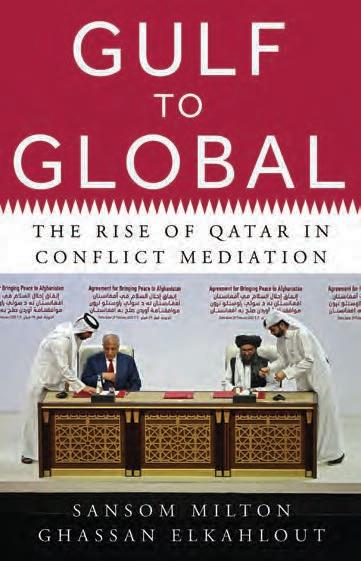

October 2025
9781805264316
216mm x 138mm
320pp
£45.00 Hardback
War & Conflict / Peace Studies
World rights
Published in collaboration with
The Arab Center for Research and Policy Studies in Doha, Qatar.
Sansom Milton is Senior Research Fellow at the Center for Conflict and Humanitarian Studies (CHS), Qatar. His research focusses on conflict mediation, post-conflict recovery and peacebuilding. Ghassan Elkahlout is Director of CHS, Qatar, and Associate Professor at the Doha Institute for Graduate Studies. He researches humanitarian policy, recovery and reconstruction.
Charts Qatar’s key role in shaping and determining diplomatic initiatives in Afghanistan, Gaza and elsewhere.
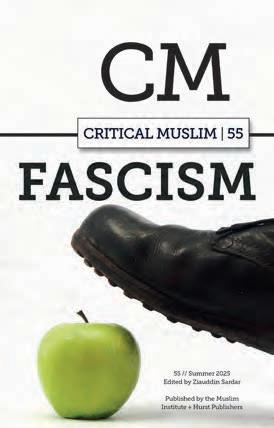

Summer 2025 • 9781805264354
216mm x 138mm • 288pp
£19.99 Paperback
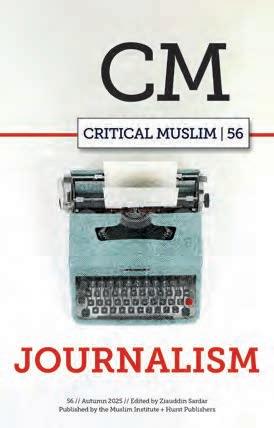
ZIAUDDIN SARDAR (ed.)
Only about a century old, fascism—bogeyman of ideologies—has been both over- and under-attributed to various political phenomena. While the baseline cases of Hitler’s Germany and Mussolini’s Italy are generally agreed upon, once these two forces were defeated, it was nigh impossible to believe that such a compulsion would ever return in a more enlightened future—let alone be ushered in by the children of those who defeated the fascist regimes. Today, card-carrying fascist forces grab ever more political power across the US and Europe, even in the European Parliament itself, and around the globe. Yet, while there’s a reason for Godwin’s Law—the longer an online conversation continues, the more likely someone is to invoke Hitler and the Nazis—we must find ways to discern the fascist wheat from the garden-variety nationalist chaff. This issue looks at today’s tidal wave, and asks how to ensure that such forces are not allowed to tear the world asunder once more.

Autumn 2025 • 9781805264361
216mm x 138mm • 288pp
£19.99 Paperback
Is journalism dead? This age-old question followed the emergence of the internet and 24-hour broadcast news, both threatening to change the game entirely. Yet nothing compares to the changes we have experienced since the mid2010s. Money is always a concern in terms of distribution, ratings and influence. Issues of bias and quality remain pressing, as we wonder, what is ‘good journalism’ in a post-truth world? Are facts really impossible to pin down while inundated with social media conspiracies, fake news, influencers and information overload? This issue of Critical Muslim asks what happened to the integrity of trusted newspapers and broadcasts; what billionaire owners of media outlets actually want; whether citizen journalism will come to the rescue, or whether social media will rule the world. Can there even be journalistic ethics to govern this new era? Or is the Fourth Estate no longer fit to print, broadcast, post, like, share or comment in our turbulent times?
‘An intellectual nonconformist, Roy has achieved something remarkable: he has written a book on identity politics that neither condemns nor embraces it, but is instead a nuanced cultural dissection of its origins and its contradictions … Proof that truly singular books do not scream their originality. [An] illuminating and highly original interpretation of today’s world … It brings order to a world not at ease with itself.’ — Financial Times
‘Something to disagree with on every page. But this makes the book more enjoyable and interesting, not less; it offers valuable provocation.’
— The New Yorker
‘Elegant.’ — The Wall Street Journal
‘Ingenious and full of intuition.’ — Tablet
‘A deep and useful take on our current predicament.’
— Compact
‘The best book on culture in years.’ — Marginal Revolution
‘Remarkable … a major achievement in Roy’s intellectual trajectory towards providing an original and holistic theorization of the modern world.’
— Philosophy Now

Olivier Roy is Professor at the European University Institute in Florence. Six of his highly acclaimed books on religion and politics are published by Hurst, including Globalised Islam; Jihad and Death; Holy Ignorance; and Is Europe Christian?
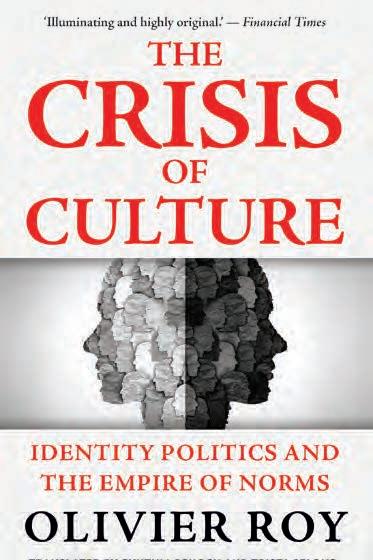

September 2025
9781805264064
198mm x 129mm
216pp
£12.99 Paperback
Politics / Sociology
World English rights
A brilliant analysis of identity politics today by world-renowned thinker Olivier Roy.
By the same author:


9781787381902
£19.99 pb
Available now


9781849046985
£19.99 hb
Available now


December 2025
9781805264385
216mm x 138mm
296pp
£15.99 Paperback
Current Affairs / Politics / Russia World rights
In the series NEW PERSPECTIVES ON EASTERN EUROPE & EURASIA
Edited by Dr Ben Noble


A disturbing portrait of the fascist youth movements warping Russian society and politics.
NEW EDITION
‘An incandescent indictment … Garner writes with dash and panache, and pulls no punches as he rips through the evolution of the Putin regime.’
— The Sunday Times
‘A chilling investigation into the widespread support for the violence and ideology of fascism among Russia’s youth—and how Putin has used this to his advantage.’ — Financial Times
‘A brilliantly detailed portrait of the ideological and cultural atmosphere engineered by the Russian state, media and Church … a chilling and essential book.’ — The Times Literary Supplement
‘A chilling and eye-opening primer on how the Kremlin is cultivating a new generation of foot soldiers who will ensure that its ugly ideology survives even if the current regime falls.’
— The Moscow Times
‘A chilling exposé.’ — Airmail
‘Astutely examines Russian youth’s growing embrace of fascism.’ — Prospect

Ian Garner is Assistant Professor of Totalitarian Studies at the Pilecki Institute, Warsaw. His research focuses on Soviet and Russian war propaganda. The author of Stalingrad Lives: Stories of Combat and Survival, and a fellow of the Royal Historical Society, he holds a PhD from the University of Toronto.
EDITION
‘Mulgan has a sophisticated appreciation of the forces that create modern economic and social conditions … [A book of] wisdom and insight.’
— The Irish Times
‘A manifesto for creativity, and for thinking big.’ — The New Statesman
‘An important contribution.’ — Financial Times
‘The tonic the world needs, particularly the West. Read it!’ — Anne-Marie Slaughter
‘We desperately need to renew our sense of what is possible, and imagine the future in ways that are simultaneously creative, open and practical. This wonderful, eclectic and deeply interesting book is crammed with ideas of just how we might do so. If you care about where we’re headed, you must read this.’ — Professor Rebecca Henderson, Harvard Business School, author of Reimagining Capitalism in a World on Fire
‘A dizzying cornucopia of cases for imagination mattering more than rote learning and political orthodoxy.’ — Professor Danny Dorling, author of Peak Inequality and Seven Children

Geoff Mulgan is Professor within University College London’s Science, Technology, Engineering and Public Policy team. Formerly Nesta’s chief executive, and co-founder of a dozen organisations, his past government roles include Strategy Unit director and head of policy at 10 Downing Street. His books have been translated into over twenty languages.
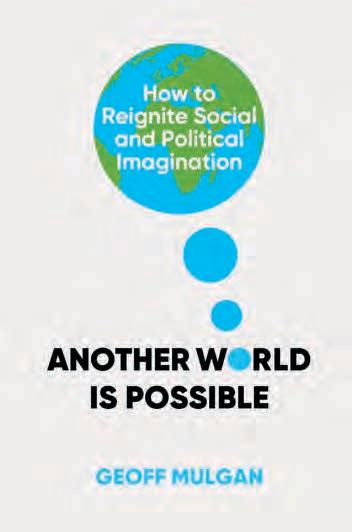

October 2025
9781805264378
198mm x 129mm
360pp
£12.99 Paperback
Politics / Current Affairs
World English rights
Calls for an imaginative surge to fix our battered societies, fusing bold ideas and practical experiment.
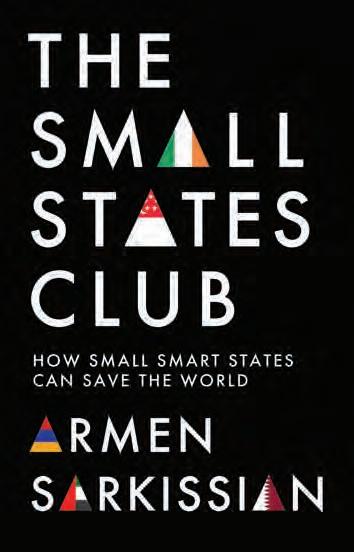

August 2025
9781805264057
198mm x 129mm
304pp, 32 colour illus
£16.99 Paperback
International Studies / Politics
World rights excluding the Armenian, Mongolian & Russian languages
‘A fascinating and timely analysis of the agility and adaptability of small states.’ — Financial Times Best New Books on Economics
‘Sarkissian is intrigued by small states … and the lessons they may hold for the rest of the world. His portraits of … these countries, peppered with personal anecdotes, are compelling case studies.’
— The Economist
‘A corrective to the pervasive bias in favor of big states. [This] persuasive and fluent book is part reminiscence, part case for the significance of small states, and part advocacy for Armenia.’ — Foreign Affairs
‘A very useful … endeavour.’ — Choice
‘Drawing from the annals of history and his own leadership experience, Sarkissian elucidates how certain small states have not only survived but thrived on the global stage despite their diminutive size.’
— BNN Breaking
‘Clarifies the important role small states play in upholding world order.’ — Henry Kissinger
A gracefully written reflection on how small states can pack a punch that belies their size.
Armen Sarkissian is a world-renowned theoretical physicist, diplomat, businessman and philanthropist. Armenia’s former president (2018–22) and prime minister (1996–7), founding director of the University of Cambridge’s Eurasia Centre and co-creator of TETRIS-Gold, he held senior positions at BP, AlcatelLucent, Bank of America, WEF, EBRD and EastWest Institute (NY).
‘Dr Kalnins shows, as only a scholar with her knowledge and of her repute can, the diversity and richness of Latvian history over several millennia. She is as thorough covering the craftmanship of the Bronze Age as she is on Latvia’s accession into the EU and NATO, and its adoption of the euro.’ — Neil Taylor, author of Estonia: A Modern History and the Bradt guide to Baltic Cities
The history of the Latvian people begins some four and a half millennia ago, with the arrival of the proto-Baltic Indo-Europeans in northern Europe. Over the following centuries of domination by successive European powers, the land’s inhabitants preserved a powerful sense of identity, fostered by their ancient language, oral literature, songs and customs. These in turn informed and spurred the rise of national consciousness in the nineteenth century, and the political activities of the twentieth, which brought the modern nation-state of Latvia into being.
This book traces the genesis and growth of that nation, its endurance over centuries of conquest and oppression, the process by which it achieved its independence, and its status as a member of the European community in the twenty-first century.
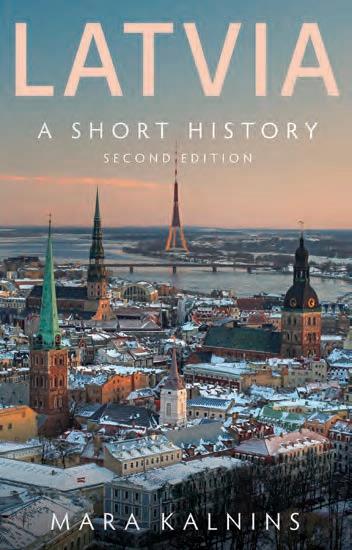

September 2025
9781805264439
216mm x 138mm
280pp, 11 b&w illus
£18.99 Paperback History / Eastern Europe World rights
Mara Kalnins is a life fellow of Corpus Christi College, and former reader in Modern Literature, at the University of Cambridge. Her most recent book, The Ancient Amber Routes, explores the links between the Baltic and Classical worlds. She is currently translating the ancient Latvian dainas (songs) into English.
From northern Europe’s earliest inhabitants to the search for security in the twenty-first century, Kalnins sweeps through the full story of a remarkable Baltic state.


October 2025
9781805264460
216mm x 138mm
224pp
£15.99 Paperback War & Conflict World English rights
Published under the auspices of the
Center for International & European Affairs, University of Piraeus.
NEW EDITION
‘I read Thucydides on Strategy with considerable interest, pleasure and care. The authors have made an original contribution to scholarship ... and have managed to synthesise a coherent whole that goes far to explain how Athens lost and the Peloponnesians won this war.’ — Karl Walling, Professor of Policy and Strategy, U.S. Naval War College
‘An excellent companion to the History, and an aid to the essential reflection that Thucydides’s work requires.’ — Lieutenant General (Retd) Sir John Kiszely, author of General Hastings ‘Pug’ Ismay: Soldier, Statesman, Diplomat—A New Biography
‘The wisdom in this splendid book could save our current politics from many follies. If only our politicians, civil servants and soldiers took the time to read and understand it.’ — Colin S. Gray, Professor of International Politics and Strategic Studies, University of Reading
A fresh look at the ancient general and scholar’s classic History of the Peloponnesian War, from the perspective of modern diplomacy and war.
Athanasios Platias is Professor of Strategy at the University of Piraeus, the President of the Council for International Relations, Greece, and a coordinator for Europe at the Mackinder Forum. Constantinos Koliopoulos is Professor of International Relations and Strategic Studies at the University of Piraeus, and a former Fulbright scholar.
‘A well-written publication that will contribute to the ongoing and necessary debate about the fall of Afghanistan to the Taliban and the current situation in the country.’ Informed Comment
‘This detailed account of the decisions and misjudgements that led to the fall of the Republic and the Taliban’s return to power is essential reading.’ — Sir Laurie Bristow, former UK ambassador to Afghanistan (2021)
Formerly director-general for international relations on Kabul’s National Security Council, Ahmad Shuja Jamal practises law in Melbourne. A former Fulbright scholar, he has worked for Human Rights Watch. William Maley is Emeritus Professor of Diplomacy at Australian National University, and the author of many books on Afghan politics and history.
DANIEL MARWECKI
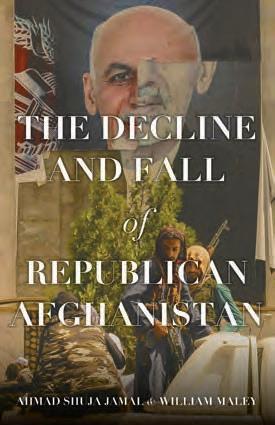

November 2025 • 9781805264477
216mm x 138mm • 312pp
£19.99 Paperback
South Asia / Politics World rights
‘Balance and erudition … much to recommend it.’ — Asian Affairs
‘Describes … visions of Israel as a new embodiment of Jewish power awaken[ing] dormant German fantasies.’ — Pankaj Mishra, London Review of Books
‘Fascinating … sheds light on [both history and] … the present.’ — Professor Neve Gordon


August 2025 • 9781805264484
216mm x 138mm • 296pp
£19.99 Paperback
Daniel Marwecki is a lecturer in International Relations at the University of Hong Kong. He previously taught at the University of Leeds and at SOAS University of London, where he also received his PhD.
International Studies / Middle East World rights excluding the German language
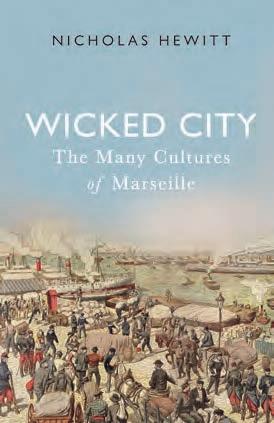

December 2025 • 9781805264415
216mm x 138mm
328pp, 25 colour illus
£15.99 Paperback
History / Europe World rights
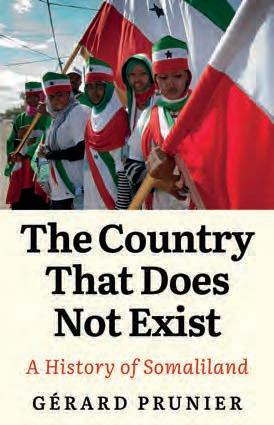
NICHOLAS HEWITT
‘Fascinating … enjoyable and highly readable.’
— The Times Literary Supplement
‘Sagely navigates the ebb and flow of [Marseille’s] contradictory currents.’ — History Today
‘Brings anecdotal, kaleidoscopic and loving insight to the city that spawned the French national anthem.’
— The Irish Times
Nicholas Hewitt (d. 2019) was the editor of French Cultural Studies, an emeritus professor of French and Francophone Studies at the University of Nottingham, and a specialist in twentieth-century French cultural and literary history. He is the author of Montmartre: A Cultural History.

November 2025 • 9781805264422
216mm x 138mm • 296pp
£19.99 Paperback
History / Africa World rights
NEW EDITION
‘Employing an interdisciplinary approach that draws on history as well as anthropology, [this] research goes beyond superficial or abstract theoretical assumptions in a bid to understand the connections between geography, social structures and the challenges faced by Somalis in meeting the demands of the post-colonial world order.’ — Survival
‘The book on how a post–nation-state world order may unfold. A breath of fresh air [and] a must-read.’ — Professor Will Reno, Northwestern University
Gérard Prunier is a renowned historian of contemporary Africa, and author of, inter alia, the acclaimed The Rwanda Crisis: History of a Genocide and the forthcoming Colonialism Devours Itself: The Waning of Françafrique, both published by Hurst.
‘Exceptionally deciphers the nature and origin of the internal conflicts in Pakistan.’ — International Affairs
‘An excellent volume on Pakistan’s crisis from a sociological perspective.’ — The Muslim World Book Review
‘Highly valuable.’ — Bloomsbury Pakistan
Mohammad Waseem is Professor Emeritus at the Mushtaq Ahmad Gurmani School of Humanities and Social Sciences, Lahore University of Management Sciences. Formerly the Pakistan chair at St Antony’s College, University of Oxford, he specialises in Pakistan’s ethnic-sectarian, constitutional, electoral, military and militant politics. His books include Democratization in Pakistan.


September 2025 • 9781805264446
216mm x 138mm • 588pp
£18.99 Paperback
Politics / South Asia
World rights
Comparative Politics & International Studies series
C.P. W. GAMMELL
NEW EDITION
‘Masterfully succeeds in cutting through the complexities … weaves together the complex threads of Herat’s history, culture and politics … a beguiling and authoritative work.’ Literary Review
‘At a time when there is not much to be celebrated in Afghanistan, [this] is an absolute delight: a book of joy and wonder. Captivating from start to finish, this beautifully written history is a love letter to Herat through its many triumphs and tragedies.’ — Justin Marozzi
C.P. W. Gammell is a Cambridge- and Oxford-educated historian of Afghanistan and Iran. He has worked in both countries since 2009, including interpreting Dari and Pashtu for the ICRC and advising UNESCO. A former British diplomat, he appears regularly on Sky News, BBC Persian and various podcasts.


November 2025 • 9781805264453
216mm x 138mm
464pp, 16 colour illus
£19.99 Paperback
History / South Asia
World rights
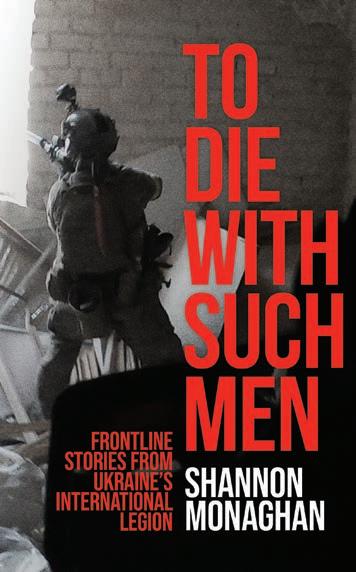

February 2025
9781911723899
234mm x 156mm
392pp, 8pp colour illus
£20.00 Hardback
Current Affairs / Ukraine
World rights
Frontline Stories from Ukraine’s International Legion
This book is Black Hawk Down meets Enemy at the Gates meets Band of Brothers, and it’s all true. It tells the story of what happens when careless Western politicians assume we’re living the ‘end of history’, until it turns out that the Great Game is back, uglier and more callous than ever before. It’s the story of the men who tried to fix those mistakes, at the risk—and sometimes loss—of their lives.
Shannon Monaghan follows a core group of Western volunteers in Ukraine, fighting together from the early days of the battle for Kyiv through to the last stands at Severodonetsk and Bakhmut. They arrived alone, but formed a family—back when nobody bothered to learn names, because they all expected to die. One of them was among the last men to leave the city of Bakhmut in the final days of May 2022.
These men knew very well that they’d be fighting without the NATO support they were used to. They knew the severe risks they would run, and the potential criticism they would face for fighting someone else’s war. But they also knew it was the right thing to do. This is their story.
Based on interviews and body-cam footage, a gripping account of the British and American volunteers fighting in Ukraine’s International Legion, from Kyiv to Bakhmut.

Shannon Monaghan PhD is a historian of modern war educated at Yale University and Boston College, and author of A Quiet Company of Dangerous Men. She has interned in international arms transfers at the US State Department, worked in strategy consulting and data analytics, and taught writing at Harvard University.
From the ‘crippled suffragette’ to 1980s punks chaining themselves to buses, from resisting government policies to changing the media narrative, this book celebrates the amazing UK activists, protest actions and campaigns that have fought for disabled people’s rights to live.
In Ramping Up Rights, Rachel Charlton-Dailey highlights a shockingly overlooked history: 100 years of struggle for disability rights. She unpacks what has gone so wrong with British attitudes and policy in the twenty-first century, and interviews campaigners and disabled people about how they have reclaimed power, from the inclusivity of online activism to the importance of intersectionality. She explores the live frontiers in this ongoing battle for civil rights—from the scandalous inaccessibility of our education and transport systems, to the existential debates about neurodiversity, genetic screening and ‘the right to die’.
These angry, thoughtful, hopeful pages show for the first time how a look at disability activism’s past can become a call to action for the future. As rights continue to be eroded for political gain, this urgent, powerful book will show readers how hard, and how often, disabled people and their allies have fought and won—and will give them the energy to keep fighting back.
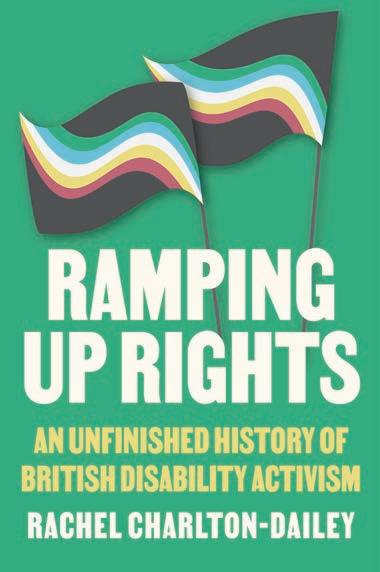

July 2025
9781911723950
190mm x 126mm
288pp
£14.99 Paperback
Society & Culture / Current Affairs
World rights

Rachel Charlton-Dailey (she/ they) is an award-winning disabled journalist, activist and author. A columnist at The Canary, she has previously reported for the BBC, The Unwritten, The Big Issue, Metro, The Guardian and the Daily Mirror. When Rachel isn’t writing, they can be found walking their sausage dog, Rusty.
A vivid history of the 100-year battle for British disability rights, spotlighting enraging injustices and inspiring campaigns, past and present: this fight isn’t over.
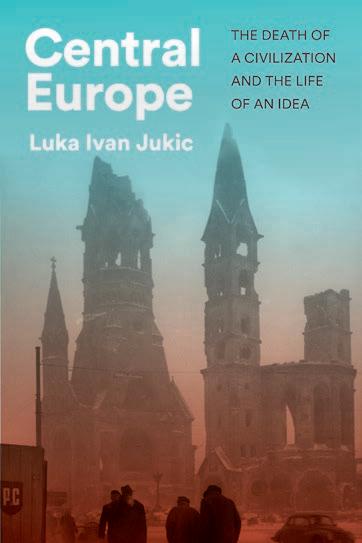

June 2025 9781911723981
234mm x 156mm 344pp
£25.00 Hardback
History / International Studies World rights
What is ‘Central Europe’? Where do its borders lie? Does it even exist? Attempts to define it usually yield more questions than answers. But perhaps the wrong questions are being asked.
Luka Ivan Jukic disentangles the enigma of Central Europe through its history of birth, death and rebirth. Countries like Poland, Croatia and even Ukraine proudly proclaim themselves part of this region, and so part of Western civilisation. But the term originally described an unrecognisably different world—one formed in the eighteenth century by the unique inheritance of the House of Habsburg across a decentralised Germany and a sprawling Danubian realm; by the rise of standard High German; and by an intermediate position within a continent defined by the ‘advanced West’ and ‘backwards East’.
An absorbing journey through a region caught between history, geography and ideology.
Amid the displacement and destruction of the world wars and their aftermath, this extraordinary civilisation was shattered, reduced to the frontline of a global Cold War. Its unexpected reincarnation in the 1980s, as an ideological antidote to the Soviet East, spawned myths and polemics, but little clarity. Yet ‘Central Europe’ still seems to feature in every crisis today, from Russian aggression to European disunity. Why does it remain such a powerful political idea in our times?

Luka Ivan Jukic is a journalist and historian based in London. His work has appeared in The Atlantic, the Financial Times, New Lines Magazine, Engelsberg Ideas, Foreign Policy, History Today, and other publications.
At the core of the Christian faith lies the spiritual journey to the heart of ultimate reality, or God— described by some mystics as a ‘dazzling darkness’. For over 2,000 years, certain women and men have experienced various degrees of direct communion with God, from mild illuminations to a union in which the will of the mystic has been consumed.
This book explores such spiritual figures’ lives and teachings, alongside their personal and historical backgrounds, from early Christendom to modern mystics such as Simone Weil and Thomas Merton. It reveals that the English anchoress Julian of Norwich grew up while the Black Death was devastating Europe; that the beguine Marguerite Porete lived at a time when the Church was particularly primed to burn ‘heretics’—a fate she suffered; and that Pierre Teilhard de Chardin developed his idea of spiritual evolution with Charles Darwin’s theories in the air.
Comprehensive, deeply researched and highly engaging, Dazzling Darkness tells the stories of towering figures like Hildegard of Bingen, Teresa of Ávila and John of the Cross. Its pages also highlight many lesser-known mystics, including Mary of Egypt, Seraphim of Sarov and Charles de Foucauld, allowing their voices to sing out to future generations.
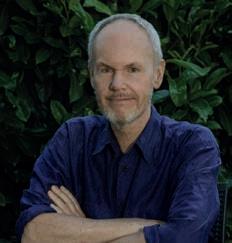
James Harpur is a poet, author and translator who lives in Ireland. He was the 2023 Writer Fellow at the Trinity Oscar Wilde Centre for Irish Writing, Trinity College, Dublin. His debut novel, The Pathless Country, won the J G Farrell Award and was shortlisted for the John McGahern Prize.
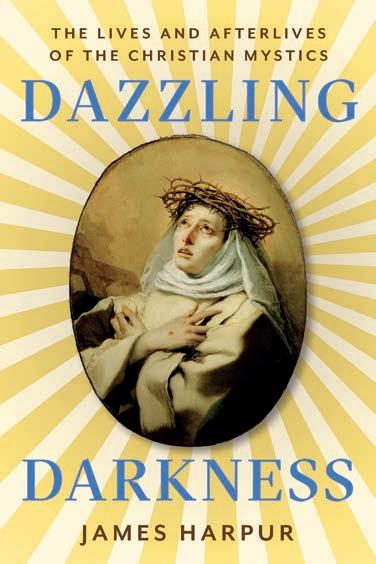

April 2025
9781911723905
234mm x 156mm
464pp, 18 b&w illus
£25.00 Hardback
Religion
World rights
A captivating journey into the heart of divine communion and spiritual evolution, through the lives of Christian mystics—from the early Church to the 1900s.
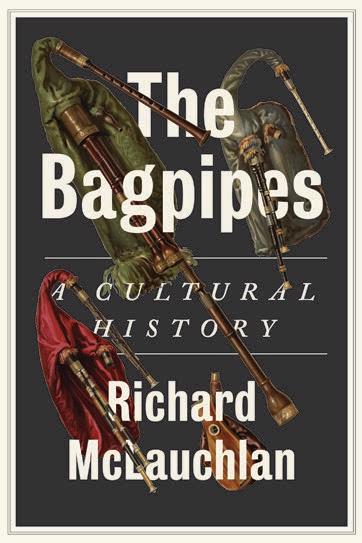

April 2025
9781805262848
234mm x 156mm
272pp, 16 colour illus
£20.00 Hardback
History / Music World rights
A captivating history of the pipes—once considered a tool of the Devil, inspiring terror on battlefields, today more popular than ever across cultures worldwide.
By the same author:
9781787387928
£30.00 hb
Available now
In the early second century CE, someone was described as playing a pipe ‘with a bag tucked under his armpit.’ That man, the first named piper in history, was the Roman Emperor Nero. Since then, this improbable conflation of bag and sticks has become one of the most beloved and contested instruments of all time. When another piping emperor, Tsar Peter the Great, watched his pet bear take its last breath, he decided the creature would live on—as a bagpipe.
This rich and vivid history tells the story of an instrument boasting over 130 varieties, yet commonly associated with just one form and one country: Scotland, and its familiar Great Highland Bagpipe. In fact, the pipes are played across the globe, and their story is a highly diverse one, which illuminates society in remarkable, unexpected ways. Richard McLauchlan charts the rise of women pipers; investigates how class, privilege and capitalism have shaped the world of piping; and explores how the meaning of a ‘national instrument’ can shift with the currents of a people’s identity.
The vibrancy and inventiveness characterising today’s pipers still speak to the potency of this fabled and once-feared instrument, to which McLauchlan is our surefooted guide.



Richard McLauchlan is a Scottish writer, educated at the Universities of St Andrews and Cambridge, and a former pipe major, taught by the renowned instructor Colin MacLellan. The author of Serious Minds, and John Campbell’s collaborator on Haldane (both published by Hurst), Richard co-founded the educational charity Light Up Learning.
This timely book explores the alarming rise of ransomware: malicious software blocking users from their systems or data, until they’ve paid money to regain access or to prevent the release of sensitive information. High-profile British examples of the twenty-first century have targeted national libraries and hospital trusts; in the US, hackers of Pennsylvania’s Lehigh Valley Health Network held patient data hostage—when their demands went unmet, they published topless photographs of women with breast cancer.
The issue presents formidable challenges and costs for businesses, national security and, as the Pennsylvania case showed, individuals—often society’s most vulnerable. But we can watch and learn from cyber extortionists, leaving us better prepared for next time. In 2022, a series of devastating ransomware attacks prompted Costa Rica’s President to declare a national emergency, describing a ‘state of war’. This episode had much to tell us about how these networks arise, operate, organise—and collapse.
Max Smeets’ landmark study demystifies the ransomware playbook, from funding to networking. Through one of the largest ransomware operations on record, he reveals how this challenge has evolved, how it differs in substance and style from traditional cyber/hacking threats, and how to combat it.


February 2025
9781911723912
216mm x 138mm
288pp
£25.00 Hardback
Current Affairs / War Studies / Technology
World rights
Max Smeets DPhil is a leading cyber security expert, Co-Director of the European Cyber Conflict Research Initiative/Incubator, and author of No Shortcuts. Holding research positions at ETH Zurich, the Royal United Services Institute (RUSI) and Stanford University, he has written for The Washington Post, War on the Rocks and Slate.
Sheds
light on the inner workings of the groups responsible for deploying ransomware, and on how governments and businesses can combat the threat.
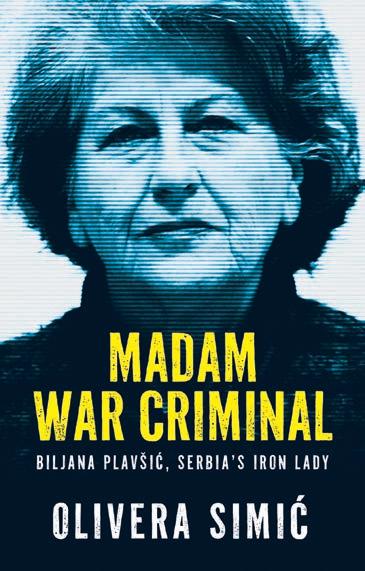

June 2025
9781805262862
216mm x 138mm
384pp
£25.00 Hardback
War Studies / History World rights
In 2001, Biljana Plavšić made history. Indicted by the International Criminal Tribunal for the Former Yugoslavia, she became the only female political leader ever prosecuted for mass atrocities. By the time the Tribunal closed in 2017, after 24 years in operation, she remained the only woman among the 161 people it had indicted.
Charged by the Tribunal for genocide and crimes against humanity, Plavšić’s plea bargain made her the first woman to be convicted by an international court since Nuremberg. The only comparably senior Bosnian Serb politician to be sentenced was Radovan Karadžić himself—President to Plavšić’s VicePresident in Bosnia’s autonomous Republika Srpska, a role she then took over after the Bosnian peace. Yet until the Yugoslav wars erupted in 1991, Plavšić had been an internationally renowned scientist and faculty dean at the University of Sarajevo, with over 100 journal articles to her name.
A personal history of conflict, imprisonment and unrepentance, from the only woman convicted of crimes against humanity for her role in the Bosnian war.
Now in her 90s, and a free woman, Plavšić is also the Tribunal’s oldest convicted defendant. Olivera Simić’s gripping book is based on hundreds of hours of interviews with a stridently unrepentant war criminal, recorded over seven years. How did this biology professor end up running a vengeful ethnonationalist movement that killed tens of thousands?
Olivera Simić is Associate Professor at Griffith University’s Law School, specialising in transitional justice, international law, gender and crime. She has authored or co-edited twelve books. Her latest, Lola’s War: Rape Without Punishment, about sexual violence in the Yugoslav wars, was shortlisted for the Australian Legal Research Book Award.
BEATRIX CAMPBELL & RAHILA GUPTA
In 1995, the UN vowed to advance ‘equality, development and peace for all women, everywhere.’ Instead, in the Beijing Declaration’s thirtieth anniversary year, the world is lurching dangerously away from such democratic and progressive ideals—reinventing nationalist identities based on toxic-masculine values, and embracing economic policies against women’s interests. This reality exists in every type of country. Why does oppression, rather than feminism, still dominate our world?
This book reveals patriarchy’s many faces in the age of globalisation, exploring the political systems and cultures of eight very different societies. It takes readers from the extraordinary anti-capitalist women’s revolution in Kurdistan to the theocracies of Islamic State and Saudi Arabia; from China’s one-party state to Iceland’s democracy; and to South Africa, Russia and El Salvador—all radically changed since the fall of apartheid, communism and military dictatorship respectively.
Despite patriarchy’s remarkable shapeshifting powers to undermine feminist solidarity, Planet Patriarchy is equally a story of sisterhood and resistance, interviewing defenders of women’s rights about their cause and their country. Gender inequality endures, everywhere—but so does feminism. Campbell and Gupta’s fascinating discoveries show us how this timeless showdown is taking shape in, and being shaped by, the systems we live under today.
Beatrix Campbell OBE is a writer, broadcaster, playwright, and recipient of several honorary doctorates. Her pathbreaking Wigan Pier Revisited won the Cheltenham Festival Prize. Rahila Gupta is a freelance journalist, author and activist, and Chair of Southall Black Sisters, which campaigns for Black/Global South women escaping violence in the UK.
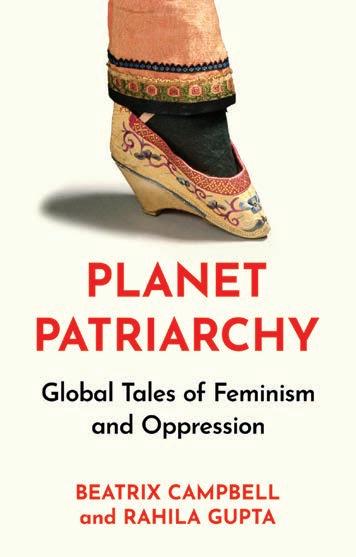

July 2025
9781805262879
216mm x 138mm
392pp
£20.00 Hardback Society & Culture / Gender World rights
A continent-crossing panorama of women’s rights, women’s oppression and women’s politics in the twenty-first century.


May 2025
Depending on which news story you read, new tools like artificial intelligence will either save or destroy the world.
The threat from emerging technology might seem unprecedented, but our response to it follows a pattern as old as civilisation. From ancient Athens to COVID-19, social media to spam, Alicia Wanless shows how humans have always consumed information, whether accurate or not. It’s a familiar tale: first we develop a new technology that changes how information is shared, increasing the availability of content and the speed at which it can travel. Then, as more people engage with this new content, fresh ideas arise, often at odds with prevailing beliefs. Some use the new tools to promote their views, win power or simply profit, adding to the mounting information pollution. Competition and conflict follow. Fearing the worst, we scramble—in vain—to control flows of information and use of the new technology.
With democracies around the world lurching from crisis to crisis, knee-jerk reactions to information conflict won’t suffice. What’s needed is an understanding of humans’ nature as ‘information animals’—of our long-standing relationship with technology, and the ways in which a contentsaturated world impacts the political battle for hearts and minds.
Humanity has always craved, and feared, information. Alicia Wanless offers a fresh understanding of the relationship between people, technology and knowledge, today and throughout history.
Alicia Wanless is a senior fellow at the Carnegie Endowment for International Peace, where she runs the Information Environment Project. She completed her PhD in War Studies at King’s College London, combining ecology and strategic theory in a new approach to understanding conflict within the information environment.
Our perception of China’s global role and influence depends on our vantage point. For the United States, the People’s Republic is a strategic competitor: the only country with both the intent to reshape the international order and, increasingly, the economic, diplomatic, military and technological means to do so. For Europe, China is a ‘partner for cooperation, an economic competitor and a systemic rival’. For NATO, it is a ‘decisive enabler’ of Russia’s war against Ukraine. Yet Beijing enjoys a far more positive image in the Global South, of which the PRC considers itself a constituent member.
In this collection of essays and opinion pieces, Zhou Bo seeks answers to some of the most important questions relating to China’s role in global affairs of the twenty-first century. The landscape in which the PRC is operating is not only a world becoming less Western, but also—and more importantly—a West becoming less Western.
Are Moscow and Beijing realxly as closely aligned as some allege? What is the future of India–China relations? Is the West truly facing a new Cold War foe in China? Or will transnational economic links move the two power centres ineluctably closer together, rather than further apart?
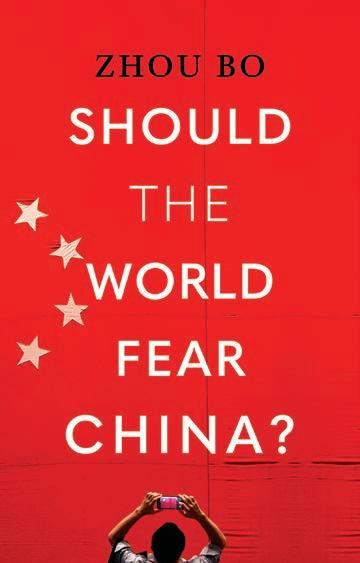

March 2025
9781805263456
216mm x 138mm
376pp
£30.00 Hardback
China / International Studies
World rights excluding the Simplified Chinese language
Zhou Bo is Senior Fellow at Tsinghua University’s Center for International Security and Strategy, Senior Colonel (Retired) in the People’s Liberation Army, and a regular speaker at the Munich Security Conference and IISS Shangri-La Dialogue. Beyond China, he has studied at Harvard University and the Universities of Cambridge and Westminster.
A revealing assessment of China’s place in the world, from one of its most respected foreign policy analysts.


June 2025
9781805263760
190mm x 126mm
256pp
£25.00 Hardback
Security Studies / China World rights
Assesses the substantial risk of strategic defeat for Washington in any war with China.
This is a detailed analysis of how the United States intends to fight a war against the People’s Republic of China and why it risks strategic defeat—based on its doctrine, force structure and general ‘way of war’. Franz-Stefan Gady contends that the US military’s current approach to a potential war over Taiwan is flawed, relying heavily both on achieving rapid information superiority and on a decisive victory. This is unlikely to succeed, and may increase the risk of nuclear escalation between the world’s only genuine superpowers.
A US–China war would more likely be characterised by prolonged attrition across multiple domains (cyber, space, air, sea and land)—a conflict for which America’s military and society are ill-prepared. The US also lacks a viable blueprint, the military forces or the industrial capacity for a long war of attrition. This deficiency stems from a military culture prioritising advanced technology over mass, and the lack of political will or public readiness for the sacrifices such a conflict would require.
Gady’s research and analysis, both of the highest order, reveal the significant risk of strategic defeat for the United States in a potential conflict with China, whether in the 2020s or 2030s.
Franz-Stefan Gady has advised US and European militaries on structural reform and the future of high-intensity warfare. An adjunct senior fellow with the Center for a New American Security, Washington, DC, he has conducted field research in Afghanistan, Iraq and Ukraine. His latest book is The Return of War.
1924–2024
Hollywood film stars, fascist assassins. Bombs on San Lorenzo, la dolce vita on Via Veneto. Baroque fountains, umbrella pines. Urban planning, unregulated house-building. After half a century living in Rome, David Lane turns his eye on events and streetscapes in the Eternal City over the past 100 years.
Scenes from a Roman Century begins with the 1924 murder of Giacomo Matteotti—the beginning of the end for interwar democracy—and ends with the organised crime and political violence of our own era. It sketches Rome’s growth under Mussolini’s dictatorship, and its fortunes during the Second World War; the economic miracle of the postwar decades; and Rome’s latest transformations through the turn of the millennium.
Lane sends readers meandering down the alleys, out towards the suburbs and to stand before the monumental architecture, capturing cultural and political moments from Rome’s past and present. He explores fascism’s material legacy across the city, terrorism and political extremism on the right and left, and the struggle to manage economic growth’s burdens—ugly urban sprawl, and the crush of mass tourism in the historic centre. As pilgrims descend for the 2025 jubilee declared by Pope Francis, what is next for this ever-changing city of history?
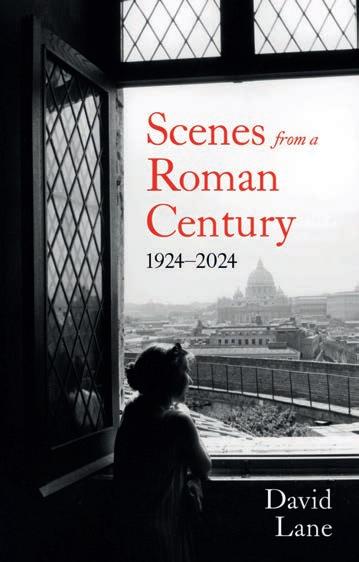

March 2025
9781805262930
216mm x 138mm
280pp
£17.99 Paperback Europe / History / Travel World rights
David Lane has lived in Rome since 1972, has written for The Guardian and the Financial Times, and was The Economist’s business and finance correspondent for Italyfrom 1994 to 2013. His books include Berlusconi’s Shadow; Into the Heart of the Mafia; Italian Electricity; and two volumes of memoir.
An offbeat meander through the streets and histories of the great Italian capital, where the past is always present.


July 2025
9781805262909
216mm x 138mm 312pp
£27.50 Hardback History / Politics World rights
With India under growing scrutiny over the erosion of its democracy since 2014, worldwide media coverage has revealed our poor grasp of it as a modern nation. In this book, Indrajit Roy sets out to understand modern Indians on their own terms. Beyond the usual polarising narratives—either pious platitudes to the ‘world’s largest democracy’, or laments over its ‘democratic backsliding’— Roy reveals the remarkable 75-year achievement of building a democratic nation in a country weathering mass poverty, severe inequality and deep social conflict. He also exposes how this process unfolds on the ground, telling the story of a nation-state via glimpses into how Indians have thought of themselves, the world and their place in it.
Indians charts the evolution of a people’s identity since the spectacle, frenzy and hope of independence in 1947, and the republican constitution introduced in 1950. This is both a high-political history and, more importantly, an account of that history’s interplay with the nebulous complex of ideas and passions that go into making, unmaking and remaking a democratic nation.
What
can we learn from India’s postcolonial experience of fashioning a democracy despite its extensive poverty, entrenched inequalities and widespread illiteracy?
Roy’s astute political biography of the Indian people is, ultimately, a tale of how one democracy influences, and is shaped by, its economy, society and culture.
Indrajit Roy DPhil is Professor of Politics at the University of York. His books on Indian democracy include Politics of the Poor and Audacious Hope. Indrajit has appeared on BBC Radio 3’s Free Thinking, and his commentary has been published by The Conversation, openDemocracy, Global Policy and The Economic Times.
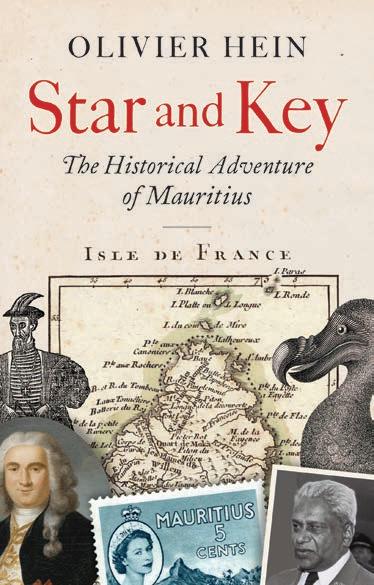

March 2025
9781805262923
216mm x 138mm
336pp, 32 colour illus
£25.00 Hardback
History / Africa
World rights
Many countries have an interesting tale to tell about their origins and evolution. But few are as exciting and adventurous as that of Mauritius— ‘Star and Key’ of the Indian Ocean.
A tiny island of volcanos, dodos and lagoons, Mauritius remained untouched by humans until Arab sailors discovered it in the tenth century. Settled by the Portuguese, Dutch, French and then British, it was passed from one empire to another, each recognising its immense strategic importance, yet all struggling fully to control it.
A lively history of an extraordinary island and the people who call it home.
From a highly prized colonial chess piece to an independent success story, Mauritius has always been a place with outsized influence. This cultural melting-pot is home to peoples of Indian, Chinese, African and European descent, shaping the country’s vibrant literature, music, language and art—as well as its ethnic tensions, which have always bubbled near the surface. Olivier Hein’s sweeping history uncovers Mauritius’s fascinating yet little-known past, exploring the age of pirates; the horrors of indentured labour; the 1810 FrancoBritish war; the transformations in economy, landscape and climate during the twenty-first century; and much more. From its geological origins to the present day, this is the story of an island nation quite unlike any other.
Olivier Hein is a Mauritian-British author, whose books include Punch a Hole in the Wind. A regular contributor to The Chap magazine, he is a former UN, UK and OSCE diplomat, with postings to New York, Paris, Kosovo and Turkmenistan. He lives with his family in the Cotswolds.
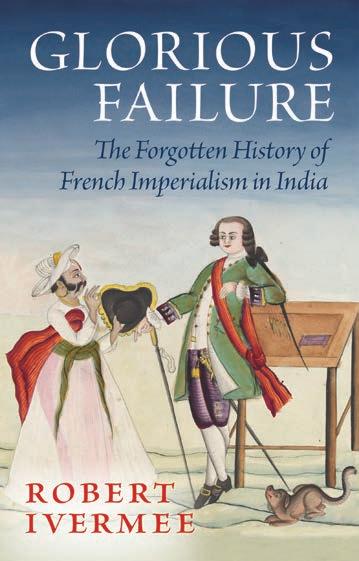

June 2025
9781805262954
216mm x 138mm
412pp, 36 colour illus
£30.00 Hardback
History / Colonialism
World rights
ROBERT IVERMEE
This is a powerful new account of a chapter in history that is crucial to understand, yet often overlooked. For 150 years, from the reign of Louis XIV to the downfall of Napoleon, France was an aggressive imperial power in South Asia, driven by the pursuit of greatness and riches. Through their East India company and state, the French established a far-reaching empire in India, only to see their dominant position undermined by conflict with Indian rulers, competition from other European nations, and a series of fatal strategic errors.
Exploding the myth of a benign French presence on the subcontinent, Robert Ivermee’s extensive research reveals how France’s Indian empire relied on war-making, conquest, opportunistic alliances, regime change and slavery to pursue its ambitions. He considers influential French figures’ reactions to the collapse of the imperial project, not least their deployment of new ideas, like freedom and the rights of man, to justify fresh ventures of domination—even as colonial authorities failed to acknowledge the equality of French India’s diverse indigenous peoples, both before and after the French Revolution.
From war with the British to the enslavement of Indians, Ivermee uncovers the dark history of France’s doomed imperial project in South Asia.
From great power rivalry to informal empire and entrenched inequalities, Glorious Failure tackles topics that remain vital and urgent in today’s world.
Robert Ivermee is a historian of British and wider European colonialism in South Asia. He is Associate Professor at the Catholic University of Paris, and the author of Hooghly: The Global History of a River (also published by Hurst).
Illustrated by ZAFAR ABBAS MALIK
Three Begums revolves around the lives of three ordinary women—Hamida, Merryl and Saliha— who lived extraordinary, interwoven lives of fabulous joy, fierce pain, and untold trauma. Like many who came before them, they loved and dreamed. Although born in different times and places, they were united through their dedication to bettering the lives of all around them. Each fell victim to disease and premature death, without fulfilling their desires; but, like all desires, these continue beyond their lifetimes.
Flowing seamlessly between the biographical and autobiographical, Ziauddin Sardar captures the complexities of everyday living, human relationships and raw emotion, weaving lives and ambitions together. The great story of human societies unfolds through the eyes of an individual, with each chapter struggling to fulfil the aspirations of the last. Sardar shows how his own life was shaped by these women, and how their collective life undulated, sea-like, to the rhythms of Urdu poetry.
This genre-defying book takes readers on a journey that is inimitably personal, yet reverberates universally. Powerful and unforgettable, Three Begums is a profound reminder that, in a good life, the only thing that matters is virtue—particularly the virtue of compassion, and working for something greater than oneself.
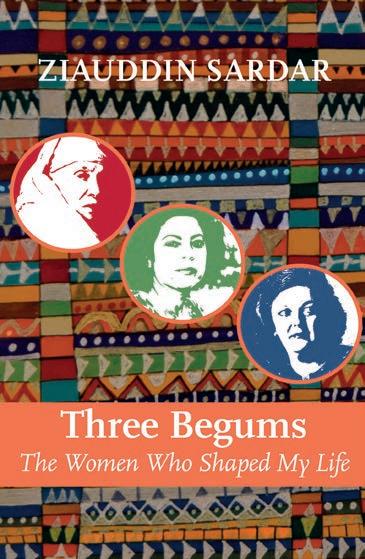

March 2025
9781805263333
190mm x 126mm
276pp, 20 b&w illus
£12.99 Paperback Biography / Memoir World rights
Ziauddin Sardar is an award-winning, internationally renowned writer, futurist and cultural critic. His books include Desperately Seeking Paradise: Journeys of a Sceptical Muslim; Reading the Qur’an; and Mecca: The Sacred City. A former New Statesman columnist and equality and human rights commissioner, he is Editor of influential quarterly Critical Muslim.
A poignant reflection on grief, empowerment and feminism through the lives of three women who shaped Ziauddin Sardar’s destiny.


April 2025
9781805263012
216mm x 138mm 304pp
Three decades after gaining independence from the Soviet Union, Estonia is a nation transformed. Today, the country is known worldwide as a startup hub, boasting billion-dollar companies including Wise, Veriff and Bolt—but even more impressive are Tallinn’s pioneering efforts in e-government. With 99 per cent of government services digitalised and accessible online, citizens can vote via computer, or file their taxes online in minutes; and Estonia’s use of artificial intelligence to enhance and automate its offering to citizens long predates ChatGPT.
In the series
NEW PERSPECTIVES ON
EASTERN EUROPE & EURASIA
Edited by Dr Ben Noble


How did a small postSoviet state become a digital powerhouse, producing world-leading tech companies and pioneering policies for remote citizenship?
Drawing on his experience as a former official for the Republic of Estonia, Joel Burke offers unique insight into the country’s rapid rise as a tech and e-government powerhouse since the turn of the century. From the founding of Skype to the future of the e-state, he unveils the tactics and stories behind Estonia’s spectacular journey—from abject poverty, after years of Soviet occupation and mismanagement, to global tech leadership. For those hoping to learn from Estonia’s incredible journey, Burke offers insights into the government’s use of AI, its creation of a digital society, and its cultivation of a culture driving public-sector creativity and innovation. Rebooting a Nation is an informative and entertaining masterclass in Estonia’s modern history.
Joel Burke is a technologist and Georgetown University alumnus based in Washington D.C. With experience working on four continents, he has advised startups and governments—most notably, leading a team for the Republic of Estonia’s e-Residency programme, and advising members of the United States Congress on tech and AI policy.
This authoritative book proposes a fresh perspective on international migration, offering decisive answers to the big questions, and dismantling the main myths surrounding one of the most salient issues of today’s global politics. Who are these migrants? Do they steal our jobs? Can we help them in their home countries? Do border controls improve security? Are open borders desirable? Leila Simona Talani and Matilde Rosina address these issues and more in their deeply researched study of migration into both Europe and the United States.
Assessing globalisation’s impact on international migration, the authors find that it is virtually impossible to stop contemporary flows from the Global South to North. In this context, policies designed to control, limit or deter immigration simply transform some or all regular migrants into irregular ones—exacerbating insecurity for citizens of the receiving state, and criminalising the migrants.
Through empirical research including original surveys and interviews, Talani and Rosina demonstrate conclusively that the only solution to this short-circuit world of securitisation and criminalisation is for the Global North to open its doors to the migrants already, inevitably, coming through—particularly since the evidence shows that regularising migration is a positive-sum game, in economic, social and security terms.
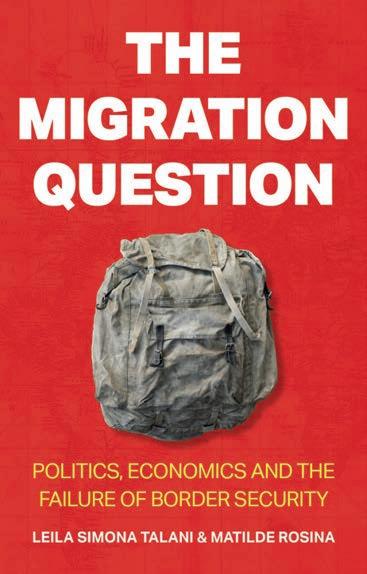

June 2025
9781805263029
216mm x 138mm
288pp
£30.00 Paperback International Studies / Migration World rights
Leila Simona Talani is Professor of International Political Economy in the Department of European and International Studies, King’s College London. Matilde Rosina PhD is Lecturer in Global Challenges at Brunel University London, and Visiting Fellow at the London School of Economics, specialising in European migration policy and politics.
A definitive study of a hotly debated phenomenon: migration into Europe and America, its socioeconomic impacts, and the eternal policy efforts to stop the inevitable.


April 2025
9781805263036
216mm x 138mm 360pp
£30.00 Paperback
History / Espionage / International Studies World rights
The fascinating history of Russia’s secret agents targeting Japan, from the Edo shogunate to the Second World War.
D.J. BROWN
Richard Sorge is one of history’s most famous spies. This hard-drinking, womanising, motorcyclecrashing Soviet officer penetrated the German embassy in Tokyo during the 1930s and gathered intelligence credited with changing the course of the Second World War. It is an intriguing tale; but Sorge’s spy ring was just one chapter in a much longer history of Russian and Soviet espionage in and against Japan.
Cracking the Crab tells the extraordinary full story of Russian intrigue targeting Japan, from first encounters in the eighteenth century to the Soviet declaration of war in August 1945. Colourful episodes include Gojong, King of Korea, being smuggled into the Russian legation dressed as a woman in 1896; the 1927 ‘Tanaka Memorial’, an infamous forgery purporting to be Japan’s hidden plan for world domination; and the secret intelligence of ‘Nero’, a Soviet agent supplying invaluable insight into Japanese strategy during the Second World War.
From Russians murdered in broad daylight in Meiji Tokyo to Soviet ‘white magic’ and honey traps at the Battle of Nomonhan, this is a landmark history of the covert struggle between two great powers of the modern age.
James D.J. Brown is Professor of Political Science at Temple University, Japan. He is a specialist on East Asian politics and a regular media contributor, including for the BBC. His books include Japan, Russia and their Territorial Dispute; and Japan’s Foreign Relations in Asia and The Abe Legacy (both co-edited).
Central Asia is at the forefront of China’s efforts to assert itself as a major world power. Since 1991, Beijing has emerged as the region’s main investor, creditor and trade partner, as well as an increasingly important security provider. But its growing influence has met opposition: in recent years, anti-China protests have erupted across Central Asia, threatening Beijing’s shaky regional hegemony.
Bradley Jardine and Edward Lemon examine how Central Asians are pushing back against China’s global ambitions, and trace Beijing’s attempts to manage its image and secure its interests in response. Drawing on over a decade of fieldwork, Backlash reveals the uncertainties of China’s rise. Far from being the omnipotent strategist often depicted in international media, Beijing is making significant missteps, alienating local people and becoming entangled in costly interventions to protect its citizens and investments. Russia’s fullscale invasion of Ukraine in 2022 undermined Moscow’s regional position, creating opportunities for China to expand its role. But to do so, it must contend with the agency of Central Asians themselves: their interests, policies and priorities.
This incisive book exposes the unravelling of China’s alternative to the American-led global order, highlighting both elite and grassroots actors forcing Beijing to adapt its approach.
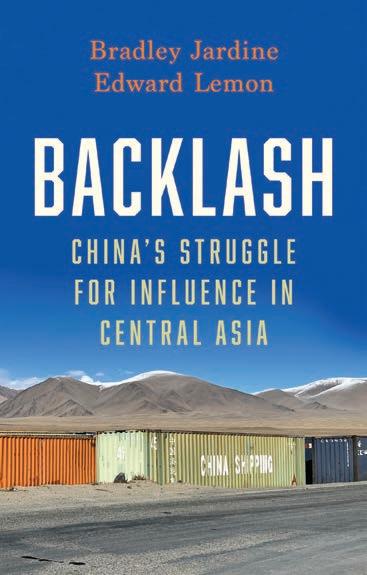

June 2025
9781805263043
216mm x 138mm
320pp
£35.00 Paperback
Central Asia / International Studies
World rights
In the series
NEW PERSPECTIVES ON EASTERN EUROPE & EURASIA
Edited
by Dr Ben Noble


Bradley Jardine is Managing Director of the Oxus Society for Central Asian Affairs. Formerly editor of The Moscow Times, he has written for The Guardian and others. Edward Lemon, President of the Oxus Society, is Research Assistant Professor at the Bush School of Government and Public Service, Texas A&M University.
How have Central Asians responded to China’s growing role in their countries? Can Beijing maintain its dominant position in an increasingly hostile region?


February 2025
9781911723936
190mm x 126mm
176pp
£18.99 Hardback War Studies World rights excluding the Hebrew language
The question of whether there is a general, universal theory for the conduct of war has long preoccupied military thinkers, army personnel and students of conflict. Warfare has been radically transformed throughout history, under the influence of technological change. But is there anything enduring that can be determined about it, taught in military schools and applied in practice?
Azar Gat offers a fresh look at the relationship between politics and war, examining the meanings of ‘victory’, offence and defence, and the significance and role of concepts like the ‘principles of war’ and military ‘doctrine’. He analyses the successive military innovations of modernity, including the advent of nuclear weapons and the ongoing cyber and robotics revolutions of our own times. He also explains why guerrilla warfare and terrorism have grown increasingly important, and where they are heading.
With China and Russia posing a growing challenge to the global order today, Gat asks if war is truly in our nature—or if it is, in fact, declining. This is a vital text for all students of war, whether in academia, in the military or among the public at large.
Is there a universal theory for the conduct of war?
Azar Gat is Ezer Weitzman Chair for National Security at Tel Aviv University, and the author of war and military theory books that have been translated into many languages. His ten volumes include A History of Military Thought; War in Human Civilization; and War and Strategy in the Modern World.
North Korea was an important player in the decolonisation of Africa. Freedom fighters across the continent received vital assistance from Pyongyang, and almost all southern African independence leaders travelled to the North Korean capital at some point, in search of support. This alliance has continued into the twenty-first century, with African postcolonial governments throwing a lifeline to Pyongyang’s increasingly isolated economy by hiring North Korean companies, despite United Nations sanctions.
Tycho van der Hoog examines the relations between victorious southern African liberation movements and North Korea, from the 1960s to the present. He explains why African presidents sang and danced at parties in Pyongyang, and why North Korean books were translated into Swahili and Afrikaans. He reveals how African soldiers were trained in guerrilla warfare by North Korean instructors, and how North Korean labourers construct monuments in Africa in the shape of AK-47s. And he explores the question of how revolutionary regimes, motivated by a need for survival, work together to defy the global order.
Based on extensive research across four continents—including recently disclosed African liberation archives and Korean diplomatic cables—this innovative study is the first book on African–North Korean relations.
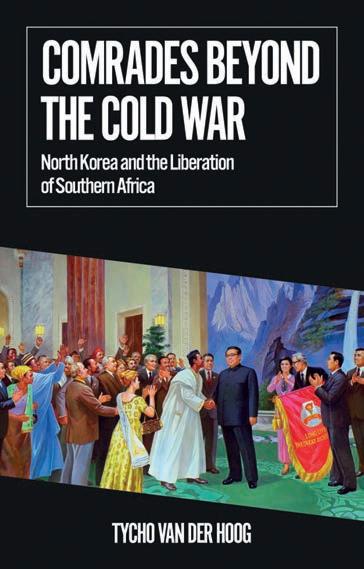

January 2025
9781805262787
216mm x 138mm
368pp
£25.00 Paperback International Studies / History World rights
A pioneering account of how African revolutionaries benefitted from North Korean aid in their struggles for independence—and how they repay this support today.
Published in collaboration with the
Tycho van der Hoog is Assistant Professor of International Security Studies at the Netherlands Defence Academy. His work focuses on African international relations. He holds a PhD from the African Studies Centre of Leiden University, and has conducted extensive field research in Africa, Europe, the United States and South Korea.


April 2025
9781805263050
216mm x 138mm
216pp
£27.00 Paperback Politics / Economy / History World rights
Reveals how international finance has kept its grip in post-independence Sudan.
Published in collaboration with the
HARRY CROSS
In 2019, a people’s revolution ended the thirty-year reign of Sudan’s military president Umar al-Bashir. A transitional government took power, led by esteemed international economist Abdalla Hamdok and promising a return to civilian rule. But Sudan’s new government quickly imposed a shock therapy programme of cuts, privatisations and devaluation, following the diktat of foreign lenders. In 2021, as Sudan grew poorer, the army seized on popular discontent to launch a coup, burying hopes for a democratic transition. But why did Sudan’s first civilian government in more than a quartercentury bend to the will of creditors at this crucial moment in the country’s history? The answer lies in an unwieldy and unpayable debt burden that has long constricted Sudanese politics and society.
Undoing a Revolution narrates the history of sovereign debt in Sudan from independence to the present, revealing the innovative policies adopted by Sudanese governments to manage their place in theglobaleconomy.Butitalsoshowshowexternal actors have leveraged the power of debt to impose their will and wreak havoc. With Sudan embroiled in civil war since 2023, Harry Cross explores the political implications of sovereign debt for states and societies across Africa, and around the world.
Harry Cross specialises in the economic and financial systems of contemporary Sudan. He has taught at Prince Mohammad bin Fahd University in Saudi Arabia, and the University of Liverpool. Currently working on the response to Sudan’s civil war for the research charity Impact, he holds a doctorate from Durham University.
‘Brown has a light touch, like that of a beguiling baba himself … effortlessly encompassing anecdotal and intellectual history. He is a wicked portraitist … playing to his strengths in this pornographic prosopography of snake-oil spiritualists.’ — The Times Literary Supplement
‘Enlightening … Fantastic stories—packed with unlikely figures, strange twists of fate and even the occasional act of mind-reading … an enjoyable journey.’ — The Economist
‘An entertaining history of the West’s fascination with Indian spirituality.’ — The Daily Telegraph
‘A work of compelling, stylish social anthropology.’ — The Times
‘Excellent … a drily amusing book on a subject that would make many writers nervous. It describes some startling stupidity as well as some very sharp behaviour without forcing the point, and includes fierce assertions by followers on both sides.’ — The Spectator
‘A fascinating tale of the West’s love affair with spiritualism … a masterful, compelling piece of history.’ — The Independent Books of the Month

Mick Brown writes regularly for The Daily Telegraph. His books include The Spiritual Tourist: A Personal Odyssey Through the Outer Reaches of Belief; The Dance of 17 Lives: The Incredible True Story of Tibet’s 17th Karmapa; and Tearing Down The Wall of Sound: The Rise and Fall of Phil Spector.


July 2025
9781805263104
198mm x 129mm
536pp, 17 b&w illus
£14.99 Paperback
History / Mind, Body & Spirit
World rights excluding South Asia and the Polish language
The captivating story of the West’s love affair with Indian spirituality—from the orientalism of the British Empire to modern counterculture.


May 2025
9781805263098
198mm x 129mm
408pp, 16 b&w illus
£14.99 Paperback
History / India
World rights excluding South Asia
The dramatic story of how hundreds of Indian princes were betrayed by the departing British and Nehru’s independent government.


By the same author:


JOHN ZUBRZYCKI
‘A gripping history—exhaustively researched, and written with all the pace and tension of a thriller—of how the fate of the princely states would be determined in the face of independence and Partition.’ — The Daily Telegraph
‘Set to become a classic on the end of India’s and Pakistan’s aristocracy.’ — The Spectator
‘A highly readable, balanced account [of] … the twilight of the princes [as] a turning point in history … comparable in scale to the unification of Italy … or of Germany.’ — The Times Literary Supplement
‘A thoroughly entertaining account of decline and fall.’ — Literary Review
‘A full, even-handed account of [a] political and constitutional saga.’ — The Critic
‘Journalistic flair shines through.’ — The Week
‘In the grand tapestry of Indian history, Dethroned stands as a seminal work that reshapes our understanding of Indian decolonisation.’
— International Journal of Asian Studies
‘Engagingly written, meticulously researched and peppered with delicious anecdotes.’ — Shashi Tharoor
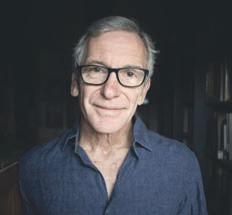
John Zubrzycki PhD has worked in India as a foreign correspondent and diplomat. His books with Hurst are Dethroned; The House of Jaipur; and Empire of Enchantment, chosen by William Dalrymple
as a Book of the Year. He is also the author of The Shortest History of India.
Shortlisted for the Bread and Roses Award for Radical Publishing
Longlisted for the Moore Prize for Human Rights
Writing
‘Heart-rending eloquence … [an] invaluable book.’
— The Wall Street Journal
‘Personal stories … from … years spent building trust.’ — The Irish Times
‘Brims with empathy and humanity.’ — Prospect
‘An impressive mix of history, political analysis and extensive reportage … a must read.’
— Asian Review of Books
‘Paints a deep, complicated and appalling picture.’
— Aditya Chakrabortty, The Guardian
‘An important story of our times.’ — Jon Snow
‘Tender, forensic, harrowing and beautifully human … an exceptional work of journalism.’
— Musa Okwonga
‘Sheds light on issues … mired in miscommunication and disinformation. We sincerely hope [this book] will be read widely.’ — Bread and Roses Award Committee Special Mention

Kaamil Ahmed is a journalist at The Guardian, covering international development. Born in East London, he previously lived in and reported from Jerusalem, Bangladesh and Turkey.
Kaamil studied at Queen Mary University of London. This is his first book.
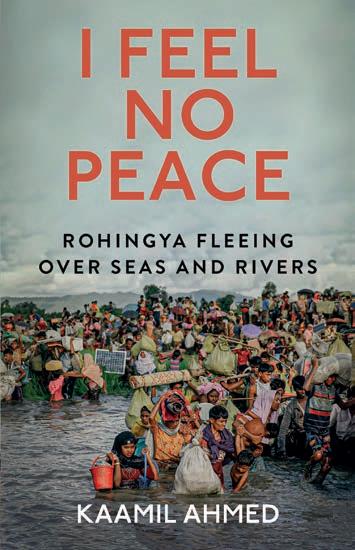

February 2025
9781911723929
198mm x 129mm
264pp
£12.99 Paperback Conflict / Human Rights World rights
A vivid portrayal of the Rohingya in exile, from an award-winning reporter.
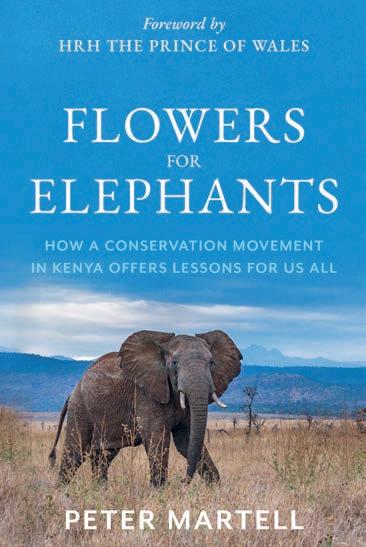

July 2025
9781805263128
216mm x 138mm
368pp, 57 colour illus
£14.99 Paperback
Environment / African Studies World rights
An uplifting story of endangered livelihoods and species saved, by communities fighting climate change and poaching.
PETER MARTELL
Foreword by HRH The Prince of Wales
‘A lesson [in] how a writer can instil empathy … The reader can taste affection for both the animals and humans in [Martell’s] storytelling.’
— The Daily Star
‘Deeply reported, beautifully written.’ — Jon Lee Anderson
‘Brings to life the extraordinary coexistence and resilience of nature and people … Martell’s prose captures this intriguing true story, a must-read.’ — Francis Ole Kaparo, former Speaker of the National Assembly of Kenya
‘Fascinating and timely. Emphasising the cultural bond between people and wild animals, Martell describes the dangers and rewards of working with local communities … Read it and buy copies for everyone who cares about the natural world.’ — Jane Goodall
‘An important book—by a devoted reporter … [for] the reading list of any Africa-bound traveller.’ — Sophy Roberts
‘Beautifully written, thoughtful … required reading for everyone who cares about elephants, Africa and the natural world.’ — John Simpson
By the same author: 9781849049597 £27.50



Peter Martell has reported from across Africa, Asia and the Middle East for two decades. His book on South Sudanese independence, First Raise A Flag (also published by Hurst), was an Economist and a Spectator Book of the Year.
Translated by RICHARD ROBINSON
‘Authoritative and accessible … As with Churchill or de Gaulle, a proper assessment of [Mannerheim’s] historical importance requires us to strip away the myths … Meinander [does this] admirably.’ — Financial Times
‘Oozes good sense and generosity … the new standard.’
— The Times
‘Riveting … timely.’ — Diplomatic Courier
Henrik Meinander is Professor of History at the University of Helsinki, formerly curator of Helsinki’s Mannerheim Museum and head of the Finnish Institute in Stockholm. His many books on Finnish and Nordic history include A History of Finland, also published by Hurst, which has been translated into seventeen languages.
A Financial Times Book to Read
NEW EDITION
Winner of the Fletcher U.S.–Russia Relations Book Prize
‘Makes a convincing case that [Putin’s] days in … St. Petersburg … as a liaison between the city, foreign business and [the] criminal underworld were just as formative [as his KGB years].’ — The Washington Post
‘Outstanding.’ — Peter Frankopan
Maximilian Hess is a writer and the founder of the political risk consultancy Enmetena Advisory. He is also a fellow at the Foreign Policy Research Institute and an associate Russia and Eurasia fellow at the International Institute for Strategic Studies. Max lives in London with his beloved Airedale terrier, Koba.
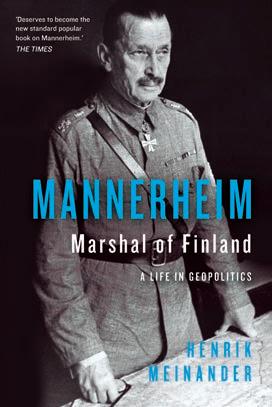

April 2025 • 9781805263142
216mm x 138mm
328pp, 41 b&w illus
£16.99 Paperback
History / Biography / Europe
World English rights


April 2025 • 9781805263166
216mm x 138mm • 368pp
£17.99 Paperback
Economics / Conflict / Europe
World rights
New Perspectives on Eastern Europe & Eurasia series
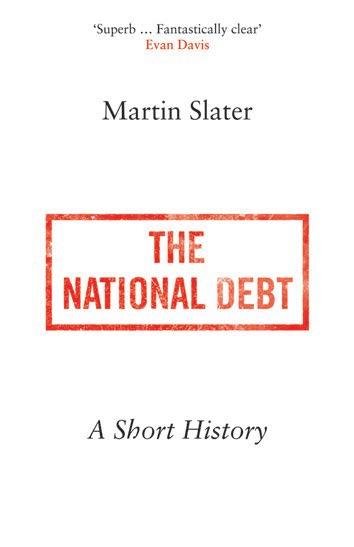

April 2025
9781805263135
216mm x 138mm
360pp
£14.99 Paperback
History / Economy / Politics World rights
NEW EDITION
A New Statesman Book of the Year
A Financial Times Summer Read
‘Interesting and important … pithy yet penetrating … Slater is a shrewd and entertaining guide.’
— The Daily Telegraph
‘An invaluable book on one of the UK’s most remarkable instruments of power.’ — Financial Times
‘A lively history, taking in wars, empires, constitutional change and slavery from medieval times to the 2008 crash and beyond.’ — Times
Higher Education
‘Sprightly … [and] even-handed.’ — Choice
‘Invaluable.’ — Journal of Modern History
‘Short, clear and readable.’ — Robert Skidelsky
‘A fantastically clear explanation of … the National Debt … [and] an entertaining account of its history … remarkably readable.’ — Evan Davis
‘Comprehensive and comprehensible.’ — Alistair Darling
The
story of our National Debt told through key events in British history.
‘A tremendously satisfying book … A must-read for all those concerned by austerity.’ — Ann Pettifor
‘One of the biggest economic issues of our times … a must-read.’ — Linda Yueh

Martin Slater was an economics fellow at St Edmund Hall, University of Oxford, for over thirty years, retiring in 2013. He also served as Oxford’s economics sub-faculty chair and as a managing editor of Oxford
Economic Papers. Principally an industrial economist, he is also interested in the peculiarities of debt.
‘Magisterial.’ — Mail & Guardian
‘Indispensable.’ — Africa Review of Books
‘Perceptive, multi-layered and judicious … comprehensive … a veritable tour de force … indispensable to anyone with an interest in Namibian, southern African, and, indeed, African history more widely.’ — Shula Marks, Emeritus Professor, SOAS University of London


May 2025 • 9781805263180
216mm x 138mm
474pp, 26 b&w illus
Marion Wallace is a historian focusing particularly on Namibia, a curator, and a library and archive specialist.
MEHRAN KAMRAVA
‘A glimmer of hope that transcends the intolerance of a myopic regime.’ — Geographical Magazine
‘Scholarship, expertise and incisiveness … an exhaustive work.’ — Asia Maior
‘An engaging narrative that vividly illustrates the post–Islamic Revolution era in Iran.’ — British Journal of Middle Eastern Studies
Mehran Kamrava is Professor of Government at Georgetown University in Qatar, and Director of the Iranian Studies Unit at the Arab Center for Research and Policy Studies. His books on Iranian and Middle Eastern affairs include Inside the Arab State, also published by Hurst.
£22.00 Paperback
History / African Studies World rights
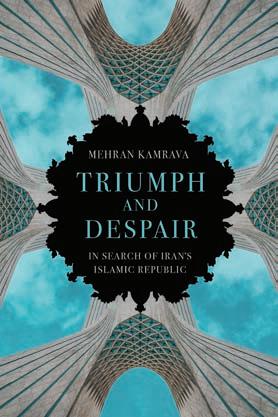

June 2025 • 9781805263197
216mm x 138mm • 424pp
£16.99 Paperback
Middle East / Politics World rights
Iran from the Pahlavis to the Present series
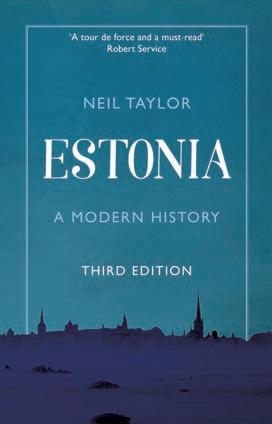

June 2025 • 9781805263159
216mm x 138mm
304pp, 16 colour illus
£17.99 Paperback History / Europe World rights excluding the Estonian language


June 2025 • 9781805263173
216mm x 138mm
376pp, 16 colour illus
£18.99 Paperback History / African Studies World rights
THIRD EDITION
‘The best history I have found.’ — Tyler Cowen, Marginal Revolution
‘An elegant, informative account of … a country that has emerged into the light after centuries of foreign dominance.’ — Robert Service
‘Timely and gripping … A treat for historians and travellers.’ — Adrian Bridge
Neil Taylor’s Bradt Travel Guide to Estonia (eighth edition) remains the definitive guidebook to the country. After a lifetime in the travel industry, having pioneered tourism to Estonia in 1992, he received an MBE in 2021 for contributions to UK–Estonia relations. He divides his time between London and Tallinn.
MALYN NEWITT
‘Scholarly and readable … a fascinating tale of a creole society created by a fusion of European and African elements, shaped by the geography of the great river.’
— The Times Literary Supplement
‘A meticulously researched and nuanced longue-durée history of the Zambezi River, which, as Newitt points out, has directly or indirectly shaped the destiny of Central Africa.’ — Liazzat Bonate, Lecturer in African History, University of the West Indies
Malyn Newitt is former deputy vice-chancellor of the University of Exeter, and the first holder of the Charles Boxer Chair, King’s College London. He has authored more than twenty books on Portugal and Portuguese colonial history, including A Short History of Mozambique and Emigration and the Sea, both published by Hurst.


9781911723417 / £18.99 hb
Food / Cultural History
‘Delightful.’ — The Guardian
‘Intriguing and impressively researched.’ — The Spectator


9781805260523 / £20.00 hb
Politics
A Financial Times Best New Politics Book
‘A lucid, engaging and insightful page-turner.’ The New Statesman


9781911723004 / £25.00 hb
Memoir / Sociology
‘A vivid, vivacious memoir of London’s journalism scene … Bose has elephantine powers of recall and … some killer punchlines.’ — The Times Literary Supplement


9781911723202 / £35.00 hb
Military Biography / History
‘Admirable … panoramic.’ The Times Literary Supplement
‘A major achievement.’ — Anthony Beevor
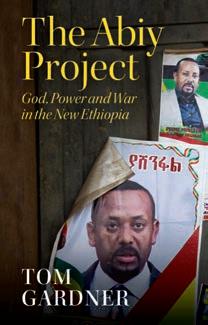

9781911723103 / £30.00 hb Africa / Politics
‘Groundbreaking … Its every page eye-opening, [this] is a testament to truth, justice, and human dignity … extraordinary.’
— Los Angeles Review of Books
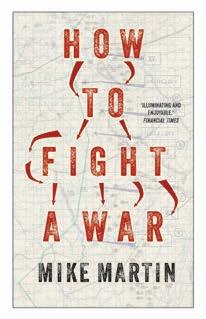

9781911723875 / £15.99 pb
Current Affairs / War
‘An illuminating and enjoyable account of warfare and guidelines to achieve lasting peace … Engaging style, rich in personal and historical anecdote … absorbing and logical.’
— Financial Times


9781911723097 / £25.00 hb History
‘Systematically reveals the questionable foundations of apologies for British colonialism … A masterclass in historical scholarship.’
— Australian Book Review
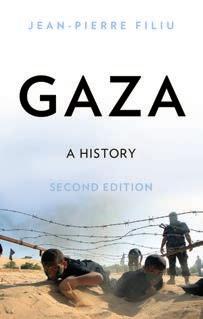

9781911723592 / £14.99 pb
Current Affairs / History / Middle East
A Guardian Book of the Year
‘A masterpiece in the literature of the Arab-Israeli conflict … Excellent but sobering.’
— The Sunday Times


9781911723219 / £30.00 hb
History
‘Fascinating … A fine social history of a nation … in transition.’ — The Times
‘Wonderfully balanced and illuminating.’ — David Kynaston


9781911723059 / £20.00 hb
Politics / Sociology
‘Remarkable … a book on identity politics that neither condemns nor embraces it … a nuanced cultural dissection.’
— Financial Times


9781911723042 / £25.00 hb
History / WWII
‘A blow-by-blow account … Meticulously researched.’
— The Times Literary Supplement
‘Pacy and engaging, breaking new ground.’ — Literary Review
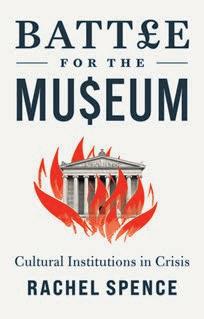

9781787387751 / £20.00 hb
Current Affairs / Museum Studies
‘A brave book, fluently written.’
— Literary Review
‘Uncovers the unsettling truth.’
— Geographical


November 2024
9781911723486
216mm x 138mm 280pp
£20.00 Hardback International Relations / European Studies / War Studies World rights
Who will defend Europe? The answer should be obvious: Europe should be able to defend itself. Yet, for decades, most of the continent enjoyed a defence holiday, outsourcing protection to the United States while banking an increasingly illusory ‘peace dividend’. Now, after three decades of reducing armed forces and drawing down defence industries, Europe finds itself close to unprotected—while Russia is intent on continuing its war of expansion, and the US is distracted and divided.
In this urgent, vital book, Keir Giles lays out the stark choices facing leaders and societies as they confront the return of war in Europe. He explains how the West’s unwillingness to confront Russia has nurtured the threat, and that Putin’s ambition puts the whole continent at risk. He assesses the role and deficiencies of NATO as a guarantor of hard security, and whether the EU or coalitions of the willing can fill the gap. Above all, Giles emphasises the need for new leadership in defence of the free world after the US has stepped aside— and warns that the UK’s brief moment of setting the pace for Europe has already been squandered.
Europe is sleepwalking into disaster. Who will rouse it to face the Russian threat?

Keir Giles has advised governments worldwide on the Russian threat. A senior fellow with Chatham House’s Russia and Eurasia Programme, and Director of the Conflict Studies Research Centre, he is a regular commentator for the BBC and international media. His prescient books include What Deters Russia and Moscow Rules.
DIANA DARKE
A Spectator and BBC History Magazine Book of the Year
Shortlisted for the A+C Book Award
‘An exhilarating, meticulously researched book.’
— The Guardian
‘Another brilliant challenge to Islamophobes everywhere, showing how much Gothic architecture drew on the forms and innovations of Arab architects and mathematicians.’ — William Dalrymple, The Spectator
‘Persuasive … argues that northern Europe’s greatest gothic buildings are deeply indebted to the Arab world … a useful reminder of the interconnectedness of civilisation.’ — The Observer
‘Fascinating … Revelatory [and] eye-opening.’
— Los Angeles Times
‘Extraordinarily ambitious … part cri de coeur and part textbook on Islamic architecture and its influence on the West.’ — The Times Literary Supplement
‘Intriguing and eye-opening.’ — Asian Review of Books
‘Original and enlightening.’ — Venetia Porter, The British Museum

Diana Darke has spent four decades in the Middle East. Her books include Islamesque (forthcoming from Hurst), My House in Damascus and The Ottomans. A non-resident scholar at Washington DC’s Middle East Institute, she holds degrees in Arabic and in Islamic Art and Architecture.


May 2024
9781911723479
234mm x 156mm
480pp, 152 colour illus
£17.99 Paperback
History / Architecture
World rights excluding the Arabic & Turkish languages
A revealing history of Islamic architectural influence on Europe’s cathedrals, palaces and monuments.
‘Darke writes … with love, clarity and authority.’ — Michael Palin


November 2024
9781805260974
234mm x 156mm
480pp, 150 colour illus
£25.00 Hardback
History / Architecture World rights
DIANA DARKE
Who really built Europe’s finest Romanesque monuments? Abbots and bishops presiding over holy sites receive mentions aplenty throughout history, while their highly skilled creators remain anonymous. But the buildings speak for themselves.
In this groundbreaking book, Middle East cultural historian Diana Darke explores the evidence embedded in medieval monasteries, churches and castles across Europe, from Mont Saint-Michel and the Leaning Tower of Pisa to Durham Cathedral and the Basilica of Santiago de Compostela. Tracing the origins of key decorative and architectural innovations during this pre-Gothic period—acknowledged as the essential foundation of all future European construction styles—she sheds new light on the mystery masons, carpenters and sculptors behind these masterpieces.
A fascinating exploration of Europe’s medieval architectural wonders— and the Muslim masterbuilders behind them.
Her discoveries are dramatic. At a time when Christendom lacked such expertise, Muslim craftsmen, with their advanced understanding of geometry and complex ornamentation styles, dominated the high-end construction industry in Islamic Spain, Sicily and North Africa, spreading their knowledge and techniques across Western Europe. Challenging Euro-centric assumptions about the continent’s built heritage, Darke uncovers the profound influence of the Islamic world in ‘Christian’ Europe, and argues that ‘Romanesque’ architecture, a fiction first invented by nineteenthcentury French art historians, should be recognised as what it truly is: Islamesque.
By the same author:


9781849049405
£25.00 hb
Available now
Between the end of the Second World War and the first decades of the twenty-first century, Britain became multicultural. This book tells the remarkable story of how that came about.
Kieran Connell, an historian of Irish and German heritage who grew up in Balsall Heath, innercity Birmingham, takes readers into multicultural communities across Britain at key moments in their development. He also shines a light on the shifting nature of British racism, revealing the day-to-day effects it had—and still has—on ethnic minority groups.
Journeying far beyond London, Multicultural Britain delves into the messy contradictions at the heart of a country’s transition into the diverse society we know today. It highlights the vital role of ordinary people in the making of multicultural Britain, and takes aim at public leaders, from Enoch Powell to Harold Wilson to Margaret Thatcher, who have too often legitimised racism for their own political ends.
In post-Brexit Britain, between Black Lives Matter and anxieties around immigration, how communities and individuals live together remains one of the most urgent issues of our time. Connell offers a fresh perspective on British multiculturalism as a rich and complex lived reality—not simply as a problematic idea.
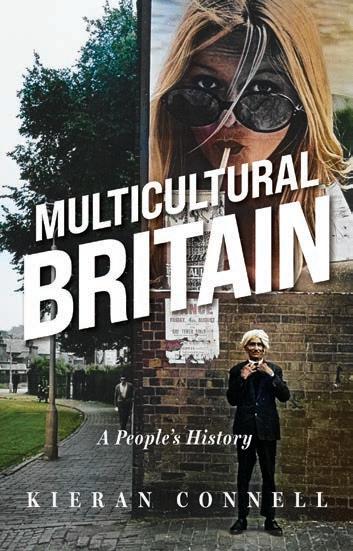

August 2024 9781911723516
216mm x 138mm
428pp, 20 b&w illus
£25.00 Hardback
Sociology / History World rights
A new history of how we became multicultural, revealing the personal and community relationships that underpin Britain’s post-imperial transition.

Kieran Connell is a writer and historian based at Queen’s University Belfast. His first book, Black Handsworth: Race in 1980s Britain, was shortlisted for the Whitfield Book Prize.


August 2024
9781911723509
216mm x 138mm
320pp
£14.99 Paperback
Current Affairs / Sociology / Economics
World rights
DANNY DORLING
Suppose you chose seven typical children to represent today’s UK. Who would they be? What would they reveal?
Seven Children is about hidden realities of injustice and hope. In his highly original, thoughtprovoking new book, inequality writer Danny Dorling constructs seven ‘average’ children from millions of statistics—each child symbolising the very middle of a parental income bracket. From the poorest to the wealthiest, Dorling’s seven children were born in 2018, when the UK faced its worst inequality since the Great Depression and became Europe’s most socially divided nation. They turned 5 in 2023, amid a devastating costof-living crisis. Their country has Europe’s fastestrising child poverty rates, and even the best-off of the seven is disadvantaged. Yet aspirations prevail, and change is possible.
We are all getting poorer. What does that reality look like for British children, and for their future life chances?
Immersive and intimate, this book gets to the heart of post-pandemic Britain’s most pressing economic, social and political issues. What do we miss when we focus only on the superrich and the most deprived? What kinds of lives are British children living, between those two extremes? Who are today’s real middle class? And what if tomorrow’s challenge isn’t spiralling inequality, but how to reverse the new trend that leaves all children worse off than their parents?

Danny Dorling is a social scientist whose books include Inequality and the 1% and All That Is Solid. He is the Halford Mackinder Professor of Geography at the University of Oxford, and a patron of RoadPeace, Comprehensive Future and Heeley City Farm. In his spare time, he makes sandcastles.
On 19 September 2023, war broke out once again in Nagorno-Karabakh, a tiny breakaway state nestled in the mountains at the very edge of Europe.
For three decades since the fall of the Soviet Union, this battle-scarred geopolitical hotspot had been fought over in a bloody standoff that left tens of thousands dead and as many as a million people homeless. This time, though, things were different. Within 24 hours, Armenian forces surrendered in the face of an overwhelming Azerbaijani offensive, as Russian peacekeepers abandoned their positions—and the entire local population packed their bags to flee.
Through the eyes of ordinary Armenians and Azerbaijanis, Gabriel Gavin chronicles how Nagorno-Karabakh went from an ancient home shared by both peoples to a land of empty houses and untended graves, as the world looked on.
Ashes of Our Fathers offers unprecedented insight not only into a simmering ethnic conflict inside the Kremlin’s self-declared sphere of influence, but into the lives, loyalties and national ideas of the people caught up in the chaos; and into the decisions, from Yerevan and Baku to Moscow and Washington to Tel Aviv and Tehran, that led directly to one of the worst humanitarian catastrophes of the 2020s.

Gabriel Gavin is a journalist and writer from Oxford, England. He has covered the politics and foreign affairs of the former Soviet Union and Turkey as a reporter for Politico, as well as for outlets including Time, Foreign Policy and The Spectator. This is his first book.


January 2025
9781911723578
216mm x 138mm
280pp
£20.00 Hardback
Current Affairs / Eurasia / Conflict
World rights
Vivid reportage from a war at the edge of Europe, between two ancient peoples caught up in great power interests and clashing narratives of home.
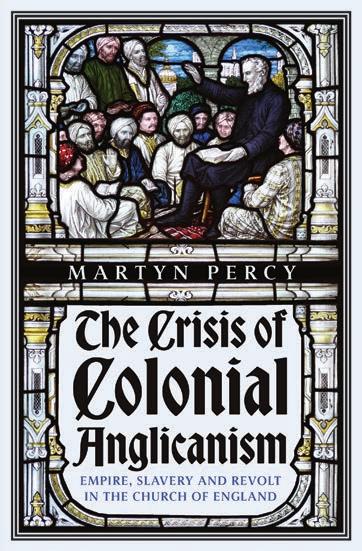

January 2025
9781911723585
216mm x 138mm 352pp
£25.00 Hardback History World rights
This book offers a fresh, bold and unsettling truth: the British Empire and Great Britain are primarily English constructions; and the Church of England has presumed to act for and benefit from English enterprise and exploitation, serving as the spiritual arm of the imperial project. English Anglicanism has developed itself as the lead character within its own ‘serious fiction’—the main religious player in a drama of Church and Empire. Yet, in collusion with colonialism, it is now a prisoner of its own historical amnesia.
Martyn Percy examines the English interests concealed in appeals to Britishness, and shows how slavery, exploitation, classism and racism played their part in the elitist and hierarchical worldviews propagated by the English to bolster both Empire and Church. Yet, by regarding the rest of the world as lesser, both institutions have slowly degenerated in global standing. Now, ‘Britain’ and the Church of England are no more than minor national players on the world stage.
A hard-hitting critique of the Church of England as a social, spiritual and financial driver and beneficiary of the British Empire.
Religious, social and political imperialism are founded on the deprecation of others. Yet those peoples who were once looked down upon have fought for equality and independence. Today, the worldwide Anglican Communion faces a new era of moral reckoning.

Martyn Percy is ProvostTheologian for Hong Kong Sheng Kung Hui; Senior Research Fellow at the James Hutton Institute; and Honorary Fellow at the Universities of Edinburgh, London and Oxford. He has written for The Guardian and The Times, and is the only living theologian featured in The Da Vinci Code.
When the hammer and sickle flag came down at the Kremlin at the end of 1991, a feverish new market opened for business: Russia. In 2022, as soon as Putin’s troops invaded Ukraine, that market started to collapse, as Western firms fled the skyscrapers of Moscow and beyond.
No other country of this scale has transformed itself so dramatically, so quickly—not just once, but twice. Over three turbulent decades, a wild, proto-capitalist free-for-all came seductively close to becoming a predictable place to do business. And then it all unravelled. Russia’s post-Soviet years have seen phenomenal successes, crushing failures, and the creation and destruction of enormous fortunes. How did it all happen?
Charles Hecker tells the gripping, three-act story of international business in Russia since the fall of the USSR. What have global companies learnt—or failed to learn—about Russia over the course of this adventure? And beyond Russia, what do we now understand about the way countries and companies interact in the face of relentless change? Zero Sum brings to life the complexity, the nuance and the vivid colour of one of the greatest experiments in the history of global commerce.
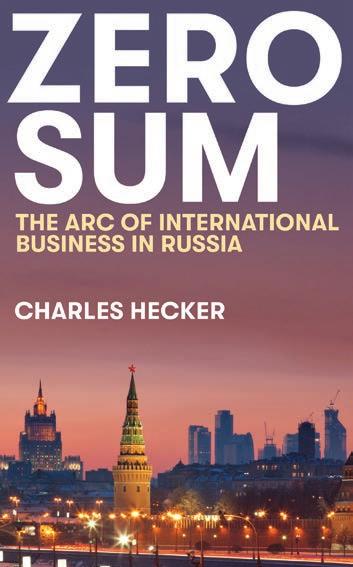

November 2024
9781911723561
216mm x 138mm
352pp
£25.00 Hardback
Current Affairs / Business / Russia
World rights


Charles Hecker has spent forty years travelling and working in the Soviet Union and Russia. He has worked as a journalist and a geopolitical risk consultant, and has lived in Miami, Moscow and London. A fluent Russian speaker, he holds degrees from the University of Pennsylvania and Harvard University.
In the series NEW PERSPECTIVES ON EASTERN EUROPE & EURASIA Edited by Dr Ben Noble


An insider’s account of the rise and fall of Western business ventures in post-Soviet Russia.
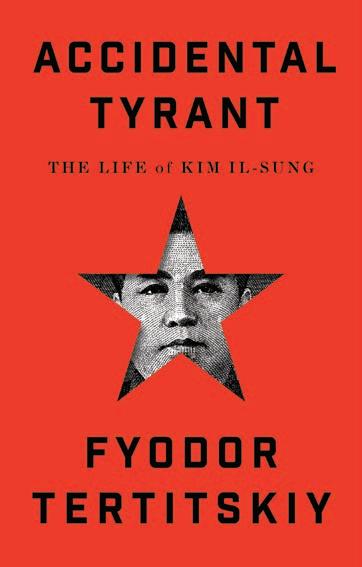

January 2025
9781911723547
216mm x 138mm
352pp, 50 b&w illus
£25.00 Hardback
Biography / East Asia
World rights excluding the Korean & Russian languages
Kim Il-sung was the enigmatic architect of North Korea. His life is an extraordinary tale of improbable success: once a barely educated guerrilla fighter, he rose to lead the nation at the young age of 33. Against all odds, he established a horrifyingly stable dictatorial regime, one that still struggles to provide for its people, yet could obliterate Hollywood, Silicon Valley and much of East Asia in nuclear strikes.
Based on extensive new sources in Korean, Russian, Chinese and Japanese, Fyodor Tertitskiy tells the unlikely story of one of the twentieth century’s most brutal but little-known dictators, from his early life in Japanese Korea to the lasting repercussions of his autocratic rule today. Tertitskiy showcases Kim’s political prowess in gaining autonomy from the USSR; explores how his inept economic policy led to catastrophic famine; and highlights how he implemented a system of hereditary rule, paving the way for today’s ‘Supreme Leader’, Kim Jong-un, to assume power and continue his grandfather’s vision.
A masterful new biography of North Korea’s despotic founding father and his enduring impact on his country today.
Accidental Tyrant serves as a stark cautionary tale, underscoring that the triumph of liberty is never guaranteed. Met with insufficient resistance, even the most unlikely leader can build a regime of repression and privation that long outlives its founder.

Fyodor Tertitskiy has been living in South Korea for more than a decade, where he researches North Korean political, social and military history. He has authored several books in English and Korean, including Soviet–North Korean Relations During the Cold War and The North Korean Army: History, Structure, Daily Life.
CHRISTOPHER BECKMAN
A Twist in the Tail takes readers on a tantalising voyage through European and American gastronomic history, following the trail of a small but mighty fish: the anchovy.
Whether in ubiquitous Roman garum , massproduced British condiments, elaborate French haute cuisine or modern Spanish tapas, anchovies have been enhancing the flavour of many dishes for thousands of years. Yet, depending upon the time and place—and who was eating them—they have also been disdained as worthless little fish, deemed too small, bony and inconsequential for popular or elite consumption. From Western Europe to the USA, Christopher Beckman shows how the evolving and ambiguous status of anchovies provides surprising insights into the relationship between food, class and status throughout history.
Drawing on cookbooks, literature and art, this is the hidden story of the diminutive anchovy, and its outsized role in shaping the West’s cuisine.


July 2024
9781911723417
216mm x 138mm
368pp, 38 b&w illus
£18.99 Hardback
Food & Drink / History
World rights

Christopher Beckman was born in San Francisco and has a doctorate in Archaeology. Based in Geneva, his research focuses on the links between material culture and subsistence patterns. He has lived in the Middle East and Africa, with a stint in Hollywood producing horror films. This is his first book.
A captivating culinary journey through the West’s love-hate relationship with anchovies.
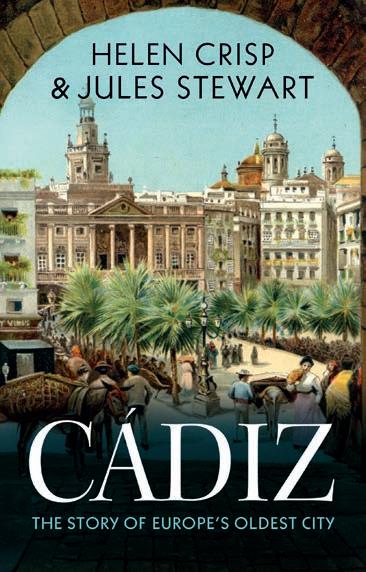

November 2024
9781911723615
216mm x 138mm
324pp, 60 colour illus
£25.00 Hardback
History / Europe World rights
This is the tale of Western Europe’s oldest continuously inhabited city, a 3,000-year history of war and seafaring, culture and commerce, liberalism and resistance.
Helen Crisp and Jules Stewart offer a vibrant account of Cádiz past and present, from its ancient founding myths to its reinvention as a trendy tourist destination. They illuminate Cádiz’s experiences under Roman and Moorish rule; explore its centuries of maritime warfare, from Francis Drake to the Battle of Trafalgar; and probe its role in Spain’s ‘Golden Age’ of empire, when it dominated trade with the New World. As Spain’s de facto capital during the Peninsular War, Cádiz also produced Europe’s first liberal constitution in 1812. And in 1936, it was the port of entry for Franco’s troops, mustered to overthrow the Republic.
Cádiz has excited the passions of travellers for centuries. Lord Byron was enchanted by the ladies of the city, whom he described as ‘form’d for all the witching arts of love’. Benjamin Disraeli fell in love with Cádiz in 1830, seeing ‘Figaro in every street and Rosita in every balcony’. This beautifully illustrated book, the first to tell the full story of this intriguing and extraordinary city, brings its past to life.
A captivating portrait of an overlooked Andalusian gem.
Helen Crisp is fascinated by Spain’s history, landscapes and lesser-known museums. She is coauthor, with Jules Stewart, of Madrid: Midnight City and Strike Up the Band: New York City in the Roaring Twenties. Jules Stewart is a journalist and author, whose thirteen book topics include the NYPD and Prince Albert.
Lithuania is often portrayed as a small nationstate that has survived against the odds of history: together with Estonia and Latvia, it won independence at the end of the First World War, lost it to the Soviet Union in 1939–40, regained it in 1990–1, and joined NATO and the EU in 2004, angering the Kremlin. But Lithuania’s rich and complex history stretches back much further than these events, and much further than many realise.
In the fourteenth century, Europe’s last pagan dynasty ruled a vast empire stretching from forests on the Baltic shores to the steppes north of the Black Sea. Forging a remarkable, liberty-based union with the Kingdom of Poland, for 400 years the Grand Duchy of Lithuania blocked Moscow’s pretensions to rule all of Rus’, particularly Belarus and Ukraine. Yet it was in competition with Poles, and under Russian imperial rule, that the modern ethnic Lithuanian nation emerged in the nineteenth century.
This is a lively and accessible history of a fascinating country that was once much larger than it is today; a land where, for centuries, peoples and communities—including Belarusians, Ukrainians, Germans, Poles, Russians, Jews, Karaites and Tatars—lived together in concord and discord.
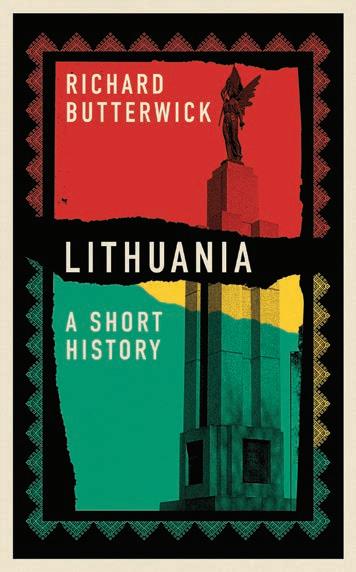

December 2024
9781911723608
216mm x 138mm
320pp
£18.99 Paperback
History / Eastern Europe
World rights
Richard Butterwick is Professor of PolishLithuanian History at the School of Slavonic and East European Studies, University College London; Principal Historian of the Polish History Museum; and Chairholder of the European Civilization Chair in the College of Europe in Natolin, Warsaw. His books include the awardwinning The Polish-Lithuanian Commonwealth, 1733–1795.
The first popular history of a small post-Soviet state, and a very old European power.


September 2024
9781911723691
216mm x 138mm
400pp
£27.50 Hardback History World rights
PHILIP W. BLOOD
The Nazis, Churchill and the ‘Stalingrad of the West’
This book narrates the tumultuous era of total war through the fate of Aachen—Imperial Germany’s seat of power for 600 years, site of Charlemagne’s coronation as Holy Roman Emperor, and a place with greater geopolitical significance for Adolf Hitler in 1944 than Stalingrad in 1943.
This was a stark contrast with the events of the Great War: in 1918, the Imperial German Army had abandoned Aachen in a rout-like flight. In the Nazi period, however, Aachen became a major symbol of Germany’s defiance against the Allies. For Hitler—his mind warped after surviving the Stauffenberg bomb plot—Germany’s westernmost city became pivotal in his last-ditch defence of the ‘thousand-year Reich’.
A
micro-history of
‘Charlemagne’s city’ in the First and Second World Wars, its inhabitants’ embrace of Nazism, and Churchill’s response.
War Comes to Aachen weaves together the city’s story from 1900, tracing its entrenched Catholic orthodoxy, its growth as an industrial urban centre, the demise of democracy, the rise of Nazism, the two world wars, and the Holocaust. The book surveys Churchill’s wartime leadership and the destruction of pre-war Aachen through the lenses of military history and the anthropology of aerial bombing. Philip W. Blood’s absorbing history concludes with Allied efforts to reshape German society after 1945, and with the use of remembrance as a means of socio-political control.
Philip W. Blood is a British military historian who lives in Aachen. His books include Birds of Prey: Hitler’s Luftwaffe, Ordinary Soldiers, and the Holocaust in Poland.
Huang Chin-tao was born in 1926, when Taiwan was still part of the Japanese Empire. By the time he died in 2019, Taiwan was a bustling, hightech democracy—and Huang had lived through every twist and turn along the way. He served as a Japanese soldier in China during World War II; joined an armed uprising against Taiwan’s Chinese Nationalist post-war government; spent twentyfour years imprisoned during the island’s decades of martial law; and finally emerged to help lead the pro-democracy movement of the 1980s in his hometown, Nantun.
Drawing upon archives, memoirs, interviews and more, Anna Beth Keim tells the story of Taiwan through the journey of one extraordinary individual. From his childhood scuffling with Japanese children to his transformation into a ‘democracy farmer’, Huang’s life vividly reflects contemporary Taiwanese history, and continues to inspire young Taiwanese today who are fighting to keep their home independent.
Over roughly a century, the island transitioned from an imperial outpost to an authoritarian state to a democracy—one still at risk of being snuffed out by China. This story is uniquely Taiwanese, yet illuminates experiences shared by countries everywhere: of colonisation and its aftermath, and the ongoing struggle to be free.
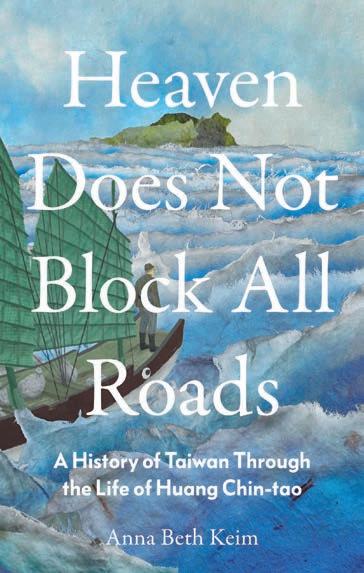

January 2025
9781911723622
216mm x 138mm
352pp
£25.00 Hardback
History / Biography / East Asia
World rights
Anna Beth Keim is a freelance writer and translator, who has been reporting on Taiwan since 2015. Her work has appeared in ChinaFile, Foreign Policy, YaleGlobal and The Foreign Service Journal. This is her first book.
A hundred-year history of the challenges and triumphs of contemporary Taiwan, through the inspiring true story of one man who lived through it all.
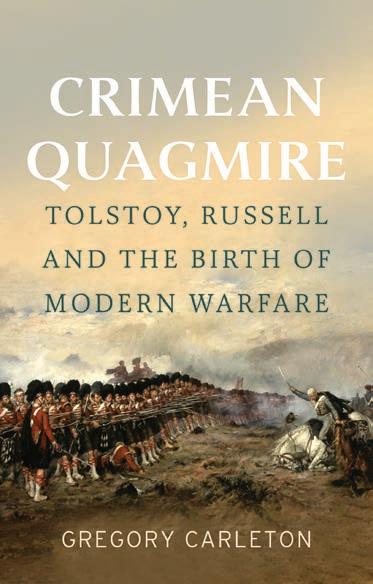

August 2024
9781911723639
216mm x 138mm
264pp
£27.50 Hardback
History / Media Studies World rights
The intriguing story of how two revolutionary writers and their pioneering war reporting changed the way we think about modern conflict.
The Crimean War was the greatest international crisis of the Victorian era. And during this conflict, two embedded writers—the young Russian officer Lev Tolstoy, and William Howard Russell, an Irish correspondent for The Times —brought the horrors of modern combat home to the public for the first time.
Long recognised for introducing new technologies like the rifle, railroad and telegraph, the Crimean War also irrevocably changed how we understand warfare. Stripping away the romanticism of the Napoleonic era, Tolstoy and Russell exposed how their governments were using lies and coverups to propel their nations into the first quagmire of our age. Their writing shocked readers, demonstrating that their loved ones were dying needlessly—a revelation confirmed by soldiers’ letters and diaries. Never before had the world witnessed such a showdown between the voices of private individuals and those of their governments. Tolstoy and Russell confronted the politically powerful and paid dearly for their honesty, but their legacy remains almost unparalleled.
Crimean Quagmire is the first book to tell the full story of both writers and their impact on modern warfare and reporting. As quagmires have increasingly come to define contemporary conflict, the Crimean War has never been more relevant.
Gregory Carleton is Professor of Russian Studies at Tufts University. He has devoted his career to engaging students and readers with the challenges and mysteries of Russia’s culture, history, literature and people, publishing extensively on these topics. Crimean Quagmire is his fourth book.
MICHAEL A. HOROWITZ
Days before his country signed a deal to normalise ties with Israel, the Emirati Ambassador to the US penned an article in Hebrew, directly addressing Israelis. Israel, he argued, faced a choice between engagement with the rest of the region, or isolation. His words struck a chord then, and will continue to ring true in the decades to come.
Michael A. Horowitz tells the unfolding story of this decision: of tension between the hope ushered in by the normalisation agreements, and the enduring despair both Israelis and Palestinians feel about the waning prospects of peace. Rather than examining the past, Horowitz looks to Israel’s future—one marked by new opportunities, but also tremendous challenges, as the country tries to find its place in a region trying to find itself.
Israel is a ship in a storm, navigating a ‘new’ Middle East where unfinished revolutions, regional competition, perceived US disengagement and an unstable but menacing Iran all warrant caution. In the ‘promised land’ itself, existing gaps are widening, and the space for optimism is shrinking. Hope and Despair is a brutally honest exploration of what lies ahead for Israel: the waves, the winds, and the ray of light above the clouds.
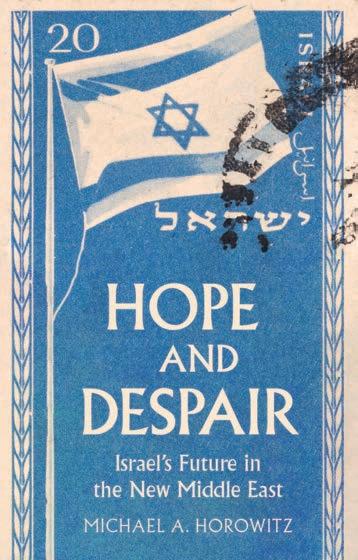

May 2024 9781911723196
216mm x 138mm
312pp
£30.00 Hardback Middle East / Politics World rights
Michael A. Horowitz is a renowned geopolitical expert, focussing on the Middle East. After serving in the IDF, he has held positions in consultancies in Israel and the Gulf, advising local and foreign governments, NGOs and global corporations. He writes commentary and analysis for both regional and international media.
A frank assessment of Israel’s uncertain place in a region scarred by conflict and insecurity. Where can the country and its people go from here?


August 2024 • 9781911723875
198mm x 129mm • 280pp
£15.99 Paperback War Studies
World rights excluding Southern Africa, South Asia, and the Traditional Chinese & German languages
By the same author:


9781849048910
£15.99 pb
Available now
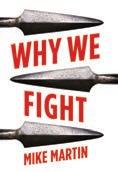

9781787384897
£12.99 pb
Available now
An indispensable guide to understanding modern warfare, especially the decisions made by politicians and generals— both good and bad.
MIKE MARTIN
‘An illuminating and enjoyable account of warfare and guidelines to achieve lasting peace ... written in an engaging style, rich in personal and historical anecdote, that lays out complex issues in an absorbing and logical way.’ — Financial Times
‘Many of today’s pundits, journalists, and socalled “experts” would do well to put down their phones, give their thumbs a rest, and pick up Martin’s How to Fight a War.’ — Diplomatic Courier
‘Essential reading.’ — Times Radio
‘Compelling, timely and very accessible. How to Fight a War shows that behind the complex horrors of conflict lie simple and enduring truths about humankind.’ — Sir Nick Clegg
‘An excellent summary.’ — Politique étrangère
‘Enlightens the reader about principles that have been forgotten in Western societies in recent decades.’ — Frankfurter Allgemeine Zeitung
‘Colourful, punchy, admirably challenging and clear—essential reading for every soldier, officer and General.’ — General Sir Patrick Sanders, Chief of the General Staff, British Army
T L r a i ri a di ri

Mike Martin is Senior Visiting Research Fellow in the Department of War Studies at King’s College London, where he speaks and writes on conflict. His previous books, also published by Hurst, are An Intimate War; Crossing the Congo; and Why We Fight. He tweets about conflict and geopolitics as @ThreshedThought.
Decolonisation has lost its way. Originally conceived as a struggle to escape the West’s direct political and economic control, it has become a catch-all idea, often used to perform contemporary ‘morality’ or ‘authenticity’. In the process, it suffocates African thought, and denies African agency.
Olúfẹ mi Táíwò fiercely rejects the indiscriminate application of ‘decolonisation’ to everything from literature, language and philosophy to sociology, psychology and medicine. He argues that the decolonisation industry, obsessed with exposing slights and cataloguing wrongs, is seriously harming scholarship on and in Africa. He finds decolonisation as applied to culture intellectually unsound and wholly unrealistic, conflating modernity with coloniality, and groundlessly advocating an openended undoing of global society’s foundations. Worst of all, today’s movement attacks its own proclaimed cause: ‘decolonisers’ themselves are disregarding, infantilising and imposing values on contemporary African thinkers.

June 2022
9781787386921
190mm x 126mm
368pp
£14.99 Paperback
Current Affairs / Philosophy / Africa
World rights
This powerful, much-needed intervention questions whether today’s ‘decolonisation’ truly serves African empowerment. Táíwò’s is a bold challenge to all concerned for Africa’s future: to resist sweeping moralities, and grant the respect due to African intellectuals as innovative adaptors, appropriators and synthesisers of ideas they have always seen as universally relevant. It’s time to reclaim decolonisation, within the constraints of what is measurable, achievable and desirable. Published

Olúfẹmi Táíwò is Professor of African Political Thought and current Chair at the Africana Studies and Research Center, Cornell University. His writings have been translated into French, Italian, German and Portuguese. He has taught at universities in Canada, Nigeria, Germany, South Korea and Jamaica.
A leading African political philosopher offers his searing intellectual and moral critique of the ‘expanded’ decolonisation movement.


REANNOUNCING
September 2020
9781787381919
216mm x 138mm 208pp
£20.00 Hardback History World rights
A dazzling history of Africans in Europe, revealing their diverse contributions in shaping the Continent.
Africans and African Europeans are widely believed to be only a recent presence in Europe, a feature of our ‘modern’ society. But as early as the third century, St Maurice—an Egyptian— became the leader of a legendary Roman legion. Ever since, there have been richly varied encounters between those defined as ‘Africans’ and those called ‘Europeans’, right up to the stories of present-day migrants to European cities. Though at times a privileged group that facilitated exchanges between continents, African Europeans have also had to navigate the hardships of slavery, colonialism and their legacies.
Olivette Otele uncovers the long history of Europeans of African descent, tracing an old and diverse African heritage in Europe through the lives of individuals both ordinary and extraordinary. This hidden history explores a number of questions very much alive today. How much have Afro-European identities been shaped by life in Europe, or in Africa? How are African Europeans’ stories marked by the economics, politics and culture of the societies they live in? And how have race and gender affected those born in Europe, but always seen as Africans?
African Europeans is a landmark celebration of this integral, vibrantly complex slice of European history.

Olivette Otele is Professor of the History of Slavery at Bristol University and VicePresident of the Royal Historical Society. She is an expert on the history of people of African descent and the links between memory, geopolitics and legacies of French and British colonialism.
A global energy revolution is unfolding before our eyes: ever-growing numbers of electric vehicles on our roads, laptops that last all day on a single charge, and solar panels on our roofs, all reliant on lithium-ion batteries. This revolution is happening at breath-taking speed, with the potential to completely transform key industries and the way we live.
For the first time in history, we can now actually store this green energy we talk so much about. Often referred to as ‘the new oil’, lithium allows large amounts of energy to be squeezed into a very small space. Demand is soaring, and the lithium business is full of drama: bitter rivalries, shady deals and exceptionally talented visionaries such as Elon Musk, who is building lithium battery giga-factories across the world.
This book travels from the salt lakes of the Tibetan plateau, where Chinese government–linked companies extract lithium, to Argentina, Chile and Bolivia, which hold the world’s biggest resources of the mineral. It reveals superpowers’ struggles to secure strategic supplies, and the astonishing efforts of lone-wolf inventors and entrepreneurs. Lithium also explores the environmental impact of lithium extraction, the limits to battery electrification, and lithium battery recycling as the way forward.

July 2021
9781787385634
216mm x 138mm
256pp
£25.00 Hardback
Environment / Economics World rights
Lukasz Bednarski is Senior Battery Materials Analyst at IHS Markit, founder of the lithium industry portal Lithium Today and a former commodity trader.
How a little-known mineral will affect our jobs and daily lives as much as, if not more than, AI or Big Data have done.

October 2022
9781787387775
216mm x 138mm
344pp
£20.00 Hardback War Studies / Technology World rights
BLEDDYN E. BOWEN
Space technology’s ‘original sin’ is its militaristic heritage: Earth orbit was first exploited to enhance the killing power of the state. In Bleddyn E. Bowen’s vivid retelling, the Moon landings and the launch of the Space Shuttle were mere sideshows, drawing public attention away from the real objectives of this technology: gaining military and economic power for terrestrial purposes.
Today, there are thousands of active satellites in space, working silently in the background to provide essential military, intelligence and economic capabilities. No major power can do without them. Beyond Washington, Moscow and Beijing, Bowen’s story of ‘spacepower’ charts the evolution of truly global technologies—from the ground floor of the nuclear missile revolution, to today’s orbital battlefield shaping the wars to come, as world powers including India, Japan and Europe fully realise the strategic benefits of commanding Earth’s ‘cosmic coastline’.
An
eye-opening
account of how spacepower and the prospects of space warfare are shaping international relations on Earth.
Yet, as new entrants gradually but methodically spend more on outer space, as a stage for war, development or prestige, there is scope for cautious optimism about the future of the Space Age—if we can recognise, rather than hide, its original sin.

Bleddyn E. Bowen is Associate Professor of International Relations at the University of Leicester, specialising in space policy and military uses of outer space. The internationally recognised author of War in Space, he consults on space policy for institutions including the UK Parliament, the European Space Agency, and the Pentagon.
‘An urgent and important book.’ — Financial Times
‘A brilliant, well written and important book. Thoroughly recommended.’ — LSE Review of Books
‘This book, written by one of the greatest living development economists, is full of hard-won insights and provocative observations. Dercon’s radical modesty, fierce intelligence and deep commitment to describing what actually occurs in the field—in all its hypocrisy, comedy, tragedy, mystery and idealism—distinguishes him in a field too often defined by naive optimism and snake oil solutions.’ — Rory Stewart, former UK Secretary of State for International Development
‘A challenging, informed and insightful book. Dercon brings expertise, humility and humanity to the vital question of what makes countries poor and what can help them prosper.’ — David Miliband, President and CEO, International Rescue Committee, and former UK Foreign Secretary

international development policy, he is a former DFID chief economist and policy advisor to the UK Foreign Secretary.



April 2023
9781805260080
216mm x 138mm
412pp
£16.99 Paperback Development Studies
World rights excluding the Arabic, Simplified Chinese & Turkish languages
How do countries achieve development? According to a leading economist, success arises when elites bet on growth.
Stefan Dercon is Professor of Economic Policy and Director of the Centre for the Study of African Economies at the University of Oxford. Combining an academic career with long experience in I T L i i i i d r i ra i

July 2021
9781787385580
216mm x 138mm
312pp, 16pp colour illus
£18.99 Hardback
History / Travel / Europe World rights
HELEN RODGERS & STEPHEN CAVENDISH
Granada is a deceptive city, concealing a layered past and a complex character. The last Muslim capital in Western Europe, over the centuries it has captured the hearts and imagination of its inhabitants, and featured in countless myths and legends. Yet historical evidence reveals real tales from Granada that are even more fascinating: a romantic epic of secrets and follies, victory and failure, poetry and art.
City of Illusions brings together Granada’s many stories—the archaeological forger, the renegade French general, the garrotted liberal heroine, and the Jewish poet and right hand of two Muslim rulers. From the founding dynasty to the building of the Alhambra, to the Reconquista, French occupation and Spanish Civil War, this is the history of Granada from its eleventh-century origins to the present day.
Granada’s historical narrative has long been fought over, recreated, idealised or buried. Elegant and deeply researched, this book sets the record straight, delving into the true story of a beautiful city, with all its quirks, mysteries, intrigues and triumphs.
A scintillating history of one of Europe’s most alluring cities.
Helen Rodgers is an Arabist, whose fascination for the history of the Arab world has led to over two decades of historical research across the Mediterranean region. Stephen Cavendish is a writer, editor and historian with a passion for the medieval and modern history of Europe and the Middle East.
With Russian shells raining on Kyiv and tanks closing in, American forces prepared to evacuate Ukraine’s leader. Just three years earlier, his apparent main qualification had been playing a president on TV. But Volodymyr Zelensky reportedly retorted, ‘I need ammunition, not a ride.’ Ukrainian forces won the battle for Kyiv, ensuring their country’s independence even as a longer war began for the southeast.
You cannot understand the historic events of 2022 without understanding Zelensky. But the Zelensky effect is less about the man himself than about the civic nation he embodies: what makes Zelensky most extraordinary in war is his very ordinariness as a Ukrainian.
The Zelensky Effect explains this paradox, exploring Ukraine’s national history to show how its now-iconic president reflects the hopes and frustrations of the country’s first ‘independence generation’. Interweaving social and political background with compelling episodes from Zelensky’s life and career, this is the story of Ukraine told through the journey of one man who has come to symbolise his country.


Olga Onuch is Senior Lecturer in Politics at the University of Manchester.
Henry E. Hale is Professor of Political Science and International Affairs at George Washington University.
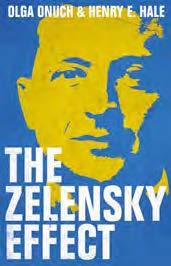


November 2022
9781787388635
216mm x 138mm
304pp
£17.99 Hardback
Current Affairs / Politics
World rights
In the series NEW PERSPECTIVES ON EASTERN EUROPE & EURASIA
Edited by Dr Ben Noble

A
compelling story of how ordinary Ukrainians saved their nation.

PAUL BRUMMELL
Gifts have been part of international relations since ancient times. They can serve as tokens of friendship, apology or authority; as taunts, bribes, boasts or tricks. They can also go wrong: Mali’s 2013 gift of a camel to French President François Hollande was reported to have ended up in a tagine.
Exploring fifty diplomatic gifts given through the ages, Brummell explains the great complexity of this political art—an exercise in brand-building for the giver, via an item that must suit the recipient’s own interests and character. Byzantine emperors sent fragments of the True Cross to fellow Christian rulers around Europe; Kings Louis XV and XVI of France used Sèvres porcelain, while the Ottoman sultans favoured robes of honour. In some cases, recipients have made no secret of the gift they would want. The Amarna Letters, dating to around 1350 BCE , record a communication from Hittite Prince Zita to the Egyptian Pharaoh, offering sixteen men—and hinting rather heavily that he would like some gold in return.
From the Trojan Horse to Cleopatra’s Needle to the Statue of Liberty, this rich history offers a new take on both the curious detail and the grand spectacle of global politics.
January 2022
9781787386457
234mm x 156mm
376pp, 50pp colour illus
£25.00 Hardback
History
World rights
A lavishly illustrated history of diplomatic gifts, from the infamous Trojan Horse to the much-loved Christmas tree at Trafalgar Square.
Paul Brummell is a British career diplomat and currently the UK Ambassador to Latvia. His previous ambassadorial postings were to Romania; Turkmenistan; and Kazakhstan and Kyrgyzstan. He has also served as the UK’s high commissioner to Barbados and the Eastern Caribbean.


April 2022
9781787387195
216mm x 138mm
408pp, 14 b&w illus
£14.99 Paperback
History / Military History
World rights excluding the French & Italian languages
‘Reminds us that even with an international convention banning them, the threat of chemical weapons being used outside conventional warfare is ever-present.’
— Nature
‘Kaszeta has a difficult theme but he avoids both jargon and the intricacies of the science … You feel part of the discussion, helped through the complexities and invited to turn back to previous pages to better understand a line of history or thinking.’ — The Scotsman
‘Dan Kaszeta weaves an extraordinary narrative from the secret history of some of the deadliest substances ever created. From the plains of north Germany to the suburbs of Damascus, he explains the development and use of nerve agents, employing his own deep knowledge, telling detail, and deadpan humour.’ — Mark Urban, author of The Skripal Files
A dark and chilling story of the invention, proliferation and use of nerve agents.
‘Brings to life this macabre and secretive subject like never before … the investigatory work demonstrated by Kaszeta is clear and second to none … [A] highly thought-provoking and entertaining read.’ — The RUSI Journal

Dan Kaszeta runs a specialist consulting firm in London. He has decades of experience protecting against chemical and biological weapons. An associate fellow at the Royal United Services Institute, he has held positions in the US Army, the White House Military Office, the US Secret Service, and private industry.
‘Captures South Korea’s triumphant postwar ascent from abject poverty and trauma.’ — The Guardian
‘A book by someone who adores South Korea and has done so since his first trip there as a student … captures the remarkable scope of recent triumphs that give South Korea both agility—as Moon’s diplomacy has shown—and the affection of a global audience.’ — Financial Times
‘An engaging account.’ — The New Statesman
‘A fluid and informative read. Highly recommended!’ — Victor Cha, author of The Impossible State, and former Director for Asian Affairs, US National Security Council
‘A well-told story of South Korea’s rise to the spotlight.’ — The Korea Herald
‘An enthusiastic and breezy book that trumpets the success of South Korea … surveys the country’s complex and fascinating story, and its rise.’ — Diplomatic Courier
‘A wonderful introduction to contemporary Korean history.’ — Sung-Hwan Kim, Chairman of the East Asia Foundation

Ramon Pacheco Pardo is Professor of International Relations at King’s College London, and KF-VUB Korea Chair at the Brussels School of Governance. He has lived twice in South Korea, and remains a regular visitor there for both work and leisure. He regularly teaches and provides media commentary about the country.
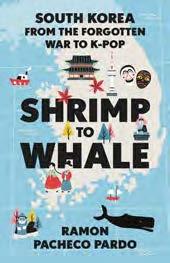


July 2023
9781805260301
198mm x 129mm
336pp, 24 colour illus
£16.99 Paperback History / East Asia World rights excluding the Italian, Korean & Portuguese languages
Charts the incredible rise of South Korea, from colonisation and civil war to today’s thriving nation. I T L r a ia K r a r i
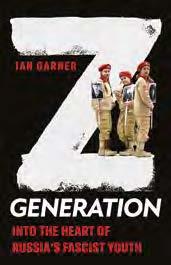


May 2023
9781787389281
234mm x 156mm
256pp
£25.00 Hardback
Current Affairs / Politics
World rights
In the series
NEW PERSPECTIVES ON EASTERN EUROPE & EURASIA
Edited by Dr Ben Noble

A revealing insight into how fascist youth movements have transformed Russian society and politics for the worse.
How did Vladimir Putin galvanise the Russian people to back his genocidal war in Ukraine and why are so many of them willing to embrace fascism? This vivid, on-the-ground narrative reveals how Russia’s fascist generation came into being—and the dark future that awaits the country if that hold cannot be broken.
Wartime Russia is drowning in fascist symbols. Zealous patriots attack journalists, opposition activists, and anyone suspected of betraying the motherland. Russians are urged to join the cause by hordes of online trolls and sleek videos of angry young men bellowing patriotic slogans. State television terrifies viewers with trumped up tales of anti-Russian conspiracies and genocidal yearnings. Child soldiers proudly parade across Red Square. This is Russia in the 2020s: a land of performative rage and nationalist untruth, where play-acting, pretence and broken promises are a way of life. But in a world where pretence has become the norm, a terrifying, apocalyptic mindset is seizing the Russians of tomorrow.
As enrapturing as it is terrifying, Z Generation reveals how Russia ended up where it is today, and where its young people are headed: a fascist generation more zealous, violent and ideological than anything the country has seen before.

Ian Garner’s research focuses on Soviet and Russian war propaganda. The author of Stalingrad Lives: Stories of Combat and Survival, he studied at the Universities of Bristol and Toronto, and at the St. Petersburg State Conservatory.
‘China’s emerging mastery of the Eurasian trade zone is described in visionary, granular detail.’
— Wall Street Journal
‘Maçães is one of our chaotic times’ most fertile brains across Asia things are on the move, in large part because of Chinese ambition, and he is right to be excited about it.’ — The Times
‘Stimulating.’ — The Economist
‘In Belt and Road, Bruno Maçães sees the reach and influence of the West diminishing over the next thirty years.’ — Financial Times
‘A masterful overview of China’s Belt and Road project … it’s a fascinating, intriguing and terrifying story, and Maçães tells it superbly.’
— The American Interest
‘A remarkably insightful and comprehensive review of China’s Belt and Road initiative, with all its implications for … the reshaping of the global order. America and Europe: take note! This is essential reading for us all.’ — Stephen Green, former chairman of HSBC, and chair of Asia House, London
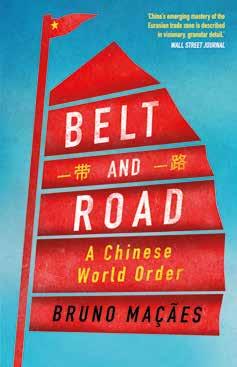
September 2020
9781787384071
198mm x 130mm
256pp
£11.99 Paperback Politics
World rights excluding South Asia
What does the biggest geopolitical project of our time tell us about China’s global ambitions?

Bruno Maçães is a nonresident senior fellow at the Hudson Institute and Portugal’s former Europe minister (2013–15). He has been a regular commentator for CNN, the BBC, Al Jazeera, the Financial Times, The Guardian and Foreign Affairs. He is the author of History Has Begun; and The Dawn of Eurasia.
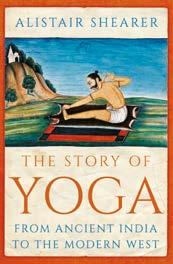
June 2022
9781787387188
216mm x 138mm
456pp, 27 colour illus
£12.99 Paperback
History / Mind, Body & Spirit
World rights excluding the Chinese & Spanish languages
‘A tale of what happens when East and West meet, and about a shift from the sacred to the secular. [Yoga’s] journey west gives Shearer a compelling cast of characters.’ — The Sunday Times
‘Erudite, scholarly and engrossing.’ — The Sunday Telegraph
‘A clear-eyed, elegantly written and wonderfully informative history of yoga … Shearer’s remarkable book is a wide-ranging and rather sobering discussion on the nature of authenticity.’ — The Spectator
‘Amid a sea of guidebooks, historian Alistair Shearer has provided a worthwhile counterpoint, [offering] advice as important as any guru’s techniques.’ — Financial Times
‘A quick-witted and erudite chronicle of the Hindu practice that is now a lucrative staple of “wellness” in the West.’ — The Wall Street Journal
The fascinating story of how an ancient Indian practice became a truly global phenomenon.
‘A fascinating survey not only for practitioners of the world’s burgeoning Wellness industry [but also] for general readers anxious about the fate of civilisation itself.’ — Asian Affairs

Alistair Shearer is a cultural historian specialising in the art and architecture of the Indian subcontinent; a former lecturer at SOAS University of London; and a teacher of meditation and the psychology of yoga. He has had a dozen books published, including a widely acclaimed translation of the Yoga Sutras.
How did humans, a species that evolved to be cooperative and egalitarian, develop societies of aggressively enforced inequality? Why did our ancestors create a world of patriarchal power, war and abuse? Did it have to be this way?
Powerful elites have always called hierarchy and violence unavoidable facts of human nature. The ‘science’ of evolution, they say, caused— and causes—men to fight, and people to have different, unequal roles, starting with men and women. But that is bad science.
In this fascinating, fun and important book, two anthropologists tell the real story of humanity, from early behaviours to contemporary cultures. From bonobo sex and prehistoric childcare to human sacrifice, Joan of Arc, Darwinism and Abu Ghraib, they reveal humankind’s evolutionary predisposition to both equality and inequality. Very old ideas of difference, invented by the earliest class societies, have hidden this truth, causing much female, queer and minority suffering. But there is hope.
Why Men? is not a book about what men and women are or do. It’s about what privileges humans claim, how they rationalise them, and how we unpick those ideas about our roots. It will change how you see the nature of injustice, violence and even yourself.


Nancy Lindisfarne is an anthropologist who previously studied and taught at SOAS University of London. Her most recent book, written with Richard Tapper, is Afghan Village Voices.
Jonathan Neale is an historian and professional writer. His most recent book is Fight the Fire: Green New Deals and Global Climate Jobs.
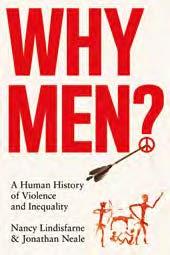

September 2023
9781805260165
234mm x 156mm
440pp
£25.00 Hardback
Cultural History / Anthropology / Sociology
World rights
Are war and inequality inevitable, because evolution made men competitive and dominant? Think again with this entertaining yet powerful new history of ‘true’ human nature.



August 2023
9781787389328
190mm x 126mm
248pp
£14.99 Paperback European Union World rights
By the same author:

The European Union’s supporters claim it is a unique expression of cosmopolitanism and rejection of racism—after all, the ‘European project’ was meant to overcome virulent nationalism. Advocates equate the far right with Euroscepticism, even as far-right ideas increasingly influence the EU itself. Yet the ‘idea of Europe’ has a long, problematic history— in the medieval era, it was synonymous with Christianity; more recently, it accompanied the emergence of ‘whiteness’ in the context of European colonialism.
Hans Kundnani offers an alternative reading of the EU as a vehicle for imperial amnesia. He reveals European integration’s origins as a colonial project, a fact conveniently overlooked in favour of the internal lessons of European history (the Holocaust and Cold War), rather than external lessons around empire. In reality, Kundnani argues, the EU is more about power than peace, eliding civic ideas of Europe with an ethnic and cultural identity.

9781849047197
£15.99 pb
Available now
A revelatory account of the EU as a project driven by racialised thinking.
After the Cold War, the EU’s eastern borders softened, but its southern ones hardened. Since the 2015 refugee crisis, notions of whiteness have become more central to European identity—a troubling new turn in Europe’s long civilisational project. It is time to confront the relationship between ideas of Europe and ideas of race.

Hans Kundnani is an associate fellow and former Europe programme director at Chatham House, and the author of Utopia or Auschwitz and The Paradox of German Power, both published by Hurst. Hans writes regularly for The Observer, The Guardian, The New Statesman and Foreign Affairs, among others.
An Economist Best Book of 2021
‘Exceptionally timely [and] clearsighted.’
— Financial Times
‘A thought-provoking reflection on how AI will change conflict.’ — The Economist
‘An engaging and accessible guide to the development of artificial intelligence as applied to war.’ — Foreign Affairs
‘An important reminder that military AI is not purely a technological feat, but also a ground for reckonings on the ethics of warfare and creative strategy. In advocating thoughtful regulation of autonomous systems, Payne offers his counterpoint to the Asimovesque robot overlords of science fiction: “War will remain something that is done by, and to, humans.”’
— International Affairs
‘A brilliant and gripping treatise on war in the age of intelligent machines.’ — Theo Farrell, Deputy Vice-Chancellor, University of Wollongong Australia
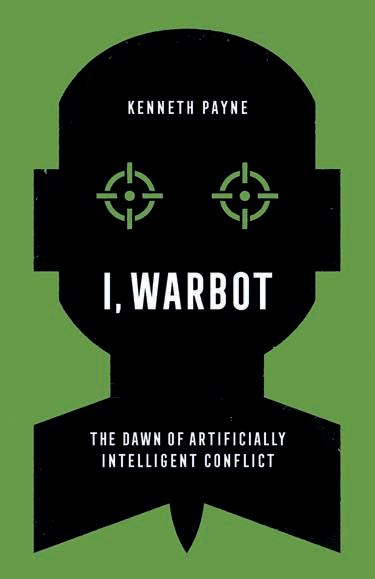

August 2022
9781787388253
198mm x 129mm
344pp
£14.99 Paperback War Studies World rights

Kenneth Payne is a reader in International Relations at King’s College London. A former BBC journalist, he is the author of many articles and books, including The Psychology of Strategy: Exploring Rationality in the Vietnam War, also published by Hurst.
A historically grounded account, from de Gaulle onwards, of how France’s neocolonial influence crumbled in Africa, with devastating and unforeseen consequences.


July 2024
9781911723653
190mm x 126mm
264pp
£18.99 Hardback History / Colonialism World rights
A historically grounded account, from de Gaulle onwards, of how France’s neocolonial influence crumbled in Africa, with devastating and unforeseen consequences.
France is the only country that never decolonised its colonies, emotionally, financially or strategically. In the aftermath of losing the Second World War, notwithstanding de Gaulle’s attempts to convince his people otherwise, the French knew the game was up. (The Resistance fighters were heroes; but heroes are lonely.) For France, after 1945, the Second World War blended into the early Cold War, which Paris jumped into the day before it began. It fought in Indochina, and lost again. The independence war dragged on in Algeria. Then France lost there, too—painfully, with millions of its ordinary citizens expelled to a homeland that many of them hardly knew.
But Sub-Saharan Africa was still there. France produced a postcolonial antidote: Françafrique, France’s sphere of influence (or ‘backyard’) over its former West and Central African colonies. France loved Africa. Some Frenchmen died for Françafrique; others made millions from it.
The entire toxic edifice is now crumbling away. Young Africans are happy about this—but not so many of their parents, who often live in France. In his inimitable style, Gérard Prunier recounts a tragic transcultural saga, with one leg in the past and one in the future: the end of Françafrique.
Gérard Prunier is a renowned historian of contemporary Africa, author of, inter alia, the acclaimed The Rwanda Crisis: History of a Genocide and of The Country That Does Not Exist: A History of Somaliland, both published by Hurst.
Myanmar’s generals didn’t expect the nation to rise up against the coup they staged in February 2021. But after decades of stifling, direct military rule, the Burmese people had become used to another way of life during the relative openness of 2011–21. The army has been unable to suppress anti-coup protests as it did in 1962 and 1988; and, three years after sending tanks into Yangon, Naypyitaw and other cities, the army has yet to establish a functioning administration.
For the first time since the 1970s, armed resistance is not confined to traditionally strife-torn frontier areas, where ethnic insurgents like the Karen National Union and Kachin Independence Army have been active for decades—it has spread to the majority-Burmese heartland, in the shape of the People’s Defence Forces. But the anti-junta forces are insufficiently well-equipped to defeat the much more heavily armed Myanmar army, which itself is stretched too thin, on several fronts, to crush the resistance. And, despite foreign observers’ assurances, there is no unity, common command or synchronised strategy among the various ethnicminority and ethnic-Burmese resistance groups.
This is a war that neither side can win. Caught in the middle, and bound to suffer most, are civilians.


September 2024
9781911723684
216mm x 138mm
280pp
£25.00 Paperback East Asian Studies World rights
Bertil Lintner is an acclaimed journalist and expert on contemporary South-East Asia, especially Myanmar. Formerly the Far Eastern Economic Review’s Burma correspondent, and Asia correspondent for the Swedish daily Svenska Dagbladet, he is the author of, among others, The Costliest Pearl: China’s Struggle for India’s Ocean (also published by Hurst).
A world-leading expert on Myanmar assesses the ongoing popular uprising against the military junta that deposed Aung San Suu Kyi.
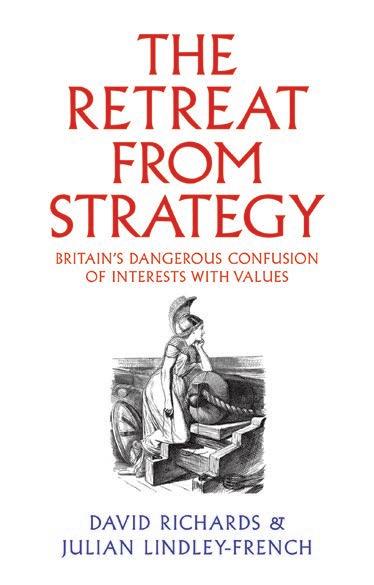

November 2024
9781911723677
216mm x 138mm
336pp
£25.00 Hardback War Studies / Politics World rights
DAVID RICHARDS & JULIAN LINDLEY-FRENCH
Britain is sleepwalking to disaster, because London has abandoned all forms of proper strategy. That is the sobering message of this powerful analysis exposing the great failings of British security and defence policy.
Britain long ago abandoned the art and science of grand strategy, even though this is crucial for establishing the country’s direction of travel. Without grand strategy, national strategy has been reduced to little more than a political game of how much threat Britain can afford, and who gets what from an ever-shrinking resource pot. However, it is Britain’s defence policy where the contradictions and self-delusion of abandoned strategy are most apparent, and which explains why the balance between ends, ways and means— as sound strategy would demand—has become not just elusive, but nigh on impossible.
A
frank assessment of what kind of strategic power
Britain aspires to be, given its dwindling armed forces and growing threats from Russia and other actors.
This essential, incisive book offers Britain a pathway back to strategic realism, by ending the profound confusion of interests with values that has done so much damage to Britain and its vital place in the world of the twenty-first century.
General David Richards (Baron Richards of Herstmonceux) commanded British troops in East Timor, Sierra Leone and Afghanistan, then served as Chief of the Defence Staff and a National Security Council member. Professor Julian Lindley-French is Chairman of The Alphen Group, and author of Future War and the Defence of Europe.
Kingdom of Football explores how and why Saudi Arabia burst onto the landscape of world football in 2023, and examines what the speed and scale of Saudi engagement—as investor, owner, sponsor, host and competitor—might mean for the Kingdom and for football.
Writing as both a football fan and a Gulf specialist, Kristian Coates Ulrichsen offers historical and comparative contexts for Saudi Arabia’s startling emergence as a world football hub in the 2020s, exploring both previous Saudi investment in the game, in the 1970s, and national attempts elsewhere to kickstart the sport, as in the United States, Japan and China.
Going beyond popular media labels such as ‘sportswashing’, this fascinating book examines what drives Saudi policymaking, connecting the move into football with domestic economic and social developments, as well as external and foreign policy considerations. It also examines how Riyadh’s foray into world football both builds upon and yet differs from the approaches taken by other Gulf States, such as Qatar and the United Arab Emirates. Finally, Coates Ulrichsen assesses the sustainability and durability of the Kingdom’s engagement with the sport in the decade-long countdown to the 2034 FIFA World Cup, which Saudi Arabia is set to host.
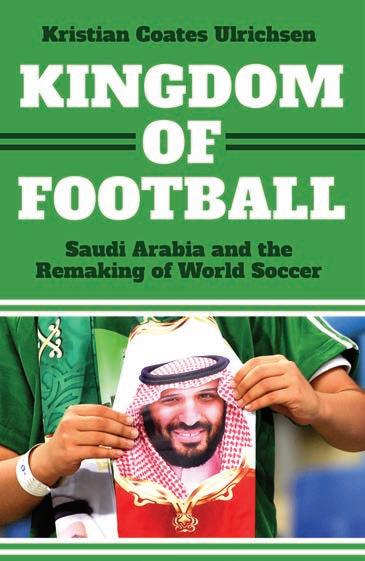

December 2024
9781911723660
216mm x 138mm
264pp
£20.00 Hardback
Middle East Studies / Sport World rights
Kristian Coates Ulrichsen is Fellow for the Middle East at Rice University’s Baker Institute for Public Policy, and an associate fellow of Chatham House’s Middle East and North Africa Programme. His books with Hurst include Insecure Gulf and Centers of Power in the Arab Gulf States. He supports West Ham.
A fascinating account of how Saudi Arabia leveraged its massive oil wealth to alter the balance of power in world football.
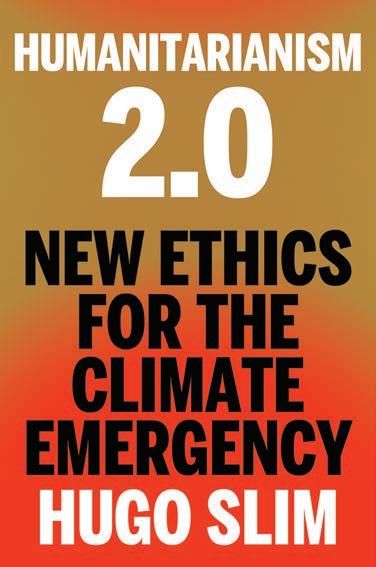

October 2024
9781911723707
190mm x 126mm 288pp
£18.99 Hardback Ethics / Development Studies / Environment World rights
HUGO SLIM
This book spells out a new framework for humanitarian aid in the long emergency of climate change. Looking ahead to the massive needs of the late 2020s and the 2030s, Hugo Slim shows how current ethics and action in the sector are necessary, but not sufficient, for the new moral and operational challenges of our planetary crisis.
Humanitarianism 2.0 offers a series of practical ethical pathways for aid workers and organisations to reimagine and redesign their purpose in the increasing number of climate-related disasters around the world. Slim expands the fundamental principle of humanity to include the protection of nature in humanitarian ethics, and also faces up to the hard challenge of impartiality and prioritisation in a universal emergency. He then recognises anticipation, adaptation, mitigation and locally led aid as humanitarian obligations in climate-related disasters.
Like everything else in the climate and nature crisis, humanitarian ethics need adaptation. Slim’s bold, smart and much-needed proposals show the way.
A radical call for aid workers to rethink their practical roles and guiding principles, as people around the world face environmental catastrophe.
Hugo Slim is a senior research fellow at the Las Casas Institute for Social Justice at Blackfriars Hall, University of Oxford, and at the Oxford Institute for Ethics, Law and Armed Conflict at the Blavatnik School of Government.
Imagining a better future is at the heart of development. But mainstream development models are driven by a very narrow, Westerncentric set of ideas about what it means to be human. What could be possible if we let ourselves imagine differently?
As our world continues to evolve at breakneck speed and faces unprecedented crises—from the decaying environment to cascading inequality— the need for bold new directions for development has never been greater. Peter Sutoris and Uma Pradhan put a spotlight on the thoughtprovoking visions of leading theorists, activists and practitioners for rethinking development as a political project towards more equitable futures. Questioning top-down economic frameworks, they explore transformative ideas—from degrowth to indigenous knowledge—that may enable us to address the complexities of our rapidly changing global landscape. They consider how the world can chart a path towards reconciling the moral case for eradicating poverty with these critical perspectives to advance a more ethical approach, one that is sensitive to history, diversity, and the challenges and opportunities of this moment.
If development is to remain relevant today, it must reinvent itself—and finally listen to voices on the ground.


January 2025
9781911723134
216mm x 138mm
264pp
£25.00 Hardback Development / Sociology World rights
Peter Sutoris is Lecturer in Climate and Development at the University of Leeds, and the author of Visions of Development and Educating for the Anthropocene. Uma Pradhan is Lecturer in Education and International Development at University College London, and the author of Simultaneous Identities: Language, Education and the Nepali Nation.
Can development remake itself for today’s world?
To do so, it must shed its colonial baggage, embrace diverse voices and prioritise genuine sustainability.
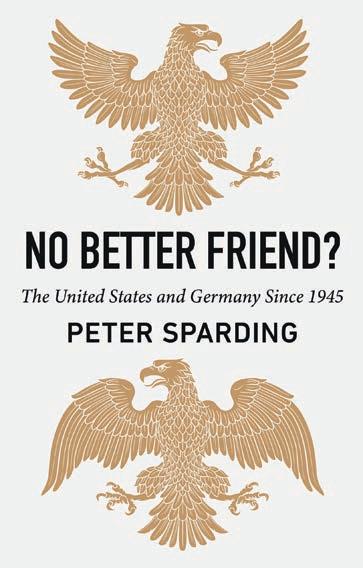

October 2024
9781911723714
216mm x 138mm
256pp
£45.00 Hardback
History / International Relations / Geopolitics World rights
The German-American relationship is the decisive transatlantic dynamic of our time. Long seen as one of the most stable connections between Europe and America thanks to its well-defined Cold War structure and hierarchy, relations between Washington and Berlin have become much more volatile in the twenty-first century— and are playing an increasingly pivotal role in determining the degree to which Europe and the United States will be able to shape a rapidly changing world order.
Stabilising this uniquely complicated relationship will be no easy feat. At times more closely aligned politically, and more intertwined economically, than any other transatlantic pair, since the end of the Cold War these republics have seen their relations characterised by frequent diplomatic, cultural and philosophical clashes and misunderstandings, and a trail of disappointed expectations.
An incisive study of one of the world’s most important, and rapidly complexifying, international partnerships.
Peter Sparding examines the long history between the two countries and their peoples; the narratives and perceptions harboured by each nation concerning the other; and the evolution of diplomatic, economic and security ties. Appraising the complicated interplay between Germany and the United States vis-à-vis a rising China, and the domestic challenges facing both countries, his book offers an outlook on how this all-important relationship might function going forward.
Peter Sparding has written about and analysed U.S.–Germany relations and transatlantic economic and foreign policy ties for two decades. He has been a fellow with the German Marshall Fund of the United States and has lived, worked and studied in Washington D.C., Berlin, Copenhagen and Kansas City.
When President George H.W. Bush and General Secretary Mikhail Gorbachev convened in Malta in December 1989, superpower contestation gave way to a new era of US unipolarity. In Africa, the Cold War had already ended. The Soviet Union had abandoned its Marxist-Leninist client states, and Cuban forces were leaving Angola. Yet, just five years later, Washington’s hegemonic aspirations in Africa seemed quixotic at best and delusional at worst.
US military defeat in Somalia and the 1994 Rwandan Genocide both highlighted the absence of American grand strategy. Over the next quarter-century, the US ceded its economic primacy in Africa to China and was relegated to a spectator role in key security crises. Could the US have forestalled the continent’s embrace of multipolarity through consistent engagement and a firm break from Cold War thinking? And is the crumbling of US power there reversible?
Rudderless Superpower addresses these questions through a meticulous chronological examination of US policy in Africa since the 1990s. In a break from traditional accounts revolving around crisis moments and leadership at the White House, Ramani contends that the perpetuation of Cold War–era mistakes and diplomatic failures placed US influence in Africa on a path of inexorable decline.
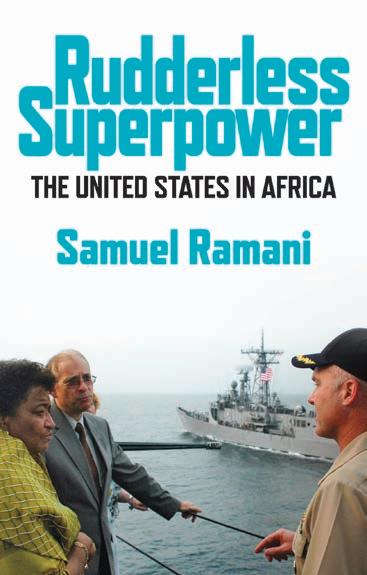

November 2024
9781911723721
216mm x 138mm
320pp
£37.50 Hardback
International Relations / Africa / Geopolitics
World rights
Samuel Ramani is Associate Fellow at London’s Royal United Services Institute. The author of Putin’s War on Ukraine and Russia in Africa (both published by Hurst), Samuel regularly advises the US and UK governments on security issues relating to Africa, and contributes to Foreign Policy, CNN and the BBC.
An authoritative appraisal of US policy in Africa since the end of the Cold War, highlighting illfated interventions and a damaging withdrawal from strategic vision.


August 2024
9781911723738
216mm x 138mm 368pp
£35.00 Hardback
International Relations / Russia / Middle East World rights
In the series
NEW PERSPECTIVES ON EASTERN EUROPE & EURASIA
Edited by Dr Ben Noble


Charts the evolution of the Russia–Iran relationship in the twenty-first century, from tenuous alignment to robust partnership.
Vladimir Putin’s full-scale invasion of Ukraine in 2022 has cast a spotlight on Russia’s newly sturdy partnership with Iran. Moscow looked to Tehran for drones and ammunition to fuel its so-called ‘special military operation’, and Iran’s support for Russia’s war reflects a decade-long strengthening of Russo-Iranian ties, beginning with the 2011 outbreak of the Syrian Civil War.
Despite a relationship historically marred by mistrust and unmet expectations, the two regimes have worked together to promote their common interests in Syria, where battlefield coordination soon developed into much deeper political alignment. Drawing on extensive Russian and Persian primary sources, and interviews with elites from both countries, Nicole Grajewski uncovers the drivers of ever-closer cooperation between the Kremlin and the Islamic Republic. Detailing the internal structures, shared anxieties and broader ambitions underpinning this alignment, she explores the genesis of Russia and Iran’s mutual antagonism towards the Western-led global order; the impact of deep-seated leadership concerns over regime security and domestic protests; and the future trajectory of the partnership within the larger world order.
Examining both military dynamics and economic endeavours, as well as elaborate sanctions evasion schemes and collaboration within international organisations, this is the definitive account of contemporary Russia–Iran relations.
Nicole Grajewski is Fellow in the Nuclear Policy Program at the Carnegie Endowment for International Peace, and Associate Researcher with the Belfer Center’s Project on Managing the Atom, Harvard Kennedy School of Government. She received her PhD and MPhil from the University of Oxford. She speaks Russian, Persian and French.
The future of Europe as a community of democratic states is deeply uncertain. The European Union, founded to promote ‘ever closer’ integration, aims nominally for peaceful, prosperous cooperation. But this ideal has been battered by a series of bruising crises, and now by war.
Protecting Democracy in Europe examines how, in this brave new world, the EU can and must safeguard democratic governance within its member states. Reviewing the Union’s past responses, Tom Theuns demonstrates that its existing laws and policies are normatively and expressively incoherent. Its failure to defend democratic values is unsurprising: the EU’s existing toolbox is based on an impoverished conception of democracy, and runs counter to its fundamental principles. Close attention to speeches by European Commissioners shows that they see democracy in a technical and legalistic way. This perspective— ‘democracy without politics’—is easy for wouldbe autocrats to exploit.
To protect democracy in Europe, Theuns argues, the EU must urgently correct policies that make it complicit in democratic backsliding. It must contain autocratic influences (within the strict limits of its political authority). And it must cultivate pluralist democracy within its constituent countries. But where this fails, he concludes, autocratic members should be expelled.
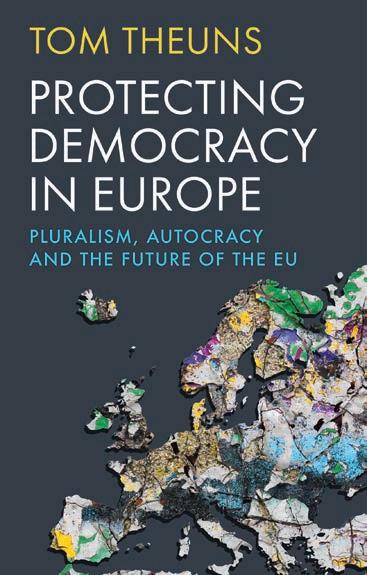

November 2024
9781911723745
216mm x 138mm
336pp
£25.00 Hardback
Politics / Europe
World rights
Tom Theuns is Senior Assistant Professor of Political Theory and European Politics at Leiden University’s Institute of Political Science, and Associate Researcher at Sciences Po in Paris. He has published widely, including in American Political Science Review, the Journal of Common Market Studies and the Journal of European Integration.
Why has the European Union failed to combat rising authoritarianism within its own ranks? And how can it defend democratic governance inside member countries?
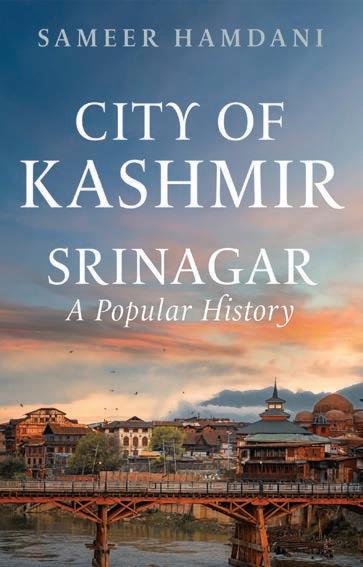

October 2024
9781911723769
216mm x 138mm
288pp
£30.00 Hardback History
World rights excluding South Asia
City of Kashmir offers readers a journey into the 2,000-year history of Srinagar, exploring its written history, legends and oral traditions to take a living pulse. In exploring the city’s geography, it maps the daily rituals of life and the accompanying material culture, as well as the crafts for which Srinagar is justly famed worldwide. Based on twenty years’ research in Srinagar as a heritage consultant, Sameer Hamdani’s narrative is shaped and populated by glimpses of the historical built environment and other rich personal reflections, as well as selected translations of Sanskrit, Persian and Kashmiri poetry from the medieval and early modern periods.
Hamdani provides a detailed overview of the origin and development of Srinagar on a scale never previously attempted, covering the entirety of the pre-Muslim and Muslim eras in medieval Kashmir, with a focus on the cultural life of the city. Richly illustrated with drawings, sketches and other images, this inviting book will be a timely addition to our expanding knowledge of regional cultures across South Asia, especially as witnessed through their material production and legacies.
A
vibrant tapestry of Srinagar’s rich historical and cultural heritage.
Sameer Hamdani is an architectural historian and conservation specialist for the Aga Khan Foundation, Srinagar. His previous books include Shi’ism in Kashmir: A History of Sunni–Shia Rivalry and Reconciliation and The Syncretic Traditions of Islamic Religious Architecture of Kashmir.
In a struggle between David and Goliath, the giant is always predicted to win. But the Biblical story’s power comes from the reverse outcome: the smaller man triumphs. Over the past fifty years, the same has been true in business.
Large companies, with their existing customers, weighty war chests, powerful R&D programmes and formidable acquisitions teams, have been expected to develop original ideas—or buy them from competitors. Instead, start-ups, funded by venture capital, have unsettled the incumbents and transformed the world. From Tesla in cars to SpaceX in rockets; from TikTok in social media to Google in search engines; and from Amazon in retail to Uber in transportation, almost all of the innovative products and services now dominating our lives came from entrepreneurs with bold ideas, allied with investors who believed in them.
The last half-century may have been an adversarial battle between David and Goliath, but the next will be increasingly about their partnership. The Innovation Paradox reveals that the winners in the global economy—whether states, companies or individuals—will be those who can navigate the liminal space between the corporation, with its power for incremental change, and the capitalinfused start-up, able to disrupt the status quo.


October 2024
9781911723813
216mm x 138mm
264pp
£35.00 Hardback
Business
World rights
Dominique Mégret is Head of Swisscom Ventures and a board member of Ecorobotix, having spent over a decade as a venture capitalist. He is the author of Deeptech Nation James Mawson was editor of Private Equity News, before launching Global Corporate Venturing in 2010 and Global University Venturing in 2012.
Explains how, against the odds, pioneering start-ups have taken on established firms and revolutionised global commerce—with huge implications for the future of business.
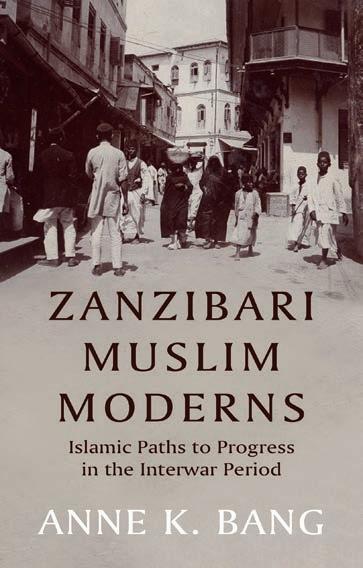

September 2024
9781911723820
216mm x 138mm
256pp
£45.00 Hardback
Islamic Studies / Africa World rights
ANNE K. BANG
Zanzibari Muslim Moderns is a historical study of Zanzibar during the interwar years. This was a period marked by rapid intellectual and social change in the Muslim world, when ideas of Islamic progress and development were hotly debated. How did this process play out in Zanzibar?
Reveals how a generation of Muslim scholars, intellectuals and civil servants adapted and adopted ideas of modernity in colonial interwar Zanzibar.
Based on a wide range of sources—Islamic and colonial, private and public—Anne K. Bang examines how these concepts were received and promoted on the island, arguing that a new ideal emerged in its intellectual arena: the Muslim modern. Tracing the influences that shaped the outlook of this new figure, Bang draws lines to Islamic modernists in the Middle East, to local Sufi teachings, and to the recently founded state of Saudi Arabia. She presents the activities of the Muslim modern in the colonial employment system, as a contributor to international debates, as an activist in the community, and more. She also explores the formation of numerous faithbased associations during this period, as well as the views of the Muslim modern on everything from funerary practices and Mawlid celebrations to reading habits. A recurring theme throughout is the question with which many Muslim moderns were confronted: who should implement development? And for whom?
Anne K. Bang is Professor of African Islamic History at the University of Bergen. She has published widely on Islamic intellectual exchanges in the Indian Ocean, and particularly on East Africa. She has also led several projects to bring the scriptural sources of this history to wider attention.
Drawing on her experience as a United Nations mediator and a senior American diplomat, Stephanie Williams provides a first-hand examination of post-Qaddafi Libya. Using concrete examples from her experience in the country, Williams analyses the underlying drivers of the Libyan conflict, as well as the motivations of the international actors and the various Libyan protagonists. She bears witness to the horrific effect of General Haftar’s attack on Tripoli in 2019, how it tore apart a UN peace process, and how she worked alongside UN envoy Ghassan Salamé to reassemble some semblance of an international consensus under the Berlin Process and accompanying intra-Libyan tracks: military, economic and political.
Williams recounts her leadership of the UN mediation during the Covid pandemic, adopting new technologies and blending hybrid and physical meetings to produce the October 2020 ceasefire agreement, as well as progress on the economic track and an inclusive political agreement. She also lays out the pernicious effect of new media on peacemaking, and how disinformation and hate speech have exacerbated Libya’s fragmentation. Finally, Williams offers ideas on how to break Libya’s cycle of division and dysfunction to meet the longstanding aspirations of the people to live in peace and dignity.


January 2025
9781911723806
216mm x 138mm
320pp
£45.00 Hardback Development / Peace & Conflict Studies World rights
Stephanie Williams is an experienced international mediator serving with the UN in Libya, where she produced a nation-wide ceasefire agreement and a political agreement, using hybrid technologies to build a more inclusive process. A former US diplomat, Williams has an extensive background in the Middle East and North Africa region.
An inside account of conflict, collapse and innovative approaches to reconstruction in Libya’s challenging post-2011 landscape.


September 2024
9781911723837
216mm x 138mm
384pp
£45.00 Hardback
Islamic Studies
World rights
A new history of modern Turkey, focussing on its fifty-year retreat from Kemalist secularism.
DAVID S. TONGE
This is the first account in English of how Islamic religious orders dating back to Ottoman times have risen to dominate and define the future of Turkey, Europe’s awkward neighbour and the major power in the Eastern Mediterranean.
Given its determined programme of secularising the people both under and after the Attatürk regime, Turkey is often projected as a model for the compatibility of Islam with parliamentary democracy. In this absorbing book, journalist and writer David S. Tonge reveals the limitations of that secularisation, and its progressive reversal, in what continues to be a profoundly religious country. He describes how Muslim Turks’ religious identity has been taken over by branches of one of Islam’s great religious orders, the Naqshbandis, whose profoundly anti-Western ethos was honed by British and French colonial incursions into the heartland of their faith.
Tonge’s history offers a salutary alternative to the wishful narrative developed by Western chancelleries during the Cold War, one which viewed Turkey as a westernising democracy. The revival of both Turkish nationalism and Islam helped President Erdoğ an’s rise to power, and will shape the regime that succeeds him—illuminating and understanding Turkey’s realities of faith and religious politics has never been more important.
David S. Tonge has lived half of his life in Turkey. A scholar of Magdalene College, University of Cambridge, he reported from Ankara and Athens for the BBC, Guardian and Observer, then from London as the Financial Times’ diplomatic correspondent. The author of The Kremlin’s Confidant, he grows citrus and olives.
NEW EDITION
‘Dazzling prose … arresting, essential, devastating.’
— The Spectator
‘A timely intervention at a dangerous moment … both the times and the subject demand anger, argument and urgency. Malevolent Republic supplies all three and is all the better for it.’
— The Observer
‘Written with passion and savagery, this is a polemical and highly readable short history of modern India from Indira Gandhi to Narendra Modi.’ — Gideon Rachman, Financial Times
‘Eloquent on the subject of religious tolerance, communal harmony and human decency, all of which appear to be in harrowingly short supply among the acolytes who surround Modi.’
— The Times
‘Precise and sharp … takes readers on a terrifying and yet illuminating journey through the rapidly transforming political, social and religious landscape of Modi’s India.’ — The Times Literary Supplement
‘One of the most thoughtful and thorough journalists writing today … a rare voice … comment[ing] on global affairs from a truly comparative perspective.’ — Amitav Ghosh

K. S. Komireddi, an essayist, international journalist and public speaker, has contributed to the BBC, CNN, The New York Times, The Guardian, The Washington Post, the Daily Mail, The Economist, The Spectator and Foreign Policy, among others. This is his first book.


March 2024
9781911723288
216mm x 138mm
296pp
£14.99 Paperback
Politics / South Asian Studies
World rights excluding South Asia
After decades of imperfect secularism under an often corrupt establishment, Nehru’s diverse republic has yielded to Hindu nationalism, collapsing under the weight of its contradictions.


August 2024
9781911723882
216mm x 138mm
448pp, 88 colour illus
£15.99 Paperback
Middle East Studies / Memoir World rights
NEW EDITION
As featured in The Guardian Long Read
‘Celebrates the power of resilience and endurance.’
— The Times Literary Supplement
‘A tour de force … beautifully written … this book eloquently conveys the urgency of transforming the toxic status quo into conditions that allow everyone to thrive as equals.’ — The Palestine Chronicle
‘A vivid portrait of life for Palestinians in Israel in the 1950s and 1960s.’ — Middle East Eye
‘A gripping account of one family’s decades-long personal and political struggle to return to their true homeland.’ — New Internationalist
‘At times reads like a thriller … a unique [story] which [Jiryis] negotiates with intelligence and eloquence … illuminating profound and painful subjects about home and belonging.’ — Raja Shehadeh
A moving exploration of belonging in a contested homeland, from a Palestinian writer and citizen of Israel.

Fida Jiryis is a Palestinian writer and editor who has written on life as a Palestinian in Israel and the West Bank. She contributed to Kingdom of Olives and Ash, a Washington Post bestseller on fifty years of Israeli occupation, and Amputated Tongue, a Hebrew-language anthology of Palestinian literature.
Russia’s Campaign for Global Counter-Revolution
‘[Ramani’s] encyclopedic descriptions … yield interesting details and … solid tactical analysis.’
— The New York Times
‘Looks behind the headlines to determine the motivations for the invasion and the likely path forward. Ramani is convincing in his view that the war marks a seismic shift in the geopolitical landscape. Clear-minded and authoritative, this book is a thorough analysis of how Putin’s gambit fits into the big picture.’ — Kirkus Reviews
‘An important, well-referenced book that covers the details and impact of the Russian invasion of Ukraine in 2022.’ — CHOICE
‘Unpicks Putin’s concocted rationales for invading Ukraine … [and] dissects Russia’s strategic military failings.’ — Labour Hub
‘An open-ended chronicle of a very short, but significant, phase in the Russian-Ukrainian confrontation.’ — The Russian Review
‘Explains clearly the vital importance of [this] war for the future of Russia itself.’ — Keir Giles, Director, Conflict Studies Research Centre
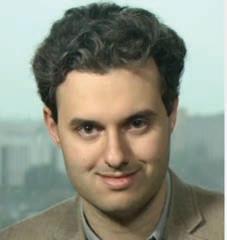
Samuel Ramani is Associate Fellow at London’s Royal United Services Institute. The author of Russia in Africa and Rudderless Superpower (both published by Hurst), Samuel regularly advises the US and UK governments on international security issues, and contributes to Foreign Policy, CNN and the BBC.


October 2024
9781805260158
198mm x 129mm
624pp
£17.99 Paperback
War Studies / International Relations World rights
Why did Putin invade Ukraine?